Team news
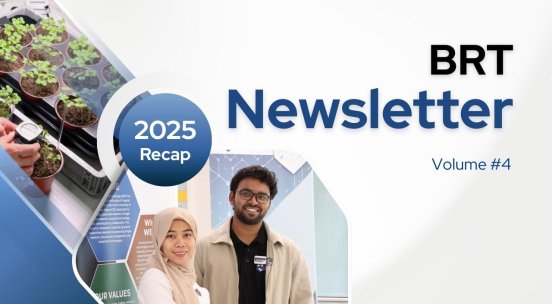
Looking Back on 2025: BRT Newsletter
With 2025 now behind us, the BioResources & Technology (BRT) Division reflects on a year defined by collaboration, innovation, and global engagement. From new research outputs and international projects to academic milestones and community-building events, 2025 marked a period of steady progress across BRT’s research, education, and outreach activities.
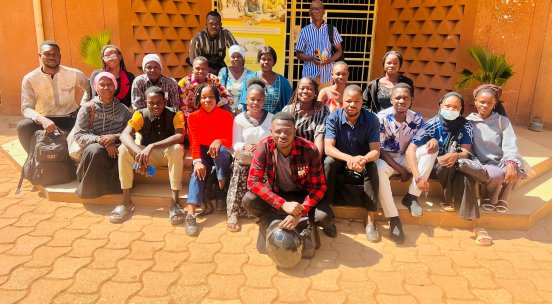
BRT Strengthening Circular Economy Education in West Africa
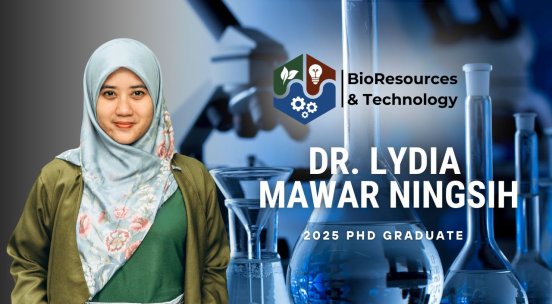
Introducing 2025 PhD graduate, Dr. Lydia Mawar Ningsih

AgriSci-UA Summer School 2025: Learning, Collaboration, and Connection at CZU
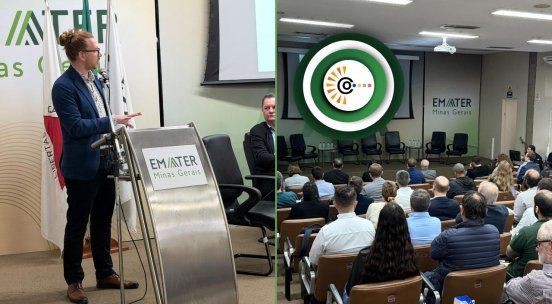
BRT at the COMUNIDAD Final Event in Brazil
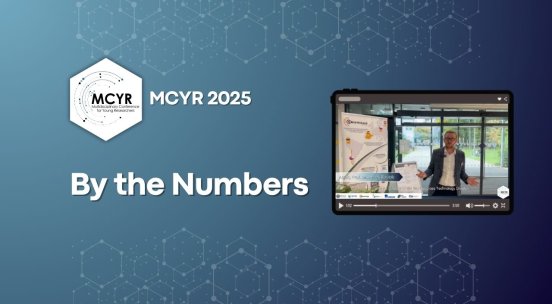
MCYR 2025 - By the Numbers
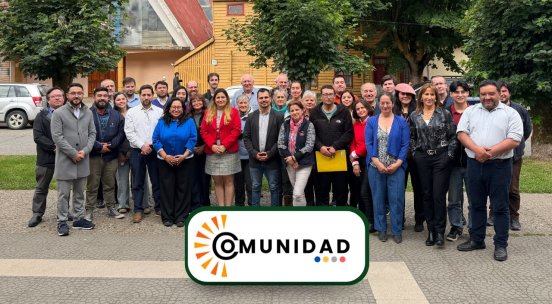
Strengthening Regional Impact: BRT at the COMUNIDAD Workshops in Chile and Colombia

On the Ground in Laos: BRT Launches Baseline Study on Single-Use Plastics

Building Trust in Healthcare: MCYR 2025 OSIRIS Winning Story
In the category OSIRIS: Open Science and Research Integrity, Richard Marfo from the Department of Information Engineering, Faculty of Economics and Management, CZU was recognised for his exceptional submission, “Building Trust in Healthcare: How Expert Systems Can Save Lives.” His story compellingly highlights how transparency, reproducibility, and responsible data use in healthcare technologies can enhance trust, improve decision-making, and ultimately save lives. The winning narrative brings the OSIRIS mission to life by illustrating why open science and research integrity are foundational to modern scientific practice.

New Paper Published! Biocontrol, plant growth-promoting, and bioremediation potential of Aeromonas veronii CMF from the gut of Chrysomya megacephala

Exploring Land Use Change Through Remote Sensing: MCYR 2025 COMUNIDAD Winning Story
In the category COMUNIDAD: Geospatial Intelligence for Community Resilience, Anxhela Hameti from the Department of Agroecology and Crop Production, Faculty of Agrobiology, Food and Natural Resources, CZU was recognised for her outstanding submission, “Exploring Land Use Changes in Albanian Coastal Wetlands Through Remote Sensing.” Her story masterfully demonstrates how satellite data, remote sensing, and spatial analysis can reveal environmental transformations and guide community-level decision-making. The winning narrative brings the COMUNIDAD mission to life by illustrating the power of geospatial intelligence to support resilience in landscapes facing mounting climate and ecological pressures.
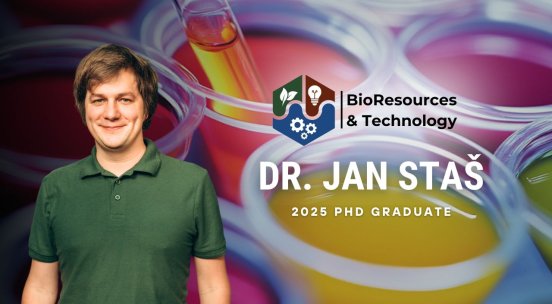
Introducing 2025 PhD graduate, Dr. Jan Staš
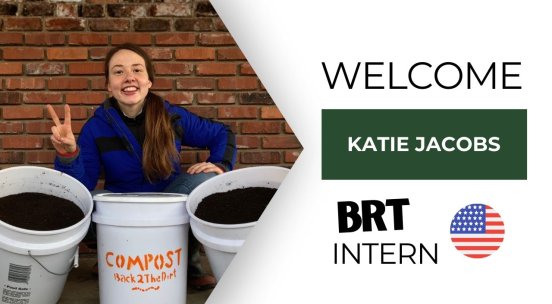
Meet our new intern - Katie Jacobs
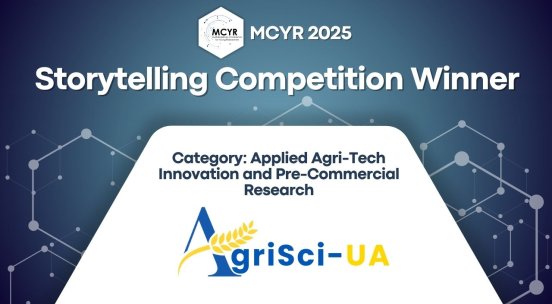
Growing Olives in a Glass Jar: MCYR 2025 AgriSci-UA Winning Story
In the category AgriSci-UA: Applied Agri-Tech Innovation and Pre-Commercial Research, Pavla Přinosilová from the Institute of Genetics and Plant Breeding in Lednice, Faculty of Horticulture, Mendel University in Brno was recognised for her engaging submission, “Growing olives in a glass jar – heroism or madness?” Her story offers a creative, reflective look into early-stage agri-tech experimentation and the curiosity-driven research that fuels agricultural innovation. The winning narrative captures the essence of AgriSci-UA by highlighting how hands-on trials, unconventional thinking, and scientific exploration can shape the future of sustainable food production.

Happy Holidays from the BioResources and Technology Division (BRT)!
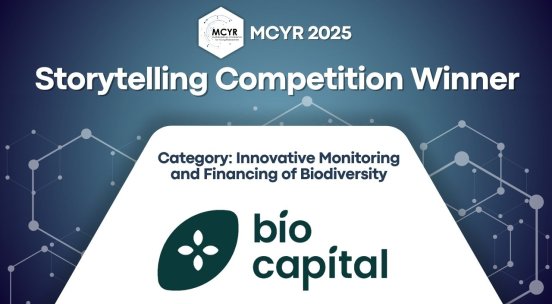
Frozen for the Future: MCYR 2025 BIO-CAPITAL Winning Story
In the category BIO-CAPITAL: Innovative Monitoring and Financing of Biodiversity, Olha Kruhliak from the Institute of Animal Breeding and Genetics nd. a. M.V.Zubets of National Academy of Agrarian Science of Ukraine was recognised for her exceptional submission, “Frozen for the Future: A Family’s Story of Saving Ukraine’s Animal Heritage.” Her moving narrative blends personal history with scientific innovation, showcasing how biobanking, monitoring tools, and novel conservation approaches can safeguard biodiversity for generations to come. The winning story embodies the spirit of BIO-CAPITAL by revealing how technological and financial innovations can protect ecosystems and preserve irreplaceable genetic heritage.
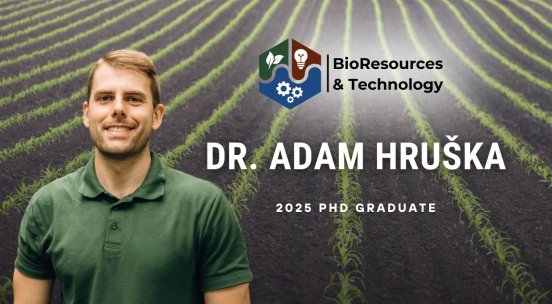
Introducing 2025 PhD graduate, Dr. Adam Hruška
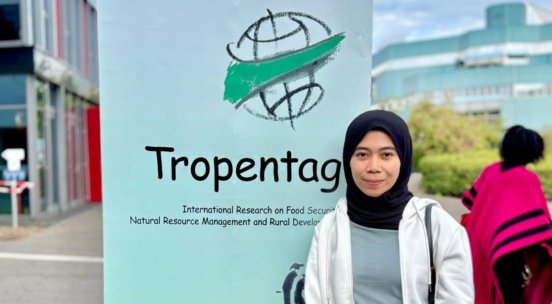
Connecting Research and Real Impact: A BRT Perspective from Tropentag 2025
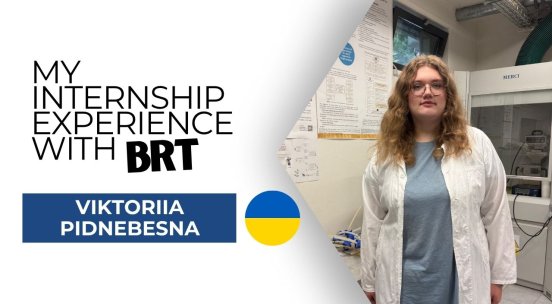
Visiting Internship Insights – Viktoriia Pidnebesna
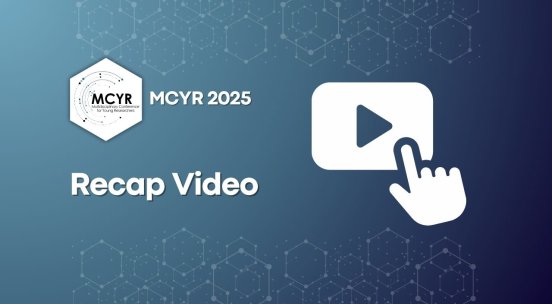
Relive the Moments: MCYR 2025 Recap Video

Introducing BRT’s new Postdoctoral Researcher - Sandipan Banerjee
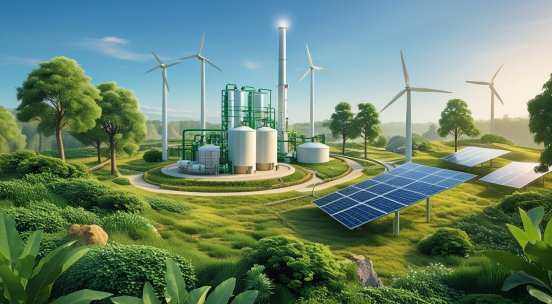
The Circular Bioeconomy Is Transforming the Way We Think About Waste
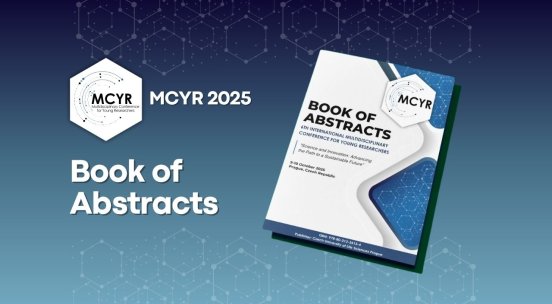
MCYR 2025 Book of Abstracts Now Available Online
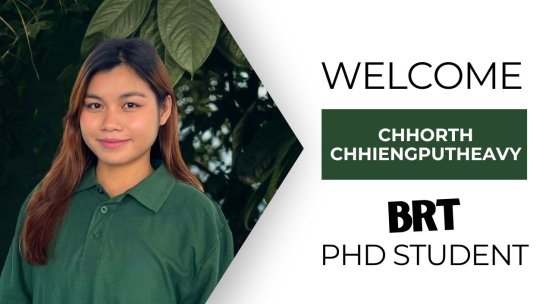
Introducing BRT’s new PhD student - Chhorth Chhiengputheavy
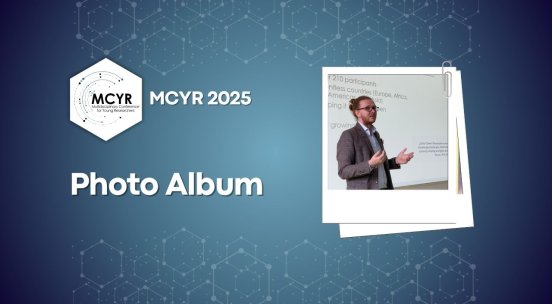
Out Now: MCYR 2025 Photo Album
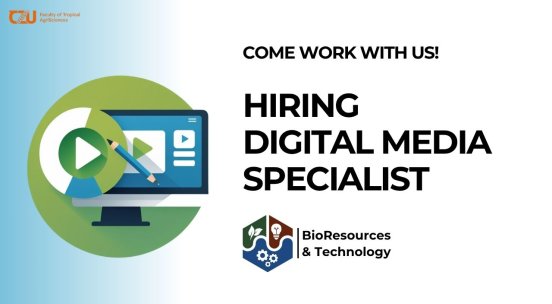
Join the BRT - Hiring Digital Media Specialist
We are seeking a creative and detail-oriented Digital Media Specialist with strong writing, video editing and visual design skills to support the communication activities of the BRT team and its international projects. This role is ideal for someone who enjoys transforming scientific and sustainability topics into engaging, visually appealing content, including short videos and reels, graphics, event materials, and online updates.
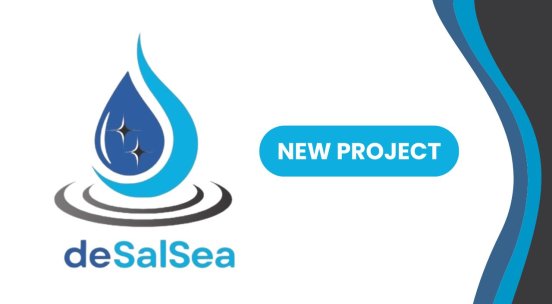
deSalSea Project Kicks Off: Novel Sustainable Forward-Osmosis Seawater Desalination Process
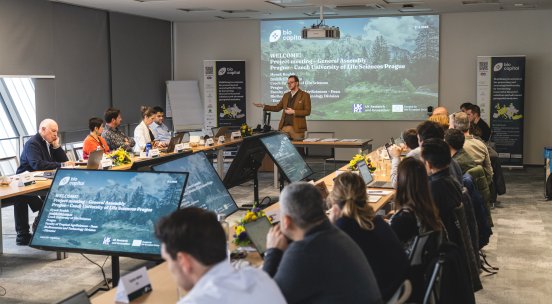
When Biodiversity Meets Finance: Hynek Roubík on Building a Business Model for Nature
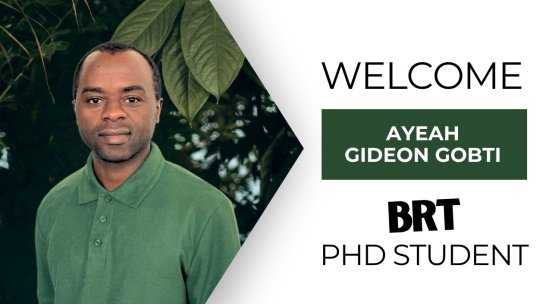
Introducing BRT’s new PhD student - Ayeah Gideon Gobti
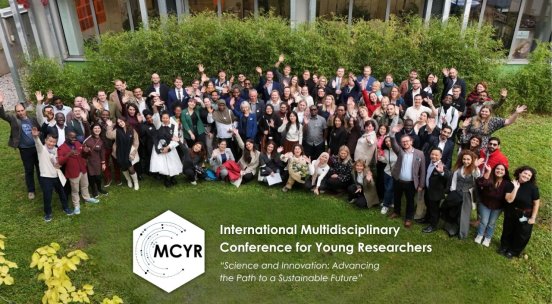
MCYR 2025: Empowering Early-Career Researchers to Shape the Future of Science
The 6th International Multidisciplinary Conference for Young Researchers (MCYR), organized by the BioResources and Technology Division (BRT) of the Faculty of Tropical AgriSciences (FTZ) at the Czech University of Life Sciences Prague (CZU), took place on October 9–10, 2025. The event gathered early-career researchers from around the world for two days of discussion, collaboration, and knowledge exchange under the theme ?“Science and Innovation: Advancing the Path to a Sustainable Future.”
The conference served as a platform for young scientists to present their research, engage in multidisciplinary dialogue, and explore how science and innovation can drive real-world change. This year’s program reflected the growing importance of collaboration across disciplines in addressing the complex challenges of sustainability and global development.
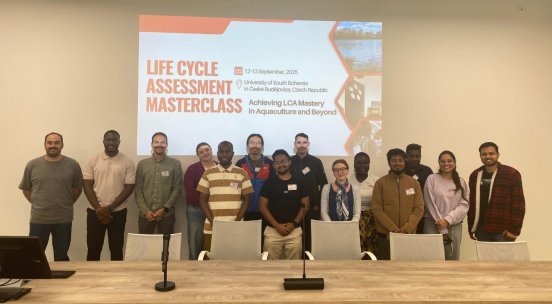
Empowering Research Through LCA: Insights from the University of South Bohemia Masterclass
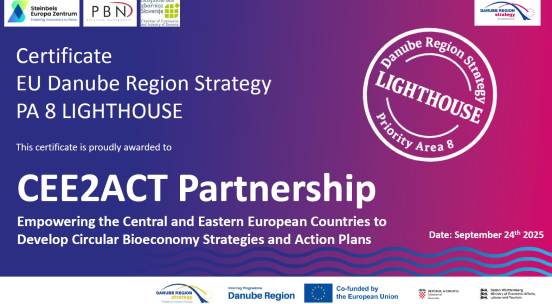
CEE2ACT Becomes a Lighthouse Project
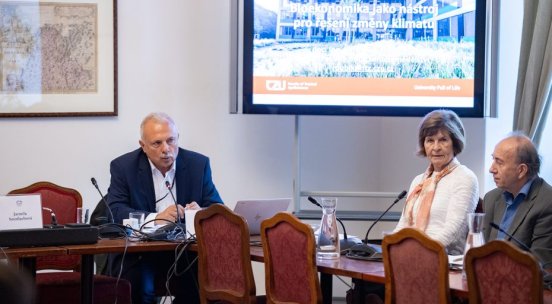
Bioeconomy as a Tool for Addressing Climate Change: Hynek Roubík Presents in the Czech Senate
On September 23rd 2025, BRT Director Assoc. Prof. Dr. Hynek Roubík was invited to the Czech Senate in the upper house of the Parliament of the Czech Republic to deliver a keynote presentation on the role of bioeconomy as a strategic tool in addressing climate change. In his address to senators and senior policymakers, Dr. Roubík emphasized that bioeconomy is not just a scientific concept, but a practical framework for transforming energy, agriculture, and industry. He underlined four key points:
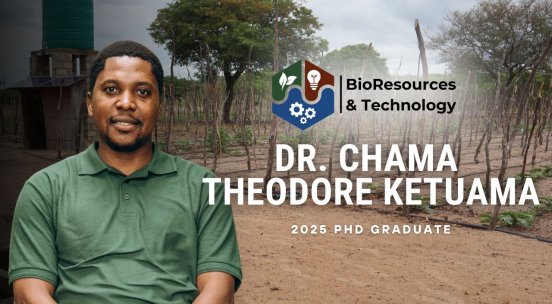
Introducing 2025 PhD graduate, Dr. Chama Theodore Ketuama
Dr. Chama Theodore Ketuama earned his Ph.D. in Sustainable Rural Development under the supervision of Assoc. Prof. Dr. Hynek Roubik (Czech University of Life Sciences Prague). His research focused on the economic, socio-technical, and environmental aspects of small-scale biogas technology in Cameroon. His research topic was ‘Understanding the viability and sustainable transition pathways of small-scale biogas technology in Cameroon’.

Why Biogas Could Be the Missing Link in the Future of Clean Energy
BRT PhD student and junior researcher AbdulAzeez Shobajo recently wrote a think piece about the role of biogas in the future of clean energy. Enjoy reading!
How close are we on our quest towards a sustainable future? Well, we’re making significant strides, but we’re not there yet. Renewable energy is booming. Solar and wind power are now the cheapest sources of electricity in most parts of the world. In a report by International Energy Agency, Over 80% of new electricity capacity in 2024 came from renewables. But let’s talk about another big elephant in the room; Biogas.
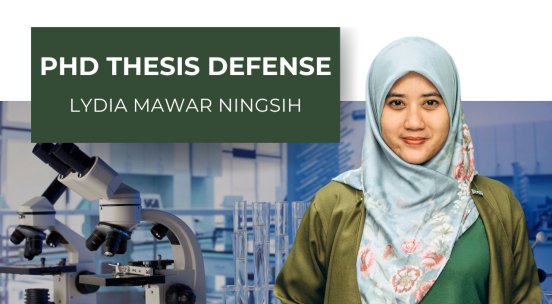
Join us for the PhD thesis defence of Lydia Mawar Ningsih

Visiting Internship Insights – Mihir Ghandi
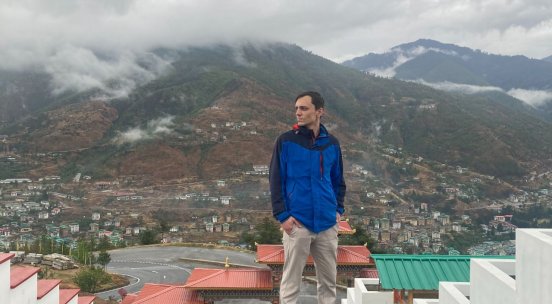
Engineering Solutions and Cultural Connections in Bhutan
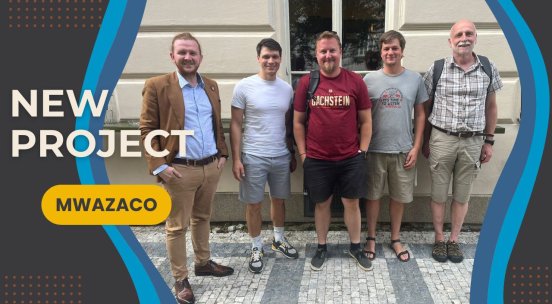
New Project Launched to Tackle Mine Water Pollution in Zambia’s Copperbelt
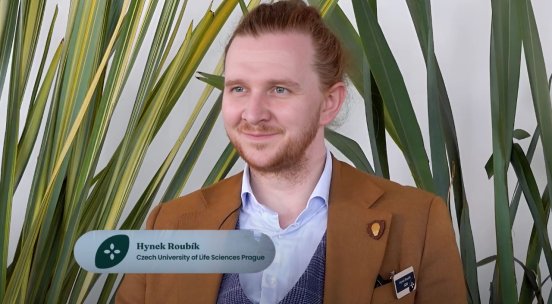
CZU Leads the Way: Hynek Roubík on the Objectives of BIO-CAPITAL
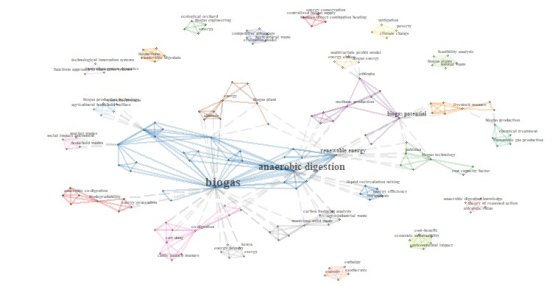
New Paper Published! Biogas for a Circular Economy: Pathways for the Global South
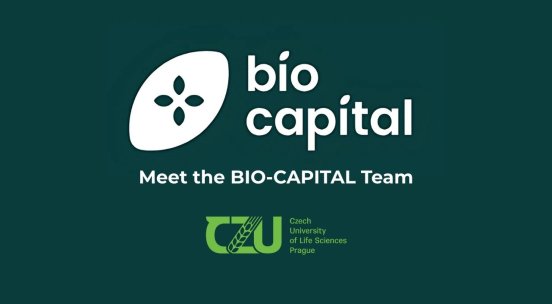
Meet the Minds Behind BIO-CAPITAL: A Closer Look at the CZU-Coordinated Project
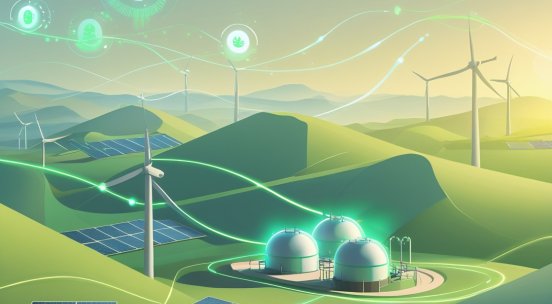
Biogas: A Key Player in a Sustainable Energy Future
BRT PhD student and junior researcher Antoine Bercy recently wrote a think piece about the role of biogas in sustainable energy. Enjoy reading!
When comparing renewable energies, it is important not to fall into the mental trap of trying to figure out which one is “best.” This is not a competitive race to find the next game-changing technology, but rather a humble collaboration to make our world as sustainable as possible. A better approach is to compare energy systems to nature itself. In a closed-loop sustainable system, every component -animal or plant, small or large—has its own role to play. The disappearance of even a seemingly minor part could destabilize the whole system, as a crucial cog would be missing. At the same time, nature shows significant redundancy, where some parts can take over if conditions worsen for others, creating a robust ecosystem.
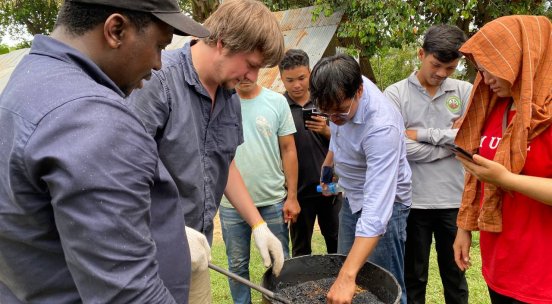
From Biomass to Biochar: BRT Helps Kickstart Sustainable Solutions in Cambodia
-
Day 1–2 (Theory): Covered fundamentals of biochar, types of pyrolysis units (from low-cost to advanced), feedstock potential in Cambodia, and integration with vermicompost.
-
Day 3–5 (Practice): Focused on constructing barrel-type kilns and introducing safe construction plans and handling. This hands-on phase proved to be crucial.
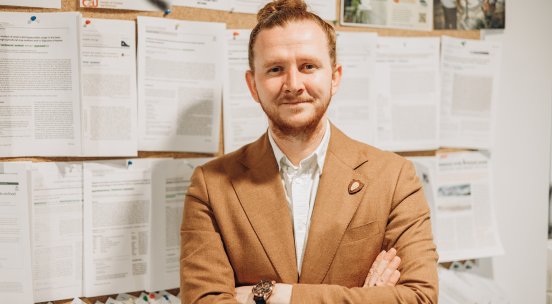
BRT Director Assoc. Prof. Dr. Hynek Roubík Ranked Among Top 0.5% of Scholars Worldwide by ScholarGPS
We are proud to share that BRT Director Assoc. Prof. Dr. Hynek Roubík has been recognized as a 2024 Top Scholar by ScholarGPS, placing him among the top 0.5% of scholars globally. This prestigious recognition highlights his outstanding research, strong publication record, and the global relevance of his work.
ScholarGPS rankings assess academic excellence across disciplines, based on both lifetime achievements and recent research output. In the “Rural Area” category, Dr. Roubík achieved an impressive #52 global ranking over the past five years - demonstrating his commitment to sustainable development, rural innovation, and applied bioeconomy.
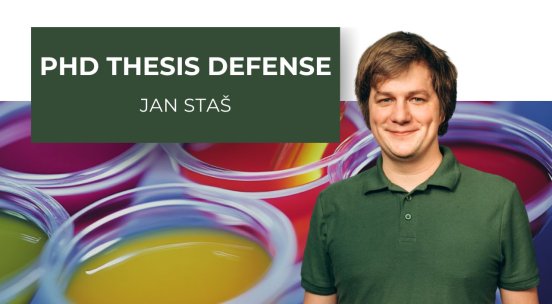
Join us for the PhD thesis defence of Jan Staš
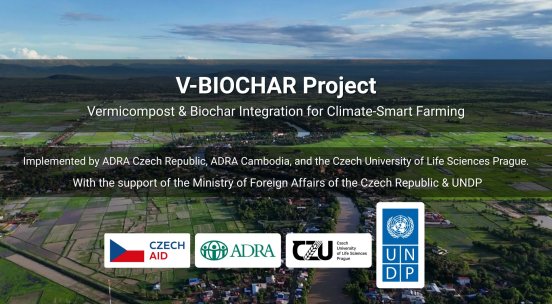
Watch How V-BIOCHAR is Transforming Farming in Cambodia
V-BIOCHAR (Vermicompost & Biochar Integration for Climate-Smart Farming) is bringing innovative, low-cost soil improvement methods to small-scale farmers in Cambodia’s Pursat province. The project focuses on integrating two powerful natural soil enhancers — biochar and vermicompost — to restore soil health, improve crop yields, and reduce dependence on imported chemical fertilizers.
Using locally available materials such as rice husks and coconut shells, V-BIOCHAR introduces simple pyrolysis technology to produce biochar, while building on the success of previous vermicomposting initiatives. Farmers receive training in production, marketing, and sustainable land management, with half of all participants expected to be women.
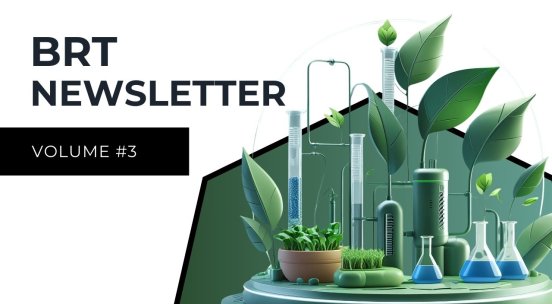
Out Now : 2025 BRT Newsletter - Mid-Year Highlights
We’re excited to share key moments and milestones from the first half of 2025 at the BioResources and Technology (BRT) Division. This edition captures the energy, innovation, and collaboration that continue to define our work in sustainable development.
So far this year, BRT has contributed to international projects with activities spanning Africa, Asia, Europe, and the Americas. We’ve hosted public outreach events, welcomed interns from around the world, shared our research at global conferences, and more. Our members have also taken on new leadership roles and launched new collaborations, strengthening BRT’s impact both locally and globally.
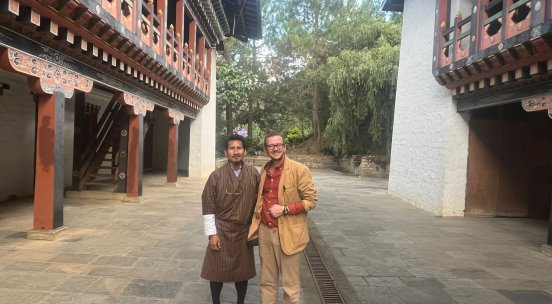
BRT Strengthening Academic Ties in Bhutan
BRT Director Assoc. Prof. Dr. Hynek Roubík, Dean of the Faculty of Tropical AgriSciences (FTZ) at the Czech University of Life Sciences Prague (CZU), has recently returned from a successful academic mobility to Bhutan. The visit was supported by the prestigious Erasmus+ KA171 programme, which promotes international collaboration and capacity building between European and non-European higher education institutions.
Hosted by the College of Science and Technology (CST) and its president Dr. Tshewang Lhendup, and the College of Natural Resources (CNR) under the Royal University of Bhutan, Assoc. Prof. Dr. Roubík engaged in an intensive academic exchange focusing on sustainable agriculture, bioresource utilization, and rural development. The mobility included expert lectures, curriculum consultations, and strategic discussions aimed at building long-term partnerships between CZU and Bhutanese institutions.
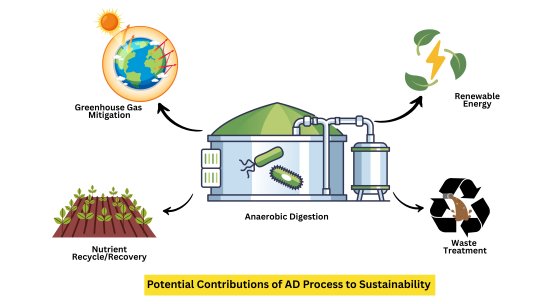
Intensification of Anaerobic Digestion of Combined Different Wastes
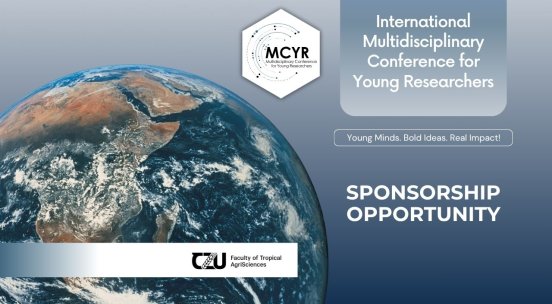
Be Part of MCYR 2025 - Sponsor the Future of Research
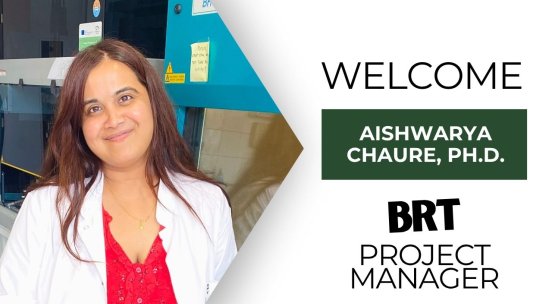
Introducing BRT’s newest Project Manager - Aishwarya Chaure
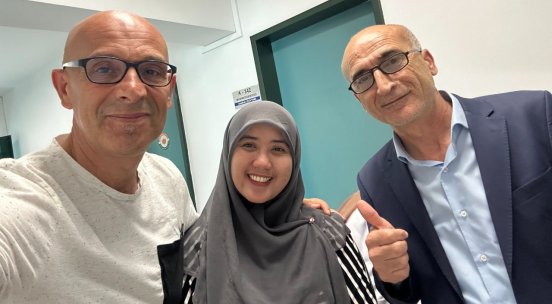
Enhancing Scientific Expertise Through STSM at Yildiz Technical University
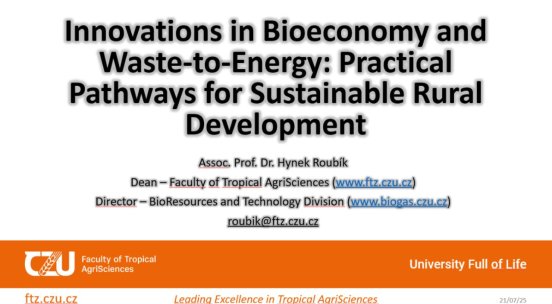
Innovations in Bioeconomy and Waste-to-Energy: Assoc. Prof. Dr. Hynek Roubík’s Guest Lecture in India
The BioResources & Technology Division (BRT) at the Faculty of Tropical AgriSciences (FTZ), Czech University of Life Sciences Prague (CZU), had the pleasure of hosting Mr. Thinley Tobgay from the Department of Electrical and Electronics Engineering and Mr. Dorji Wangchuk from the Department of Civil and Surveying Engineering, both of Jigme Namgyel Engineering College (JNEC), Royal University of Bhutan. The visit was part of the Erasmus+ KA171 faculty mobility programme, aimed at fostering academic collaboration and advancing sustainable technologies.
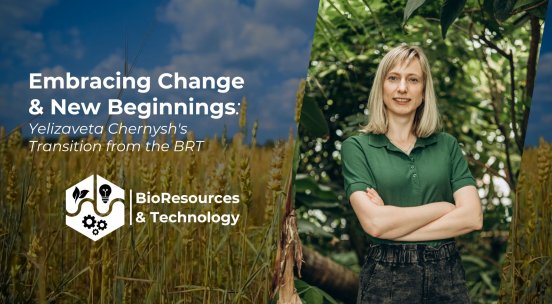
Embracing Change & New Beginnings: Yelizaveta Chernysh's Transition from the BRT
It’s always a moment of mixed emotions when we say farewell to a valued colleague. Today, we write with both pride and gratitude as we mark a new professional chapter for Assoc. Prof. Dr. Yelizaveta Chernysh, senior researcher in the BioResources and Technology (BRT) Division at the Faculty of Tropical AgriSciences (FTZ), Czech University of Life Sciences Prague (CZU).
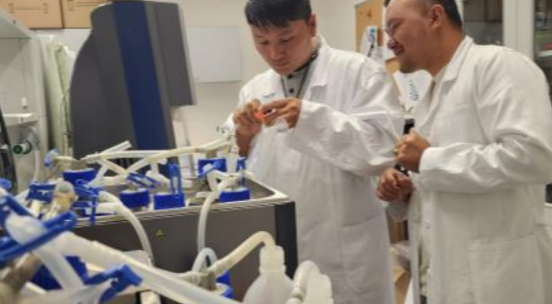
Strengthening International Collaboration in Renewable Energy: BRT Hosts Colleagues from Bhutan
The BioResources & Technology Division (BRT) at the Faculty of Tropical AgriSciences (FTZ), Czech University of Life Sciences Prague (CZU), had the pleasure of hosting Mr. Thinley Tobgay from the Department of Electrical and Electronics Engineering and Mr. Dorji Wangchuk from the Department of Civil and Surveying Engineering, both of Jigme Namgyel Engineering College (JNEC), Royal University of Bhutan. The visit was part of the Erasmus+ KA171 faculty mobility programme, aimed at fostering academic collaboration and advancing sustainable technologies.

Meet our new intern - Mihir Gandhi
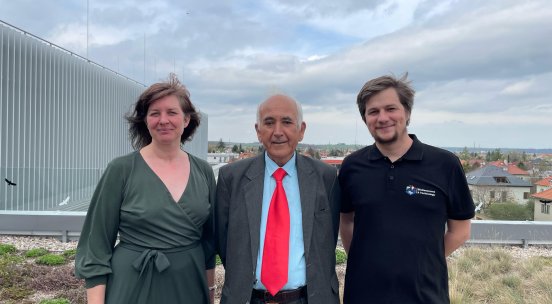
Deepening Czech–Ethiopian Collaboration: Dr. Shah Visits BRT at CZU
The BRT at the Faculty of Tropical AgriSciences (FTZ) of the Czech University of Life Sciences Prague (CZU) had the honour of welcoming distinguished guest Dr. Ghulam Hassan Shah from Arba Minch University, Ethiopia. FTZ has maintained long-standing cooperation with this university on various research and development projects. The aim of this visit was to strengthen the partnership and explore new areas of collaboration between the two institutions.
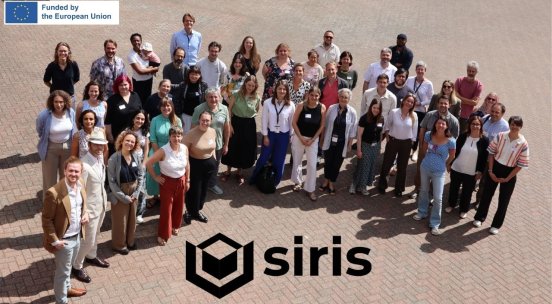
BRT at the OSIRIS General Assembly in London
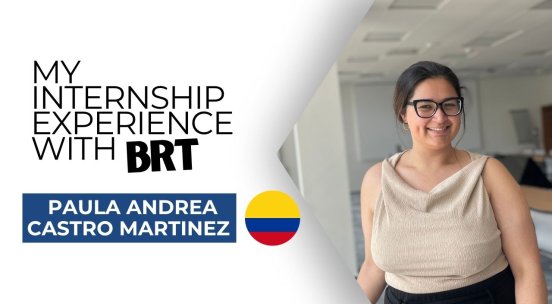
Visiting Internship Insights – Paula Andrea Castro Martinez
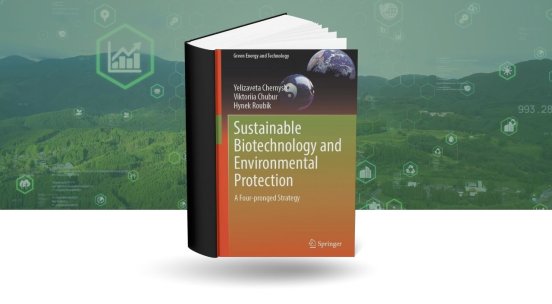
New Book! Sustainable Biotechnology and Environmental Protection
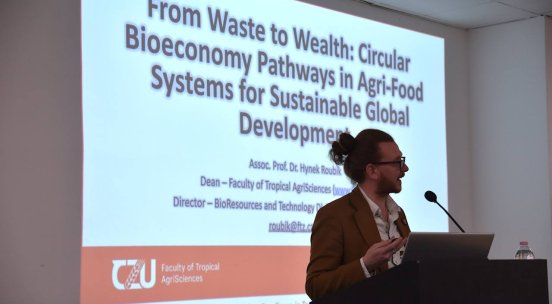
From Waste to Wealth: Circular Bioeconomy Pathways in Agri-Food Systems for Sustainable Global Development
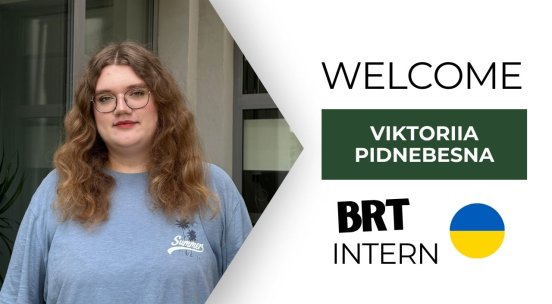
Meet our new intern - Viktoriia Pidnebesna
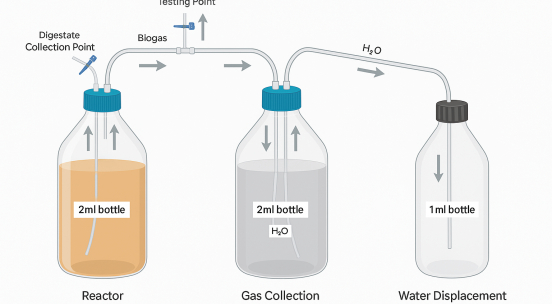
New Paper Published! Potential of Sugarcane Bagasse as Feedstock for Biogas Production in Nigeria
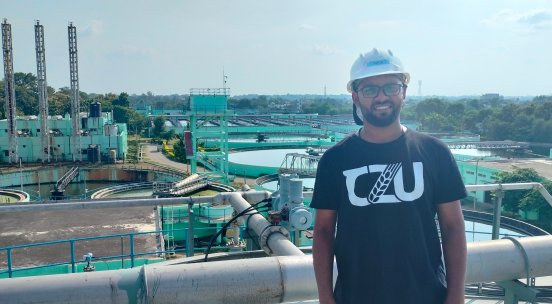
Seizing Opportunities for Growth: My Internship Journey at Himachal Pradesh University, India
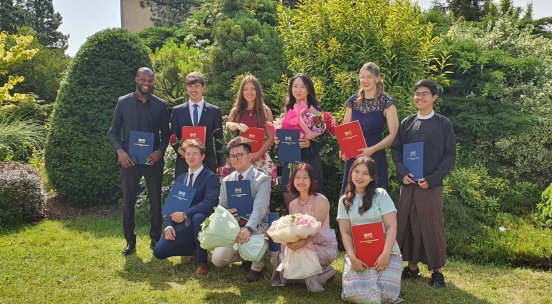
Congratulations 2025 BRT Graduates!
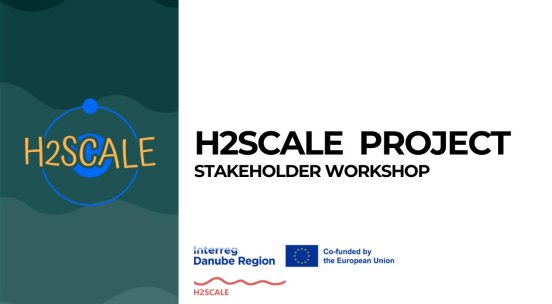
H2SCALE Project Stakeholder Workshop Hosted by BRT
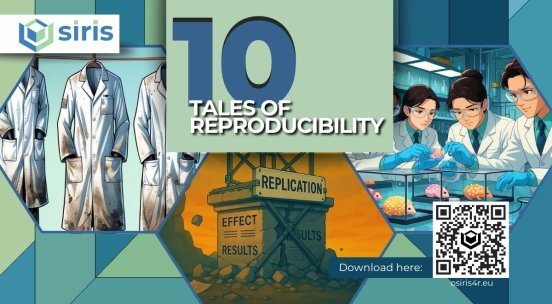
OSIRIS Project Launches “10 Tales of Reproducibility” - Real Stories Behind Trustworthy Science
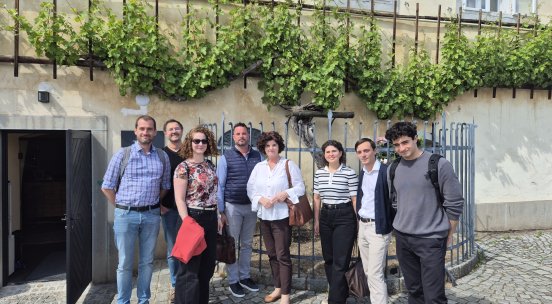
Hydrogen Strategy Discussions: BRT Joins H2SCALE Meeting in Slovenia
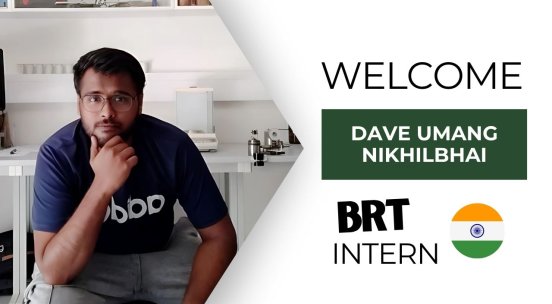
Meet our new intern - Dave Umang
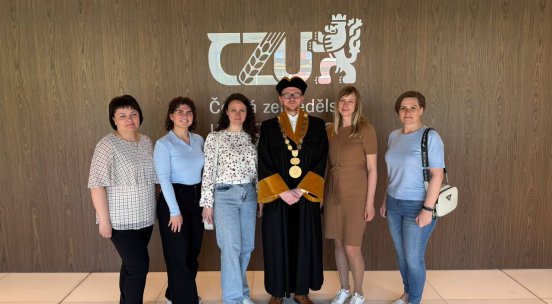
Cross-Border Knowledge Transfer: SNAU’s Training Visit to CZU
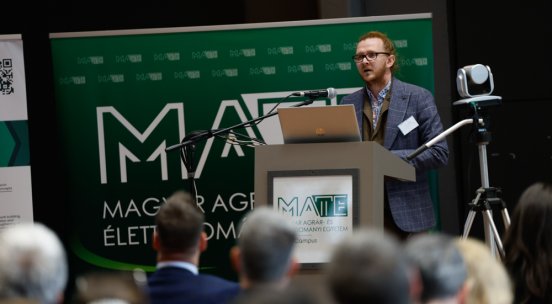
BRT Takes the Stage at MATE University’s Research Excellence Event
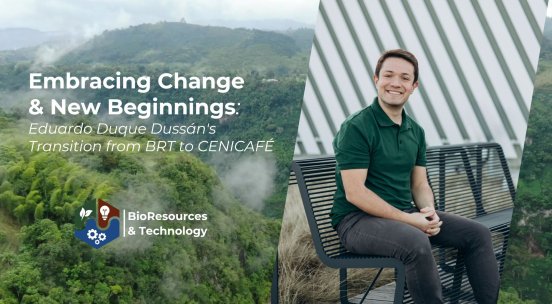
Embracing Change & New Beginnings: Eduardo Duque-Dussán’s Next Chapter
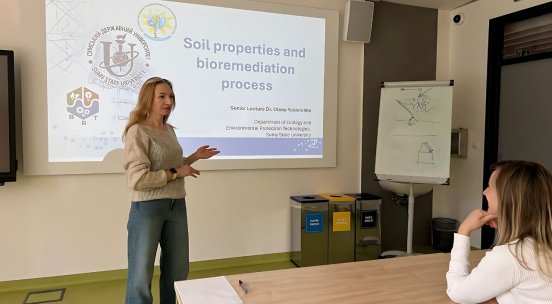
From Lab to Lecture: Strengthening Scientific Ties with Ukraine through Erasmus+
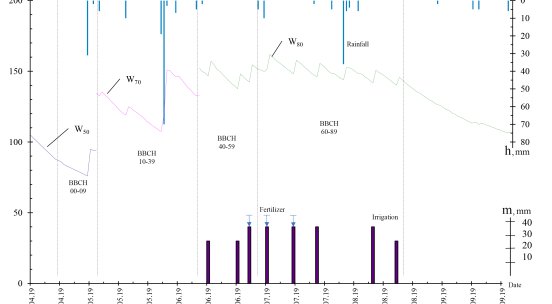
New Paper Published! Fertigation With Sprinklers: Food and Water Security on the Ukrainian Steppe
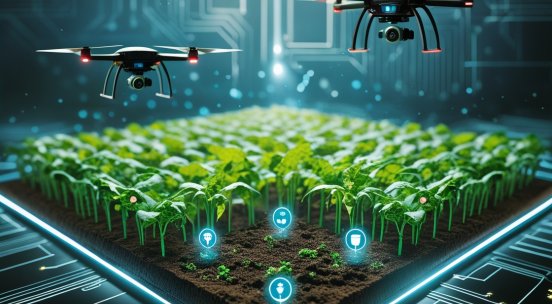
Precision Agriculture: How Technology is Making Farming More Efficient and Sustainable
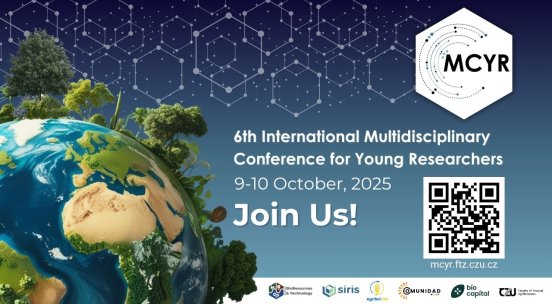
Join us for MCYR 2025
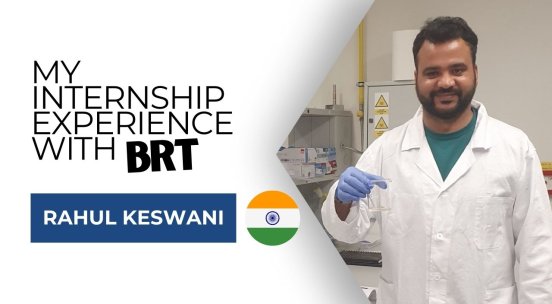
Visiting Internship Insights – Rahul Keswani
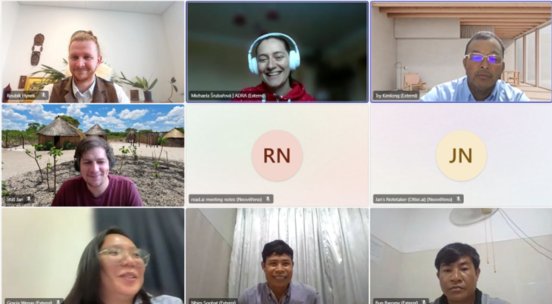
V-BIOCHAR Project Partners Meet to Finalize Project Implementation Plan
On May 5, 2025, the core partners of the V-BIOCHAR project — the Czech University of Life Sciences Prague (CZU), ADRA Cambodia, and ADRA Czech Republic — held an internal coordination meeting to finalize the implementation plan for this groundbreaking initiative aimed at promoting climate-smart farming in Cambodia’s Pursat province.
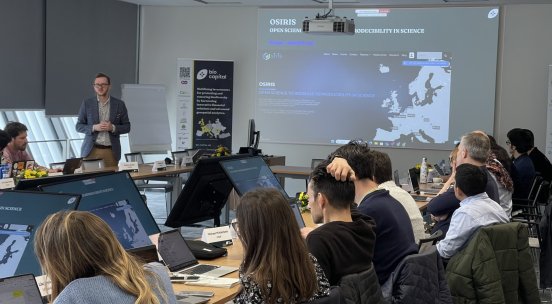
COMUNIDAD and OSIRIS Projects Presented at BIO-CAPITAL General Assembly
During the recent BIO-CAPITAL Project General Assembly in Prague, BRT Director Assoc. Prof. Dr. Hynek Roubík presented two EU-funded initiatives that showcase the power of space technology and open science to advance global sustainability: the COMUNIDAD and OSIRIS projects.
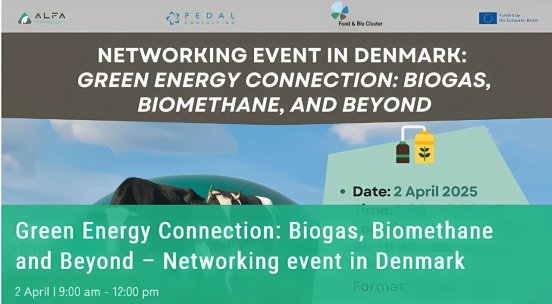
BRT at the ALFA Networking Event in Denmark
BRT Senior Researcher Associate Professor Dr. Yelizaveta Chernysh recently participated as an invited speaker at the ALFA hybrid networking event “Green Energy Connection: Biogas, Biomethane and Beyond”, held on April 2, 2025, in Denmark.
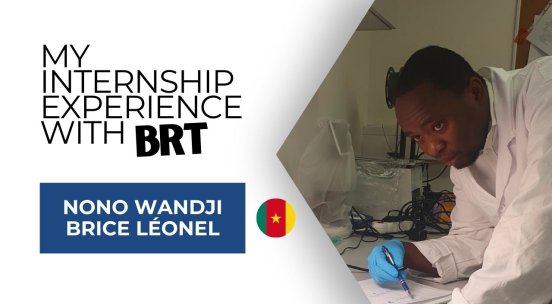
Visiting Internship Insights - NONO WANDJI Brice Léonel
Building Bridges for a Greener Future: BIOECO-UP Project Meeting in Prague
On March 26–27, 2025, partners of the BIOECO-UP project gathered in the heart of Prague, at the historic Novotného lávka, for a two-day transnational meeting filled with collaboration, innovation, and forward-thinking dialogue on the future of the bioeconomy in Central and Eastern Europe.
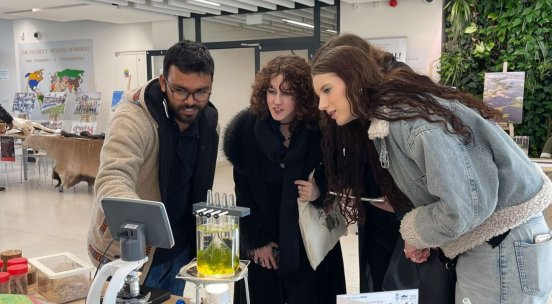
BRT Open Day: Inspiring Minds, Showcasing Sustainable Science!
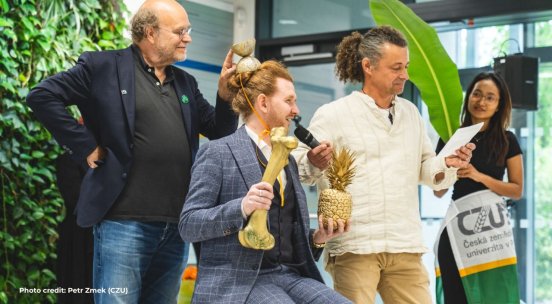
A New Chapter: BRT Director Assoc. Prof. Dr. Hynek Roubík Inaugurated as FTZ Dean
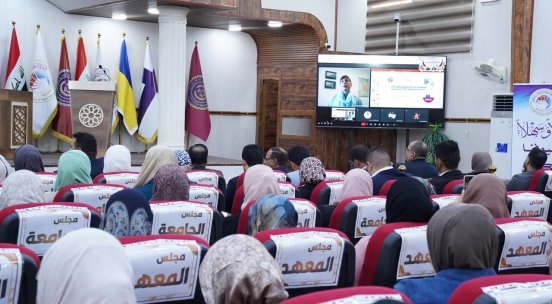
BRT at SCGEMS 2025: Sustainable Bioprocessing of Phosphogypsum
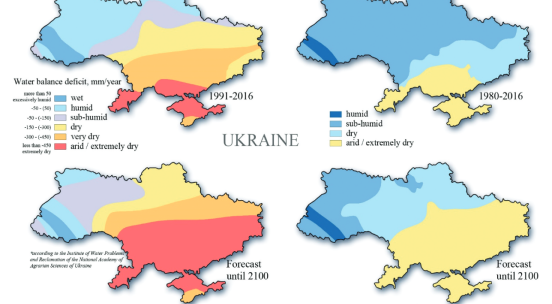
New Paper Published! Prospects for the Restoration of Ukraine’s Irrigation System

Meet our new intern - Maame Mesiwah Andzie-Quainoo
To broaden and develop our teams’ collaborative skills while offering visiting students the chance to expand their scientific networks and gain cultural experiences, BRT encourages students to join our team for internship opportunities. These internships aim to facilitate idea exchange, foster professional growth, and create opportunities for collaboration. Meet the new intern joining our team from Ghana, Maame Mesiwah Andzie-Quainoo!
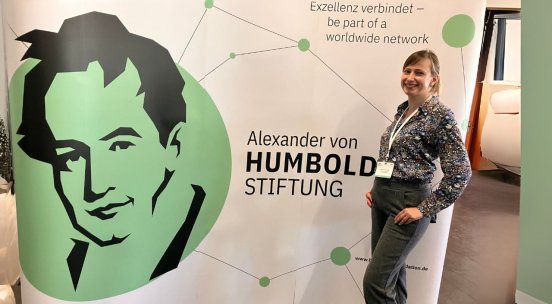
BRT at the Philipp Schwartz Forum in Berlin
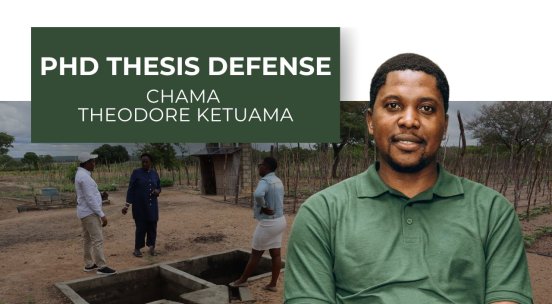
Join us for the PhD thesis defence of Chama Theodore Ketuama
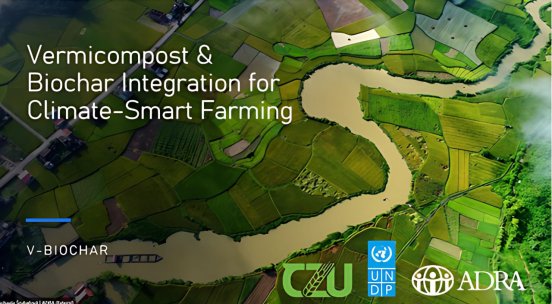
Kick-off of the V-BIOCHAR Project: Vermicompost & Biochar Integration for Climate-Smart Farming in Cambodia
The Czech University of Life Sciences Prague (CZU) through BRT, in partnership with ADRA Cambodia and ADRA Czech Republic, is proud to announce the launch of the V-BIOCHAR project — Vermicompost & Biochar Integration for Climate-Smart Farming. This innovative initiative officially kicked off in early 2025 and will run for 12 months, targeting small-scale farmers in Cambodia’s Pursat province together with representatives of UNDP and Czech Embassy in Cambodia.
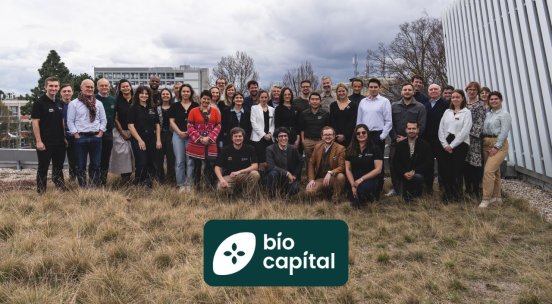
BIO-CAPITAL Project Meeting at CZU!
Last week, the BIO-CAPITAL project consortium convened in Prague, marking a pivotal moment in the project’s journey. Hosted by the Czech University of Life Sciences Prague (CZU), the meeting served as a crucial bridge between foundational research and the next phase of integration! BRT Director Assoc. Prof. Dr. Hynek Roubik is serving as project coordinator and lead of WP1 whose objective is to coordinate and manage the implementation and progress of the project.
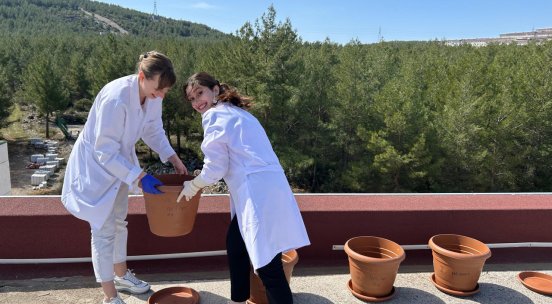
Training Visit to Environmental Problems Research and Application Center, Mugla Sitki Koçman University, Mugla, Turkey
BRT Senior Researcher Associate Professor Dr. Yelizaveta Chernysh, had the opportunity to explore advanced analytical methods at the Environmental Problems Research and Application Center of Mugla Sitki Koçman University during her training visit in March 2025.
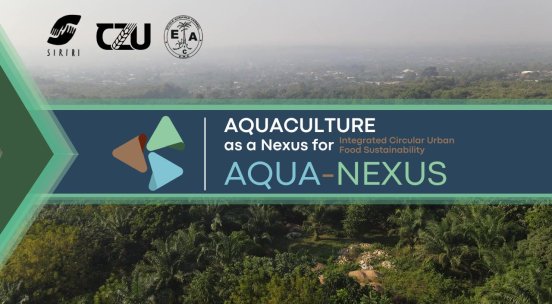
AQUA-NEXUS: Transforming Food Security & Sustainability in CAR
The AQUA-NEXUS project aims to revolutionize food production in peri-urban Bangui, Central African Republic (CAR), by establishing a circular, resource-efficient food system. Through small-scale aquaculture, insect farming, vermicomposting, and small livestock integration, the project seeks to enhance food security, improve local livelihoods, and promote sustainability. This established Living Lab will foster collaboration, training, and gender empowerment, creating a scalable model for sustainable agriculture that can be replicated across Africa.
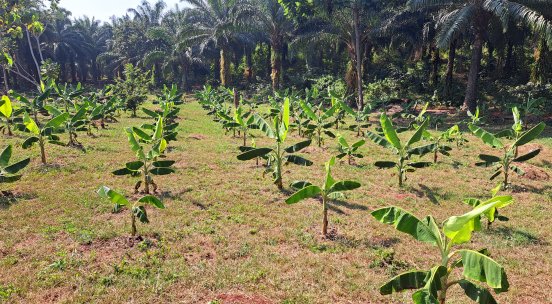
Transforming Agricultural Practices in Central African Republic: A Collaborative Vision of Sustainability at Carmel Farm
The Faculty of Tropical AgriSciences (FTZ) at the Czech University of Life Sciences Prague (CZU) is at the forefront of promoting sustainable agricultural practices in developing regions. As part of a larger commitment to fostering ecological balance and food security, FTZ has partnered with the non-profit organisation SIRIRI to carry out an in-depth professional assessment of Carmel Farm in the Central African Republic. The farm, once an unproductive oil palm plantation, is being reimagined as a model for sustainable agroforestry. This transformation aims not only to rehabilitate the land but also to create a dynamic space for scientific research, student education, and community empowerment. BRT Project Manager and PhD student Ing. Jan Staš was the author of the assessment which proposed solutions for transforming Carmel Farm.
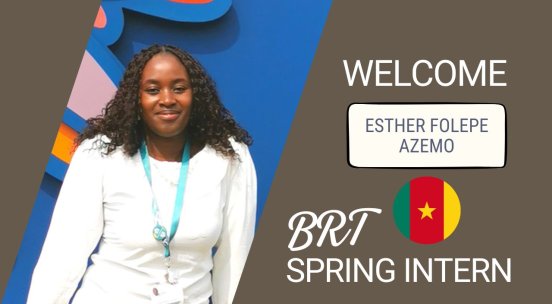
Meet our new intern - Esther Folepe Azemo
To broaden and develop our teams’ collaborative skills while offering visiting students the chance to expand their scientific networks and gain cultural experiences, BRT encourages students to join our team for internship opportunities. These internships aim to facilitate idea exchange, foster professional growth, and create opportunities for collaboration. Meet the new intern joining our team from Cameroon, Esther Folepe Azemo!
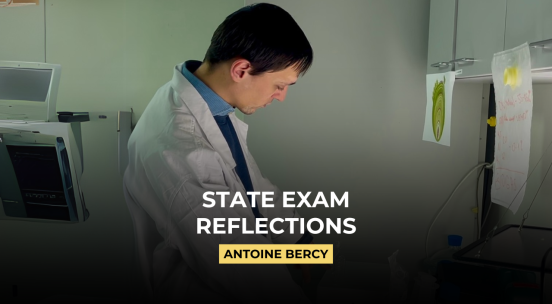
My State Exam Experience – Antoine Bercy
The state exam is a key milestone in the PhD journey, testing both subject knowledge and the ability to synthesize and apply research concepts. In this blog series, BRT PhD students provide an inside look at the exam process — from preparation methods to the structure of the exam itself — offering insights into this essential academic requirement. Read PhD student Antoine Bercy’s first account below!
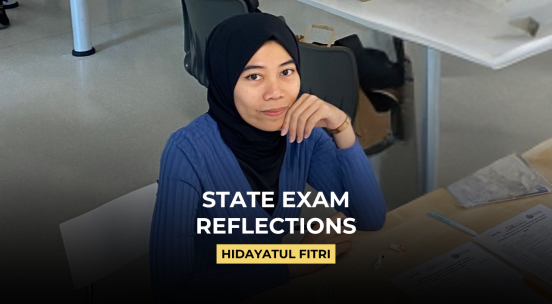
My State Exam Experience – Hidayatul Fitri
The state exam is a key milestone in the PhD journey, testing both subject knowledge and the ability to synthesize and apply research concepts. In this blog series, BRT PhD students provide an inside look at the exam process — from preparation methods to the structure of the exam itself — offering insights into this essential academic requirement. Read PhD student Hidayatul Fitri’s first account below!
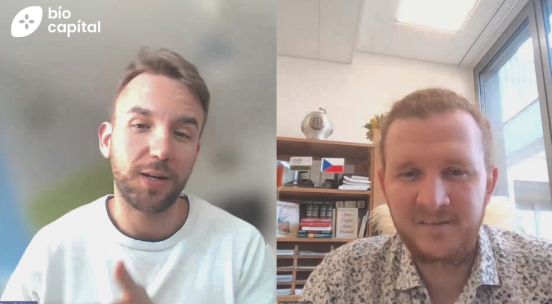
Hynek Roubík and the BIO-CAPITAL Project: Connecting Biodiversity and Sustainable Finance
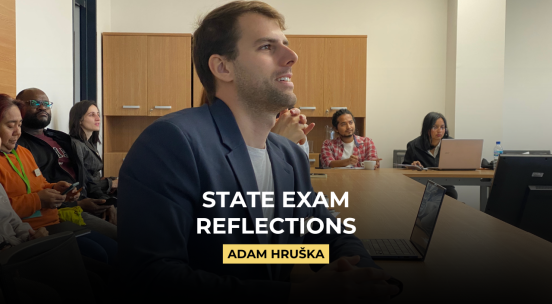
My State Exam Experience – Adam Hruška
The state exam is a key milestone in the PhD journey, testing both subject knowledge and the ability to synthesize and apply research concepts. In this blog series, BRT PhD students provide an inside look at the exam process — from preparation methods to the structure of the exam itself — offering insights into this essential academic requirement. Read PhD student Adam Hruška’s first account below!
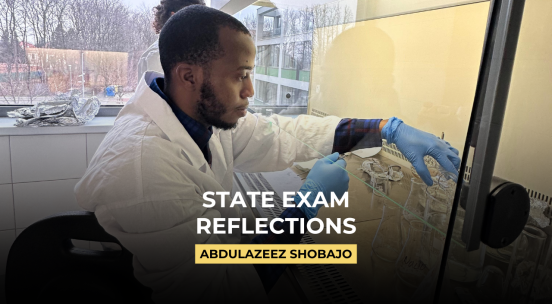
My State Exam Experience – AbdulAzeez Shobajo
The state exam is a key milestone in the PhD journey, testing both subject knowledge and the ability to synthesize and apply research concepts. In this blog series, BRT PhD students provide an inside look at the exam process — from preparation methods to the structure of the exam itself — offering insights into this essential academic requirement. Read PhD student AbdulAzeez Shobajo’s first account below!
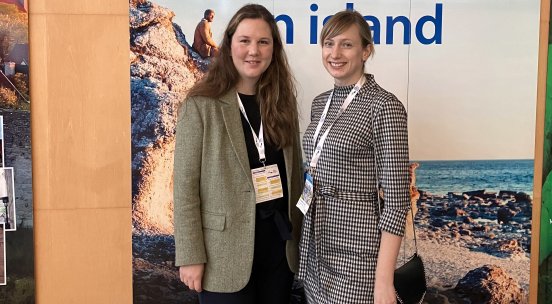
Annual Forum 2024: Empowering Ukraine’s Sustainable Recovery with EUSBSR
BRT Senior Researcher, Assoc. Prof. Dr. Yelizaveta Chernysh participated in the EU Strategy for the Baltic Sea Region (EUSBSR) 2024 Annual Forum. The 15th EUSBSR Annual Forum, organized in Visby, Sweden on 30-31 October, invited participants to engage, co-create, and network to reinforce and further develop cooperation in the Baltic Sea Region and beyond. All in all, the forum attracted 650 registered participants from 20 countries.
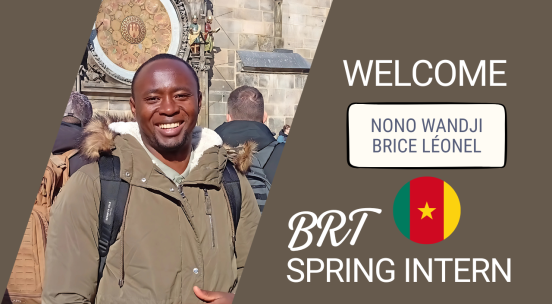
Meet our new intern - NONO WANDJI Brice Léonel
To broaden and develop our teams’ collaborative skills while offering visiting students the chance to expand their scientific networks and gain cultural experiences, BRT encourages students to join our team for internship opportunities. These internships aim to facilitate idea exchange, foster professional growth, and create opportunities for collaboration. Meet the new intern joining our team from Cameroon, NONO WANDJI Brice Léonel!
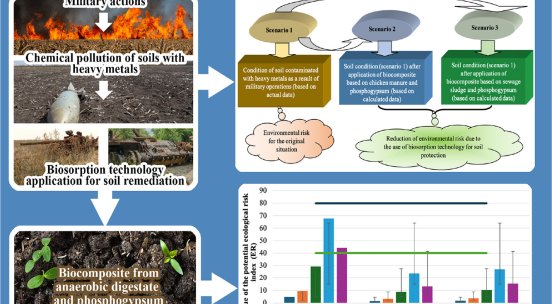
New paper published! Assessment of ecological safety and economic efficiency of biosorption technology for soil protection after hostilities
BioResources and Technology Division (BRT) senior researcher Yelizaveta Chernysh and BRT Director Assoc Prof. Dr. Hynek Roubík recently published an article! This study addresses the growing ecological risks of chemical soil pollution in Ukraine following military action due to the full-scale Russian invasion. This research evaluates the ecological safety and economic feasibility of biosorption technology in mitigating heavy metal contamination in soils.
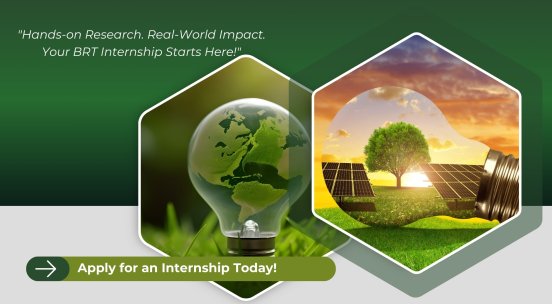
Apply now! BRT Internship Programme – Gain Hands-On Experience
The BioResources & Technology (BRT) Division at the Czech University of Life Sciences Prague (CZU) is now accepting applications for its internship programme, offering students and recent graduates the opportunity to develop practical skills in biogas research, science communication, and project management.
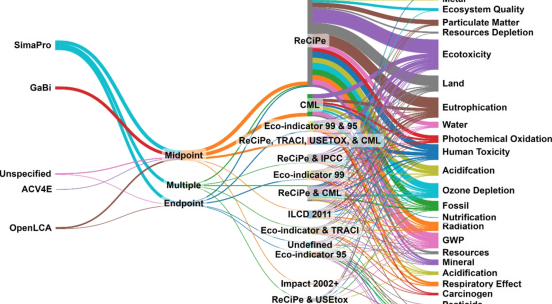
New paper published! Exploring the Role of Life Cycle Assessment in Water and Wastewater Treatment in Africa
BioResources and Technology Division (BRT) researcher Charles Amarachi Ogbu and BRT Director Assoc Prof. Dr. Hynek Roubík recently published an article! This study examines the application of Life Cycle Assessment (LCA) in water and wastewater treatment across Africa. LCA provides a comprehensive methodology for evaluating the environmental impacts of processes by analyzing energy use, material flows, and emissions throughout their life cycle. This study assesses the extent of LCA implementation in the sector while identifying key challenges and opportunities.
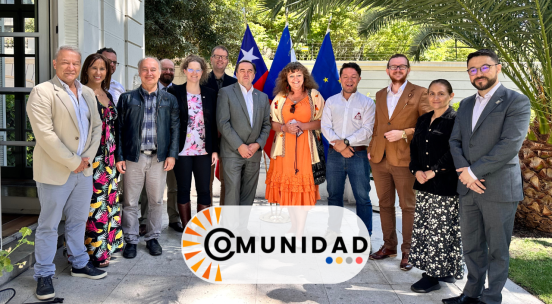
COMUNIDAD Project's Visits to Colombia and Chile
Recently, BRT Director Assoc. Prof. Dr. Hynek Roubík and BRT Communications Manager Dr. Stacy Hammond from the Czech University of Life Sciences Prague (CZU) traveled to Colombia and Chile as part of the COMUNIDAD project. These visits aimed to strengthen collaboration, exchange knowledge, and support sustainable solutions in agriculture, forestry, and environmental management
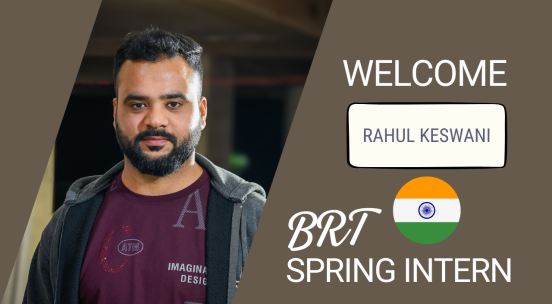
Meet our new intern – Rahul Keswani
To broaden and develop our teams’ collaborative skills while offering visiting students the chance to expand their scientific networks and gain cultural experiences, BRT encourages students to join our team for internship opportunities. These internships aim to facilitate idea exchange, foster professional growth, and create opportunities for collaboration. Meet the new intern joining our team from India, Rahul Keswani!
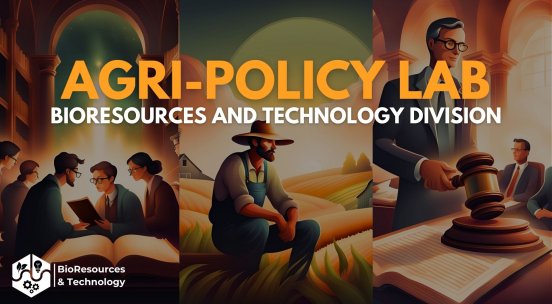
Inside the Agri Policy Lab
The Agri Policy Lab is a multidisciplinary unit within the BRT dedicated to advancing sustainable and inclusive agricultural policies. By conducting in-depth research, engaging stakeholders, and advocating for evidence-based decisions, the lab provides innovative solutions to pressing agricultural challenges.
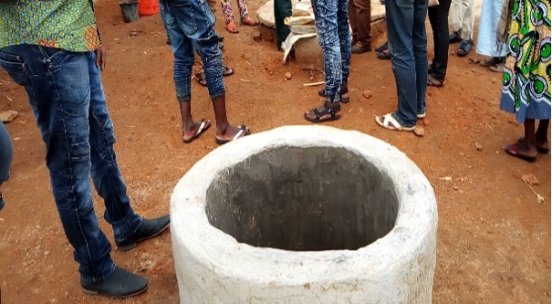
New paper published! Exploring the causes of slow biogas energy transition in rural areas of Cameroon
BioResources and Technology Division (BRT) junior researcher and PhD Chama Theodore Ketuama and BRT Director Assoc Prof. Dr. Hynek Roubík recently published an article! The transition to biogas energy in rural areas of Cameroon is very slow despite the initiatives that have been implemented since 1979. The slow progress is similar in other African countries such as Tanzania, Senegal, and Uganda. According to some researchers, there is a need for more critical engagement with the potential and practice for biogas investment on the African continent. However, each country faces unique needs and challenges in accelerating its transition to this renewable energy source.
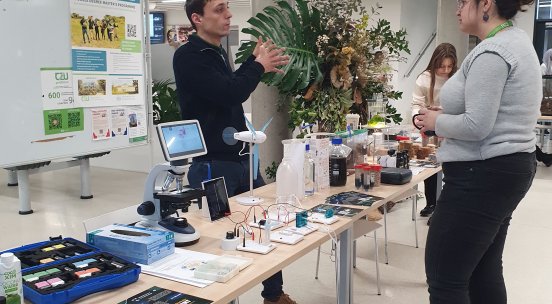
Showcasing BRT at FTZ Open Day
BRT actively participates in CZU Open Days, to engage with prospective students, showcase our research, and exchange ideas with faculty teams. This year, BRT PhD student Antoine Bercy led our booth—read about his firsthand experience! Open Day is an opportunity to showcase BRT’s work to future university students and inspire them to follow a similar fulfilling career path. It is also an opportunity for us to interact with different teams from the FTZ faculty and update each other on our work. I really enjoyed going around the different booths and discovering what they displayed.
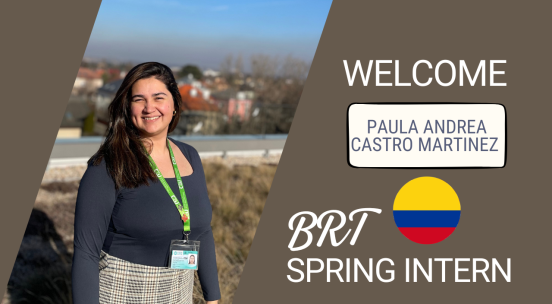
Meet our new intern - Paula Andrea Castro Martinez
To broaden and develop our teams’ collaborative skills while offering visiting students the chance to expand their scientific networks and gain cultural experiences, BRT encourages students to join our team for internship opportunities. These internships aim to facilitate idea exchange, foster professional growth, and create opportunities for collaboration.
Meet the new intern joining our team from Colombia, Paula Andrea Castro Martinez!
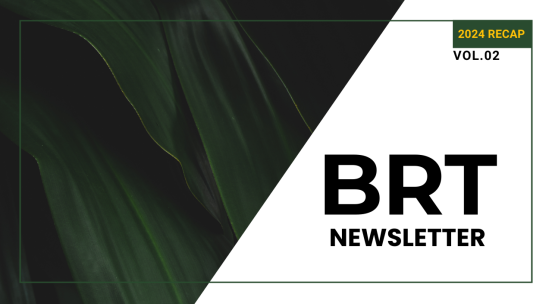
BRT 2024 Annual Newsletter – Read Now!
We’re excited to share the BRT Annual Newsletter, highlighting key achievements, global collaborations, and groundbreaking research from the past year.
In 2024, BRT expanded its reach across four continents, driving progress in anaerobic digestion, waste-to-energy solutions, and the circular bioeconomy. With nearly 1,000 biogas plants built worldwide, we continue to advance sustainable energy solutions. Our participation in Horizon Europe projects has strengthened our leadership in sustainable development.
This year’s MCYR Conference gathered young researchers from over 20 countries, fostering interdisciplinary collaboration and innovation. Research visits, internships, and international collaborations enriched our activities and output, introducing fresh perspectives and strengthening global networks.
In this issue, we proudly showcase and recognise the success of our PhD graduates, whose contributions are making a lasting impact across academia, industry, and policy sectors. Their work reflects BRT’s commitment to advancing scientific knowledge and its real-world applications.
As we look ahead, we invite students, researchers, partners, and supporters to stay engaged with BRT’s mission. Read the full newsletter to explore our latest developments, insights, and future ambitions!
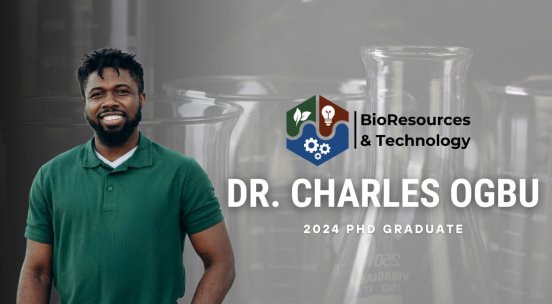
Introducing 2024 PhD graduate, Dr. Charles Ogbu
Dr. Charles Ogbu earned his Ph.D. in Sustainable Technologies with a specialization in Environmental sustainability under the supervision of Assoc. Prof. Dr. Tatiana Alexiou Ivanova and BRT Director Assoc. Prof. Dr. Hynek Roubik (Czech University of Life Sciences Prague) and Prof. Temitayo Ewemoje from the University of Ibadan, Nigeria. His research focused on sustainable resource recovery in wastewater treatment systems. His research topic was "Environmental Assessment of Wastewater Treatment-based Resource Recovery in Nigeria."
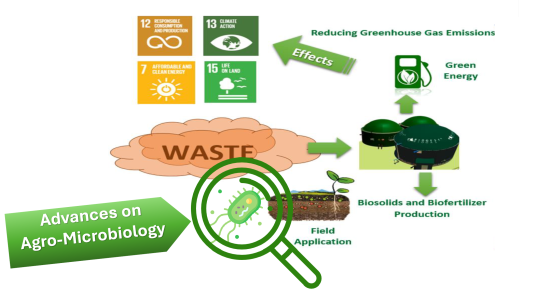
Guest Editors for a Special Issue on Agro-Microbiology
BRT is pleased to announce that BRT Senior Researcher Assoc. Prof. Dr. Yelizaveta Chernysh and BRT Director Assoc. Prof. Dr. Hynek Roubík have been invited to serve as Guest Editors for the Special Issue "Advances on Agro-Microbiology" in the journal Microorganisms.
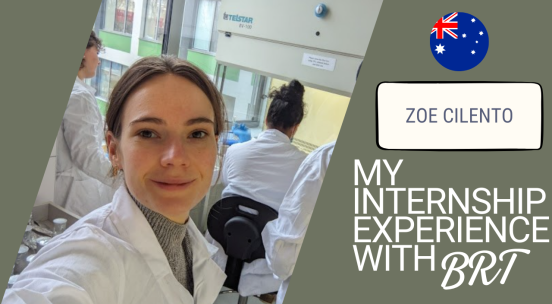
Visiting Internship Insights – Zoe Cilento
To broaden and develop our teams’ collaborative skills while offering visiting students the chance to expand their scientific networks and gain cultural experiences, BRT encourages students to join our team for internship opportunities. These internships aim to facilitate idea exchange, foster professional growth, and create opportunities for collaboration.
Recently, we hosted Zoe Cilento, a recent graduate from Australia. Read her introductory blog here.
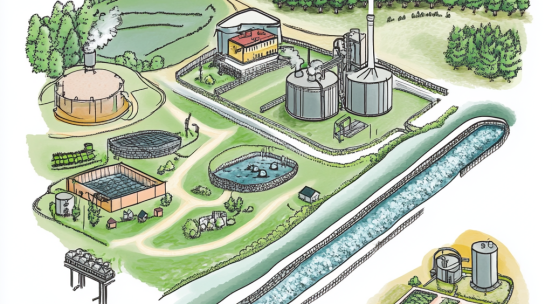
New paper published! Biofilter Use in Anaerobic Baffled Reactor to Improve Methane and Effluent Quality
BioResources and Technology Division (BRT) junior researcher and PhD student Lydia Mawar Ningsih and BRT Director Assoc Prof. Dr. Hynek Roubík recently published an article! The results of this study demonstrate that the use of simple biofilter technology in an Anaerobic Baffled Reactor (ABR) has a positive impact on the quality of biogas effluent. Conducted on a pilot scale, the ABR had a capacity of 0.927 m3. The study utilized tofu wastewater sourced from small-scale tofu industries in Indonesia, where the availability of wastewater is abundant due to tofu being a staple food and many tofu production operations being at the home industry level.
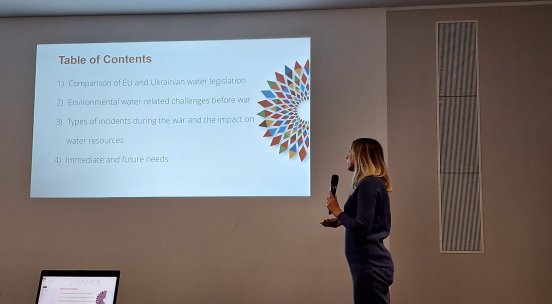
BRT at the 13th Biennial Conference WASTEWATER 2024
BRT Senior Researcher, Assoc. Prof. Dr. Yelizaveta Chernysh, participated in the 13th biennial Wastewater conference, held in Štrbské Pleso, Slovakia. The event was organized by the Association of Cleaning Experts of the Slovak Republic. Yelizaveta presented her research on water management and the impact of war on Ukraine. In line with international standards, Ukraine aims to ensure efficient water resource and environmental management nationwide by 2030. However, achieving this goal depends on the availability of strategic policy documents and the country’s ability to recover after the full-scale war. Risks and challenges may delay or obstruct full alignment with these standards.
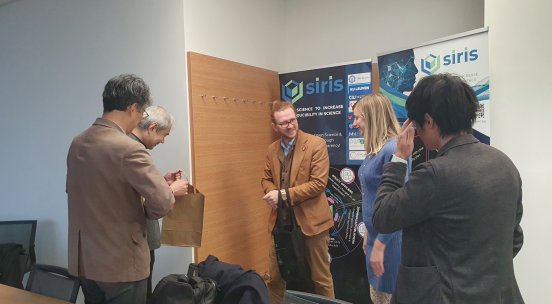
Ukraine, Japan, and the Czech Republic Unite at CZU: Expanding Opportunities for Partnership
The BioResources and Technology (BRT) Division recently hosted a hybrid trilateral meeting between colleagues from Ukraine, Japan, and the Czech Republic. This meeting was held to extend the agreement on cooperation and academic exchange between Sumy State University (Department of Ecology and Environmental Protection Technologies) in Ukraine, Hokkaido University (Institute of Low Temperature Science) in Japan, and the Czech University of Life Sciences Prague (Faculty of Tropical AgriSciences) in the Czech Republic.
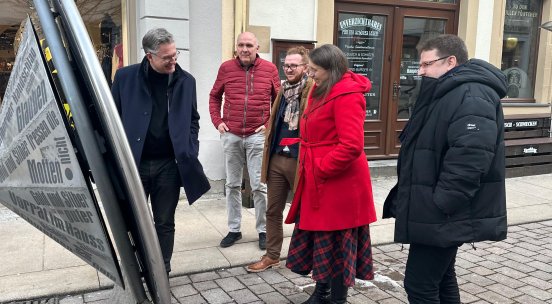
BeeWatch and PG2CRM: Joint Meeting in Freiberg, Germany
In early January 2025, an exciting meeting took place in Freiberg, Germany, where experts from various fields came together to discuss the future of phosphogypsum processing and biomonitoring. The meeting was part of two important projects: the BeeWatch project and the Phosphogypsum Processing to Critical Raw Materials (PG2CRM) project. These initiatives are working towards innovative solutions to some of the pressing environmental and resource challenges. Therefore, BRT could not miss it and was represented by Assoc. Prof. Dr. Hynek Roubík and Dr. Stacy Hammond
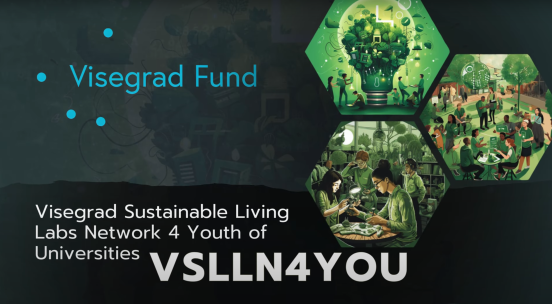
Out Now! VSLLN4YOU Project Video
The VSLLN4YOU project aims to create the Living Labs (LLs) network, which will enable the co-creation and testing of innovative and sustainable solutions, relevant to the Visegrad Universities and Region, in cooperation with partners from the private, public, and civil society sectors. The SLLs will engage students with real-world experience, working on sustainable projects and green solutions, and prepare them to be change agents in their personal and professional lives. Through SLLs, workshops, training
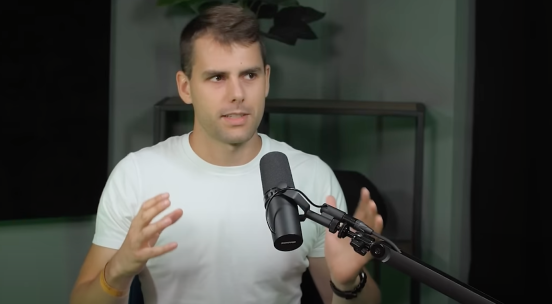
Transformative Potential of AI: My Podcast Experience
At BRT, we’re passionate about driving sustainable innovation through cutting-edge technologies. Recently, BRT junior researcher and PhD student Adam Hruška had the opportunity to be a guest on a podcast. Here are his first account insights!
Recently, I had the incredible opportunity to be a guest on the Moneta Zeleně podcast, diving into the transformative implications of artificial intelligence (AI). This experience allowed me to unpack complex topics in an accessible way, sharing insights about the rapidly evolving world of AI with listeners.
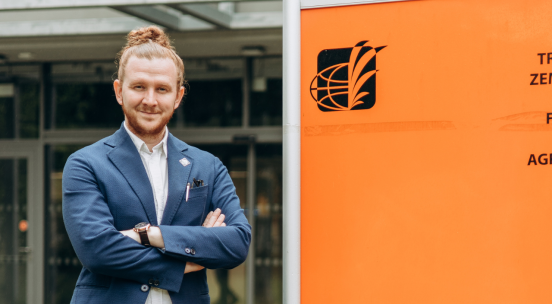
Announcing BRT Director Assoc. Prof. Dr. Hynek Roubík as the new dean of FTZ!
On Thursday, 9 January 2025, the FTZ Academic Senate elected Assoc. Prof. Dr. Hynek Roubík as the new Dean for the Faculty of Tropical AgriSciences (FTZ) for the term 2025–2029. He will assume leadership on 25 April 2025, succeeding prof. dr. ir. Patrick Van Damme.
BRT congratulates him and wishes him a successful term as he continues his impactful work at both FTZ and BRT!
For more details on BRT activities, subscribe to our newsletter or follow us on social media for regular updates and highlights.
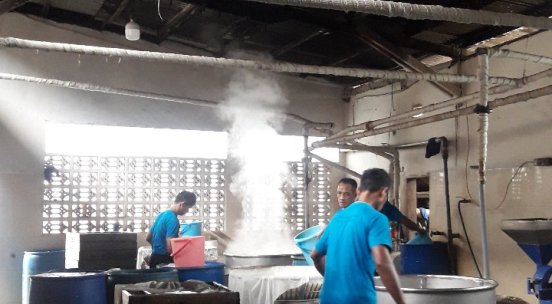
New paper published! Energy audits in the tofu industry; an evaluation of energy consumption towards a green and sustainable industry
BioResources and Technology Division (BRT) junior researcher and PhD student Lydia Mawar Ningsih and BRT Director Assoc Prof. Dr. Hynek Roubík recently published an article! This study explores the energy audit approach for micro, small, and medium enterprises (MSMEs) in the tofu industry in Indonesia. It focuses on four key areas of energy use: cooking, grinding, utilities, and human energy. The study also examines water consumption and wastewater generation during tofu production. Data was collected from 40 tofu industries in Bandar Lampung city, Indonesia.
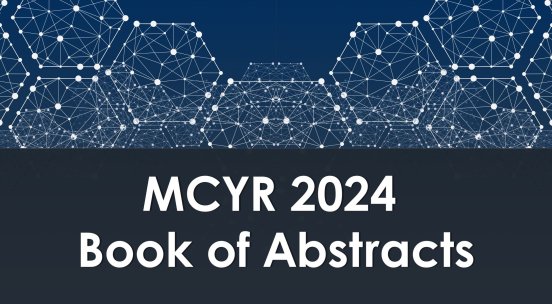
MCYR 2024 Book of Abstracts
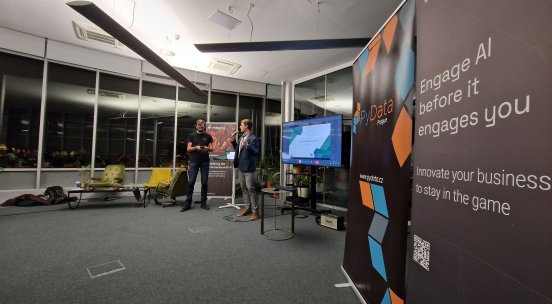
Harnessing Neural Networks for 21st-Century Agriculture
At BRT, we’re passionate about driving sustainable innovation in agriculture through cutting-edge technologies. Recently, BRT junior researcher and PhD student Adam Hruška had the opportunity to speak at an event centered on the power of AI in promoting sustainable practices and advancing modern agriculture. Here are his first account insights!
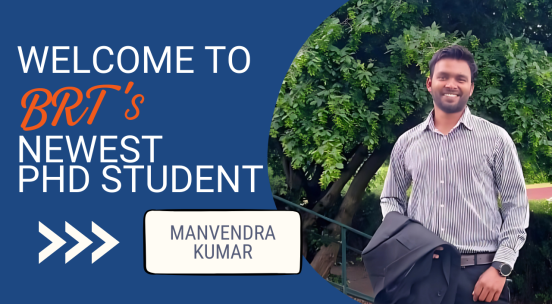
Introducing BRT’s new PhD student - Manvendra Kumar
Recently, the BRT welcomed new PhD student Manvendra Kumar. Read all about his firsthand account detailing his background and aspirations below! It all started with a question: What if waste could power our future? Growing up in India, where cultural diversity thrives alongside environmental challenges, I was often struck ?by the contrast between human activity and its impact on nature. This curiosity shaped my academic choices and led me to explore the intersection of waste management and renewable energy. Fast forward to today, I am a first-year PhD student in the BioResources and Technology (BRT) Division at the Czech University of Life Sciences, Prague (CZU). My journey to this point has been filled with challenges, breakthroughs, and a lot of learning—but the goal remains constant: to make renewable energy accessible and sustainable for everyone.

Meet our winter intern – Zoe Cilento!
To broaden and develop our teams’ collaborative skills while offering visiting students the chance to expand their scientific networks and gain cultural experiences, BRT encourages students to join our team for internship opportunities. These internships aim to facilitate idea exchange, foster professional growth, and create opportunities for collaboration.
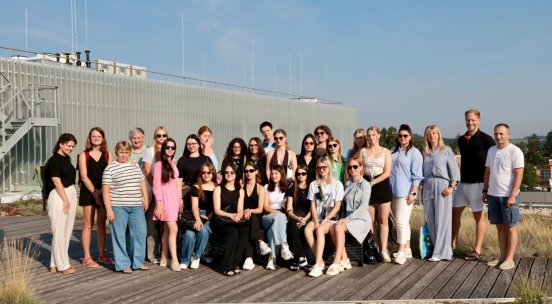
Fostering Collaboration: Sumy National Agrarian University and Mendel University visit to CZU
As part of the ongoing partnership between the Czech University of Life Sciences Prague (CZU) and Mendel University (MENDELU) in Brno, the BioResources and Technology (BRT) Division was delighted to welcome a delegation from Sumy National Agrarian University, Ukraine. This visit, part of the initiative "Strengthening the Capacities of Public Higher Education Institutions in Ukraine," aimed to foster academic and research collaboration through hands-on experiences and cultural exchange
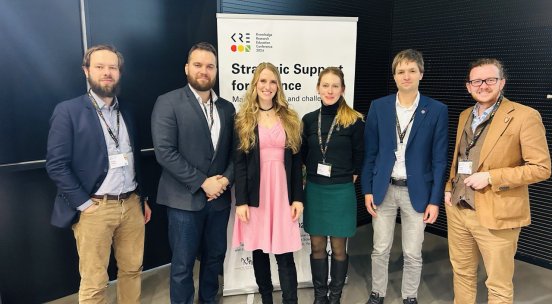
KRECon Conference: Strategic Support for Science - Directions and Challenges
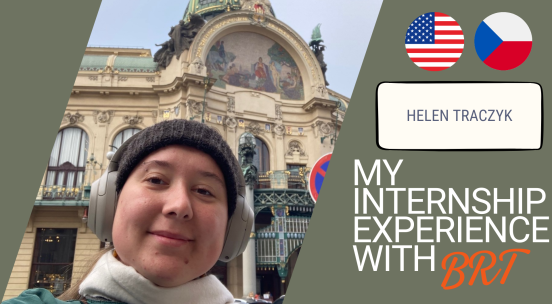
Visiting Internship Insights: Career Growth and Cultural Exploration with BRT
To broaden and develop our teams’ collaborative skills while offering visiting students the chance to expand their scientific networks and gain cultural experiences, BRT encourages students to join our team for internship opportunities. These internships aim to facilitate idea exchange, foster professional growth, and create opportunities for collaboration.
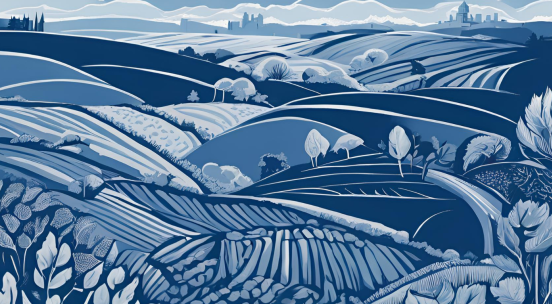
Ukraine's Food Security Landscape: A Policy Approach
The Agri Policy lab has released a new innovation-focused Policy Paper 2024/09, titled "Ukraine, its Food Security, and Future?" It analyses the current state of food security in Ukraine, addressing its agricultural potential and the numerous challenges that hinder the food system. As Ukraine continues to face multitude of challenges triggered by the full-scale Russian invasion, the perspective of food security paradigm should not only map its influence on the global food supply
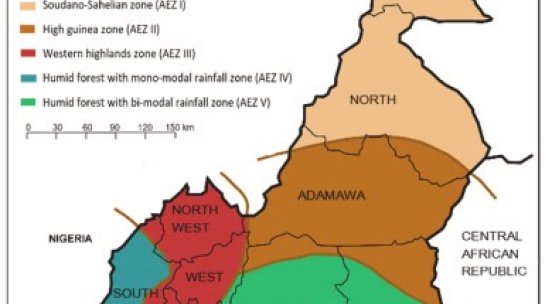
New paper published! Economic viability and factors affecting farmers’ willingness to pay for adopting small-scale biogas plants in rural areas of Cameroon
BioResources and Technology Division (BRT) researcher Chama Theodore Ketuama and BRT Director Assoc Prof. Dr. Hynek Roubík recently published an article! Disseminating modern energy to resource-poor countries contributes to achieving development objectives such as reducing poverty, access to drinking water, improving health and education, empowering women, and increasing food production. To enable wider use of this modern energy, investments must demonstrate profitability, and consumers must exhibit a willingness to bear the associated costs.
Rural areas of Cameroon are often reliant on traditional energy sources such as firewood and kerosene for cooking and lighting. Biogas offers a cleaner, more efficient, and potentially cheaper alternative. Organic fertiliser from the biogas production process can also be used to improve soil fertility. Given that the adoption of small-scale biogas plants partly depends on the inherent profitability and farmers' willingness to pay, this study provided answers to the following questions.
- Is biogas an economically viable clean energy option for rural areas in Cameroon?
- Are farmers willing to pay for the small-scale biogas plants?
This study provides valuable insights for rural farmers, policymakers, and investors to inform decision-making on promoting biogas technology in rural Cameroon.
Keywords: Biogas; benefit-cost ratio; sensitivity analysis; willingness to pay; clean energy; Cameroon
Citation: Ketuama, C.T., Roubík, H. Economic viability and factors affecting farmers’ willingness to pay for adopting small-scale biogas plants in rural areas of Cameroon. Renewable Energy, 230, 2024, 120895. Doi: 10.1016/j.renene.2024.120895
For more details on BRT, follow us on social media for regular updates and highlights.
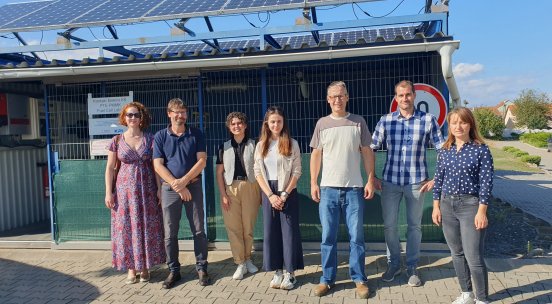
H2SCALE Project Kick-off Meeting - Hydrogen Integration and Regional Collaboration
The H2SCALE project officially launched with a kick-off meeting hosted by the Faculty of Economics at the University of Pécs, Hungary. This foundational event brought together partners from the Czech Republic, Germany, Slovenia, and Hungary to discuss the shared vision and strategic goals for advancing hydrogen technologies, renewable energy systems, and sustainable mobility solutions. The H2SCALE project focuses on building a robust foundation for hydrogen ecosystems across regions
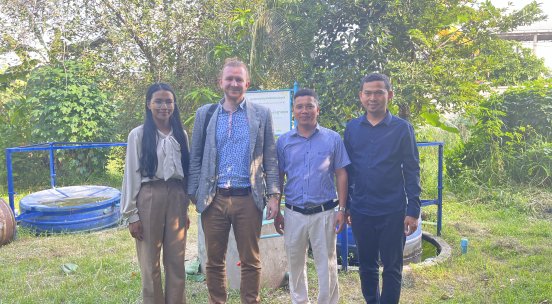
Conclusion of the V-Soil Project in Cambodia
BRT Director, Assoc. Prof. Dr. Hynek Roubik, recently traveled to Pursat, Cambodia, to participate in the culmination of the Vermiculture Based Sustainable Organic Innovative Livelihood (V-Soil) Project. This transformative initiative was a collaboration between ADRA Cambodia, the Pursat Provincial Departments of Agriculture and Commerce, and various international partners including the Czech University of Life Sciences Prague.
The closing event, held at the Pursat Provincial Department of Commerce’s meeting hall, was attended by 71 participants, including government officials, agricultural experts, and local stakeholders. The meeting focused on sharing the results of the V-Soil Project and discussing sustainability strategies for the future. Multiple officials expressed their support of the project and stated their commitment to supporting farmers in their goal of a more sustainable future in Cambodia.
Overall, the V-Soil project provided farmers with skills and resources to implement vermiculture-based sustainable practices to boost yields, reduce environmental impact, and inspire future generations. It’s a movement which redefined agriculture while planting seeds for a greener Cambodia!
Additional resources:
- BRT field visit blog: HERE
- Pursat Television local media coverage: HERE
- ADRA press release: HERE
- ADRA Cambodia project video: HERE
For more details on BRT, follow us on social media for regular updates and highlights.
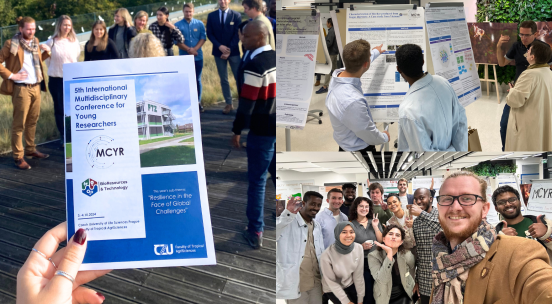
Highlights from MCYR 2024
The 5th International Multidisciplinary Conference for Young Researchers (MCYR) 2024 conference, held at the Faculty of Tropical AgriSciences, Czech University of Life Sciences Prague (CZU), gathered young researchers worldwide for an engaging and collaborative exploration into Resilience in the Face of Global Challenges (this year’s theme). Organized by the BRT, MCYR 2024 created an inclusive environment where attendees could share research findings, exchange ideas, and build networks that cross disciplinary boundaries, reflecting the need for unified action in today’s globalized world.
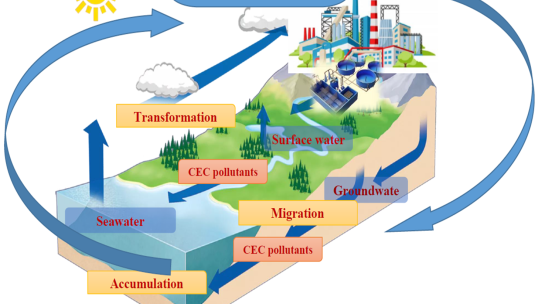
New paper published! Risk Assessment as a Tool to Improve Water Resource Management
BioResources and Technology Division (BRT) senior researcher Assoc Prof. Dr. Yelizaveta Chernysh and BRT director Assoc Prof. Dr. Hynek Roubík recently published an article in Water Resources Management. Today, water ecosystems are threatened by water pollution problems (e.g. eutrophication, micropollutants, microplastics, etc.), increasing water demand, and increased probability of extraordinary events (e.g., fish poisoning, floods, etc.). When bodies of water become contaminated, their value for fisheries diminishes, and they may no longer meet the requirements for agricultural use, thereby disrupting key ecosystem services.
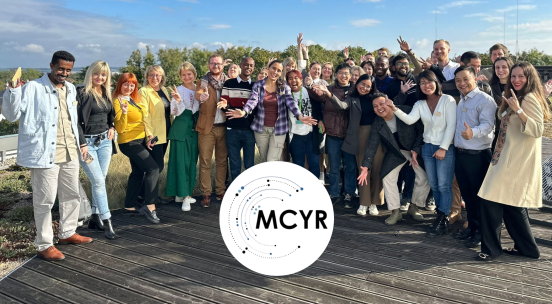
Out Now! The MCYR 2024 Recap Video
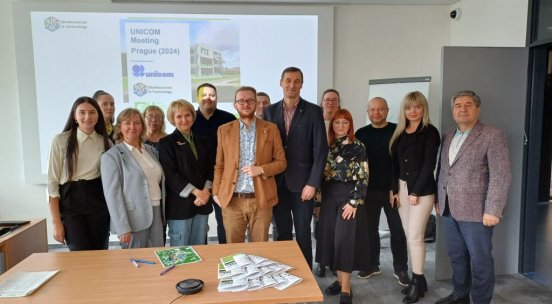
UNICOM Study visit to the Czech University of Life Sciences
From October 1 to October 4, 2024, representatives of the Universities—members of the consortium implementing the ERASMUS +KA 2 CBHE project “Universities Communities: strengthening cooperation” UNICOM N.101083077—familiarized themselves with the activities of the Czech University of Life Sciences (Prague, the Czech Republic).
During the study visit, there was an active exchange of experience regarding the ways to implement the third mission of Universities and the role of Universities as “catalysts” of positive changes in their communities and society. The event participants considered the strategies, initiatives and partnerships that had enabled the Czech University of Life Sciences in Prague to make a significant impact on the life of the local community.
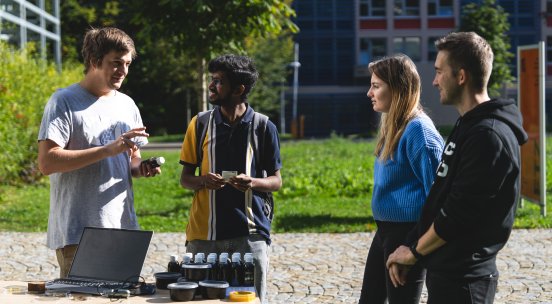
Promoting Sustainability: Vermicomposting Workshop at European Sustainable Development Week
As part of the European Sustainable Development Week, BRT members Ing. Jan Staš and Ing. Marek Jelínek organized an interactive workshop on vermicomposting at the Faculty of Tropical AgriSciences at the Czech University of Life Sciences Prague. The workshop focused on showing participants how to start and manage their own vermicompost systems. Composting, particularly vermicomposting, is a key practice in the transition towards sustainability. By turning organic waste into compost, we can reduce the amount of waste sent to landfills, and produce nutrient-rich fertilizer that supports plant growth. Vermicomposting, which uses worms to break down organic matter, is one of the most efficient ways to recycle organic waste, producing a high-quality compost in a relatively short amount of time.
During the workshop, participants gained hands-on experience through learning about the types of materials suitable for vermicomposting, how to manage the composting process, and solutions for troubleshooting common issues. In addition to the practical demonstrations, Jan and Marek showcased BRT’s own product, BRTea. BRTea is a worm tea, an organic fertilizer made from our own composting systém. It will soon be available for purchase at the CZU store, offering an eco-friendly solution for nourishing plants – stay tuned!
This workshop is part of the ongoing effort to promote sustainability at CZU and our team plans to continue to offer similar events in the future. By raising awareness and providing practical tools, we aim to foster a culture of environmental responsibility and inspire more sustainable action within our university community and beyond!
For more details on BRT, follow us on social media for regular updates and highlights.
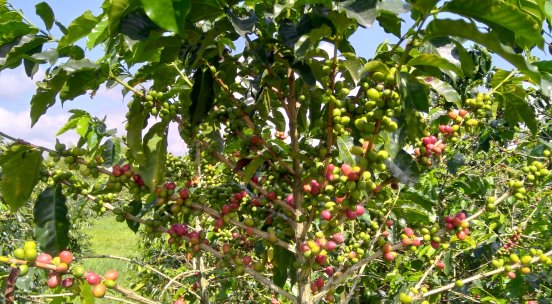
Transforming Coffee Quality in Laos: A Journey into Sustainable Innovation
BRT Affiliated Researcher, Dr. Eduardo Duque Dussán, recently embarked on a research trip to Pakse, Laos, to assess the capacity of a cutting-edge coffee processing facility. Enjoy reading his firsthand recollection of the trip!
Laos, a country renowned for its tranquil landscapes, rich cultural heritage, and the warm hospitality of its people, was the destination of my latest research trip. I travelled to Pakse, a city in southern Laos, to assess the capacity of a Japanese-Australian company to implement and build a wet coffee processing facility. Currently relying on natural processing, the company aims to enhance the quality of its coffee by transitioning to wet processing methods.
The 10-hectare farm provided the perfect setting for this innovative project. Our approach was to start with processing 25% of the farm's wet production, ensuring a gradual and manageable transition. This step-by-step method allows careful monitoring and adjustments, paving the way for a successful implementation. Our collaboration was fruitful and paved the way for future educational opportunities. The project will facilitate internships and research projects for students, fostering a new generation of experts in sustainable coffee processing.
My journey began in Pakse, a city that quickly captivated me with its vibrant markets, ancient temples, and the serene flow of the Mekong River. The local cuisine was a delightful adventure, with dishes like laap (a traditional Lao meat salad) and tam mak hoong (green papaya salad) showcasing the rich flavours of Lao culinary traditions. The natural beauty of Laos is truly enchanting. As I traversed to the coffee farm, I was greeted by rolling hills covered with coffee plants, interspersed with lush greenery and occasional waterfalls. The fresh, crisp air carried the subtle fragrance of coffee blossoms, providing a serene backdrop to the hard work of the local farmers.
At the farm, the team warmly welcomed me, their passion for coffee and commitment to sustainability was inspiring. We conducted a thorough evaluation of their current processing methods. We discussed the benefits and challenges of transitioning to wet processing. This method, known for enhancing the cup profile of coffee, requires careful implementation to ensure quality and consistency. The project's phased approach allows the farm to gradually adapt to the new process. Starting with 25% of the wet production, we can monitor results, make necessary adjustments, and scale up in subsequent phases. This careful strategy ensures the transition enhances the coffee's quality without overwhelming the farm's resources.
In addition to the technical aspects, our discussions often extended into the evenings, where we shared meals and stories with the local team. Their warmth and hospitality made me feel at home, turning professional collaboration into genuine friendship. These moments underscored the importance of human connection in any project, reminding us that our efforts are not just about technological advancement but also community and shared growth. As my time in Laos came to an end, I reflected on the successful cooperation and its potential for the future. The project aims to elevate the quality of coffee produced and provide invaluable learning opportunities for students. We are investing in the next generation of sustainable coffee processing experts by enabling internships and research projects.
Leaving Pakse, I carried a sense of accomplishment and deep gratitude for the shared experiences and the friendships forged. The verdant landscapes, delicious food, and genuine warmth of the Lao people made this trip unforgettable. In Pakse's beautiful settings and among its kind-hearted inhabitants, I found not just a place of work but a source of inspiration and hope for sustainable development. As I return home, I am reminded of the profound impact of our collaborative efforts. Together, we are enhancing coffee quality and sowing the seeds of sustainable practices and educational opportunities that will benefit future generations. This journey to Laos has reaffirmed my belief in the power of knowledge, cooperation, and the human spirit to create meaningful and lasting change.
Author: Dr. Eduardo Duque Dussán
For more details on BRT activities, subscribe to our newsletter or follow us on social media for regular updates and highlights.
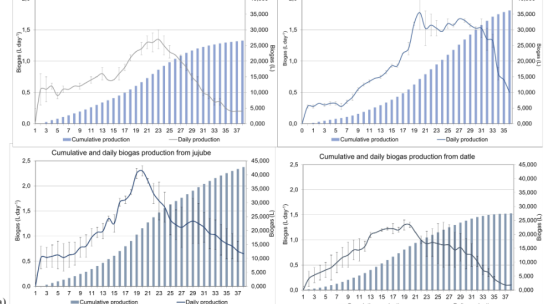
New paper published! Utilizing Citrus, Date, and Jujube Wastes for Biogas Production
The Czech University of Life Sciences Prague researchers and BioResources and Technology Division (BRT) members Dr. Viktoriia Chubur, Dr. Ghaith Hasan, Assoc Prof. Dr. Yelizaveta Chernysh and Assoc Prof. Dr. Hynek Roubík recently published an article in Biofuels, Bioproducts and Biorefining.
Agricultural waste offers a promising resource for biogas production, and our latest research delves into this potential by focusing on citrus, date, and jujube substrates. Conducted under mesophilic conditions, this study evaluates the anaerobic digestion process and its effectiveness in generating biogas, providing a sustainable energy solution and addressing waste management issues.
This study explores how citrus, date, and jujube wastes can be used for sustainable energy production through anaerobic digestion. In regions like Syria, agricultural residues are abundant but underutilized. Our research highlights how these organic wastes can be converted into valuable biogas, promoting environmental sustainability and offering an alternative energy source.
Citrus Waste: Even with compounds like limonene that inhibit digestion, citrus waste remains possible for biogas production. Among the experimental ratios citrus to inoculum, better results were obtained at a ratio of 30:70.
Jujube Waste: This substrate showed higher potential for biogas and methane production among the tested substrates, especially with a 20:80 jujube-to-inoculum ratio.
Date Waste: While yielding slightly less biogas than jujube, date waste still presents a significant opportunity for methane production.
Discussion Highlights:
- Substrate Composition: The study emphasized how different compositions of waste impact biogas yields. Jujube waste, rich in cellulose and hemicellulose, was more effective than citrus and date wastes with the same ratio.
- Methane Production: The research emphasized that the methane yield varied significantly with different substrate ratios, showing the importance of optimizing these ratios.
- Inhibitory Effects: Citrus waste presented challenges due to limonene, a compound that can slow down biogas production. However, by using specific substrate-to-inoculum ratios and pretreatment methods, these effects can be mitigated. Interestingly, jujube waste, despite its phenolic compounds, demonstrated better biogas production capabilities, making it a promising waste for anaerobic digestion.
This study demonstrates that agricultural residues such as citrus, date, and jujube waste can be effectively used for biogas production, contributing to sustainable waste management and renewable energy generation in Syria.
Citation: Chubur, V.; Hasan, G.; Kára, J.; Hanzlíková, I.; Chernysh, Y.; Sedláček, J.; Wang, J.; Roubík, H. Utilization of citrus, date, and jujube substrates for anaerobic digestion processes. Biofuels, Bioproducts and Biorefining. https://doi.org/10.1002/bbb.2665
For more details on BRT, follow us on social media for regular updates and highlights.
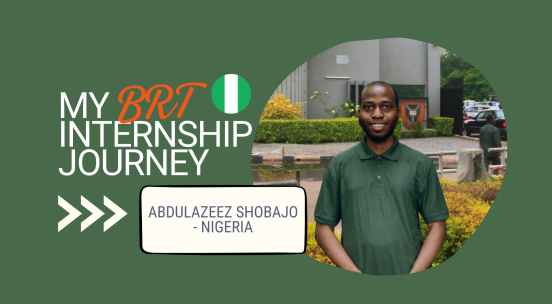
Different Shades of Sustainable Environmental Practices: My Internship at the University of Ibaden, Nigeria
To broaden and develop the professional skills of our team members and widen their scientific network and cultural experiences, the BRT encourages its students to embark on internships. These internships are connected to their scientific journey and enable them to have hands-on, practical and in-field experiences, which are critical to their future careers. The internships help to hone their communication, time management, teamwork, problem-solving, and leadership skills, all of which are highly valued assets in young scientists.

New paper published! Modified Broth for Screening Anti-Yeast Activity in Juices
The Czech University of Life Sciences Prague researchers and BioResources and Technology Division (BRT) members Ing. Jan Staš, Prof. Ing. Jan Banout, Ph.D., and Assoc.Prof. Dr. Hynek Roubik recently published an article in Life (section Microbiology, Special Issue Food Microbiological Contamination). They have developed an innovative method to analyse the anti-yeast activity of natural compounds in fruit juices. This new approach not only promises to enhance the screening of the antimicrobial potential of natural compounds in beverages but also aligns with the growing consumer demand for natural food preservatives by discovering new candidates for juice preservation.
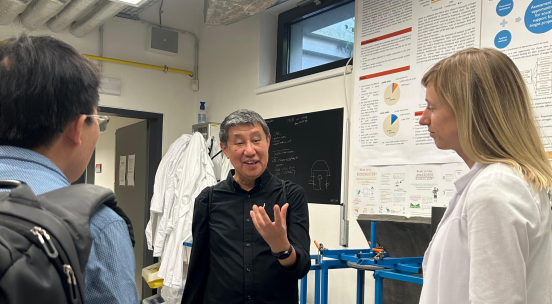
Advancing Research Collaboration for Sustainable Solutions with ITB
The Faculty of Tropical AgriSciences (FTZ) recently had the honor of hosting Prof. Tjandra Setiadi from the Department of Chemical Engineering of Institut Teknologi Bandung (ITB). The purpose of this visit was to strengthen the bonds of friendship and explore opportunities for collaboration with the BioResources and Technology Division (BRT) team. During the discussions, several key areas of cooperation emerged, the application of bioprocess engineering in tackling industrial wastewater challenges, the production of biopolymers and lignocellulosic enzymes, and the development of bio-based products. This collaboration promises to open new doors for joint research and innovative solutions in sustainable technologies.
We look forward to this new cooperation, strengthening research ties between Indonesia and the Czech Republic!
For more details on BRT activities, subscribe to our newsletter or follow us on social media for regular updates and highlights.
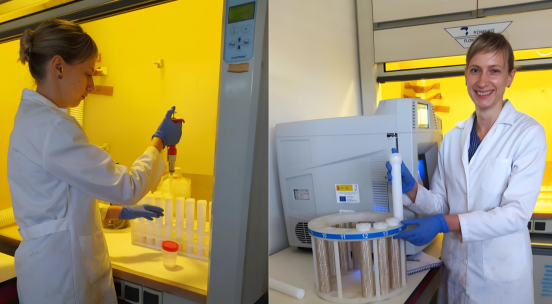
Training in phosphogypsum analysis at the University of Huelva
BRT Senior Researcher, Assoc. Prof. Dr. Yelizaveta Chernysh recently had the opportunity to attend a training in Huelva, Spain to learn modern methods of phosphogypsum analysis with Prof. Jose Miguel Nieto Linán’s team, the Environmental Mineralogy and Geochemistry Unit, at the University of Huelva. The teams main research activities are aimed at investigating the sources and pathways of industrial and mining pollution in terrestrial, riverine and estuarine systems. The team is consistent of an interdisciplinary team with expertise in mineralogy, geochemistry, ore deposits, hydrogeology and ecotoxicology. They have many years of experience in studying the environmental impacts associated with the exploitation of massive sulfide deposits in the Iberian pyrite belt (found in Southern Spain). Recent projects in this area have focused on the development of laboratory tests and pilot field plants for the treatment of mining waste, the recovery of essential raw materials from mining waste, and regional studies on the dispersion and attenuation of pollutants in river and estuarine systems (Tinto, Odiel and Guadiana River basins). They are also studying the elemental composition of phosphogypsum.
The training, which was partly motivated by the environmental contamination in Huelva, where waste infiltrates local water systems, gave Dr. Chernysh the opportunity to broaden her expertise in addressing such environmental issues. Specifically, she conducted sample preparation of Ukrainian phosphogypsum. In addition, she familiarized herself with the inductively coupled plasma (ICP) analysis protocol—a powerful technique used for detecting and measuring the concentration of metals and non-metals in samples. Moreover, Dr. Chernysh participated in actual sample analysis during the training, contributing to data that will inform future research. This data will play a vital role in the preparation of a scientific article, showcasing her growing expertise in this field and her contribution to important environmental research.
Thank you to Prof. Jose Miguel Nieto Linán and his research team for providing support and equipment for the training and we look forward to future collaboration!
This cooperation is based on the joint ERA-MIN3 action project - Phosphogypsum Processing to Critical Raw Materials (PG2CRM), which received funding from the European Union within the Horizon 2020 program. This training exists within the framework of the project "Phosphogypsum as a mineral resource for bioprocesses". Dr. Chernysh also acknowledges the support of the Marie Skłodowska-Curie Postdoctoral Fellowship (MSCA-PF) with funding from the European Union under the MSCA4Ukraine framework.
For more details on BRT activities, subscribe to our newsletter or follow us on social media for regular updates and highlights.
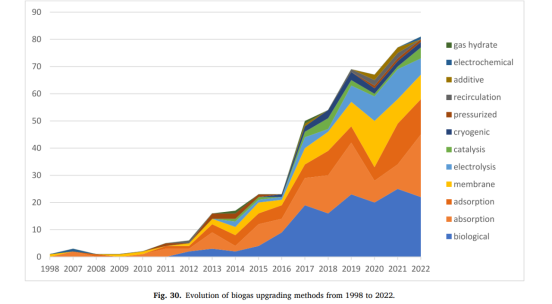
New paper published! A call for modernisation of science, the case of anaerobic digestion: A scoping review
Anaerobic digestion is an important renewable energy technology that has the potential to reduce greenhouse gas emissions and contribute to the development of a sustainable energy system. However, as in many research fields, the research is extensive and fragmented, making it difficult to gain a comprehensive understanding of the technology and hindering progress.
Therefore, we concluded a large scoping review of the entire technology, from pretreatment to gas utilization, using a systematic PRISMA protocol, aiming to provide a comprehensive overview of the anaerobic digestion process. In addition, this research serves to highlight issues in the current research environment, to identify limitations. This information can serve as the basis for future standardization of work to increase the efficiency of biogas research.
In this paper, we highlighted multiple issues. For one, the field suffers from a lack of standardization in reporting and no clear definitions for certain terms. This leads to confusion and issues classifying information. This problem is only exacerbated by an exponential growth in published research which indicates a larger issue in science.
Overall, there is an urgent need to harmonize work and facilitate knowledge transfer to go beyond the traditional paper system. We need to transition to a more updatable and modular workflow using modern technologies for the increase in the standards for accessibility and visibility of work. By using open science and working with modern scalable database systems, science could benefit by reducing the burden on researchers and facilitating progress.
Citation: Bercy, A.; Roubík, H. A call for modernisation of science, the case of anaerobic digestion: A scoping review. Energy Conversion and Management. 2024. 316. https://doi.org/10.1016/j.enconman.2024.118816.
BRT Authors: Ing. Antoine Bercy and Assoc. Prof. Dr. Hynek Roubík
For more details on BRT activities, subscribe to our newsletter or follow us on social media for regular updates and highlights.
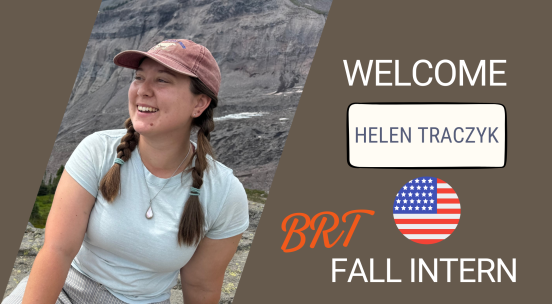
Meet our fall intern - Helen Traczk!
To broaden and develop our teams’ collaborative skills while offering visiting students the chance to expand their scientific networks and gain cultural experiences, BRT encourages students to join our team for internship opportunities. These internships aim to facilitate idea exchange, foster professional growth, and create opportunities for collaboration.
Meet our fall intern joining our team from the United States, Helen Traczyk!
Hi there, my name is Helen Traczyk. I recently graduated with a B.A. in Environmental Studies from Lewis and Clark College in Portland, Oregon. I grew up in Chicago, Illinois and currently live in Portland. I have a particular interest in using urban planning and sustainable public transportation to make cities great places to live!
My undergraduate program was an interdisciplinary approach to environmentalism, mostly based in humanities. I learned about environmental theory, policy, and research. For my senior thesis, I researched public transportation at my college and the reason behind why it was so difficult to reduce the number of students who came by car. I am particularly interested in the socioeconomic reasons behind environmental problems and believe that the environment includes people too! Understanding how and why people interact with the world around them is crucial in creating a sustainable and healthy world.
Outside of school and work, I am absolutely brimming with interests and hobbies. Right now, I do arts and crafts like sewing, knitting, drawing, and painting. Like other Portlanders, I spend a lot of time outdoors hiking, camping, and gardening. I also sing in my college’s community choir and have played classical piano for fifteen years. In the evenings, I love to read and watch rom coms.
I am very excited to be a part of the BioResources and Technology Division (BRT) this fall. I am especially looking forward to digging into each team members specific research. As an environmentalist, I am amazed at the many ways people from all over the world are working to create a more sustainable future. One of my goals as an intern here is to learn where I want to go next in my career, so being able to learn from all the members of the team is a fantastic opportunity.
During my time as an intern, I will primarily be assisting the Communications team while also shadowing various team members to see how the research group functions as a whole. I’m looking forward to learning a lot!
For more details on BRT activities, subscribe to our newsletter or follow us on social media for regular updates and highlights.
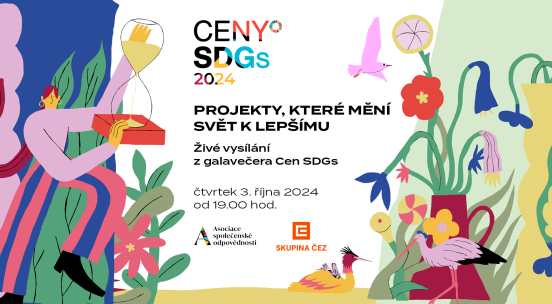
Projekty ČZU mezi finalisty Cen SDGs 2024
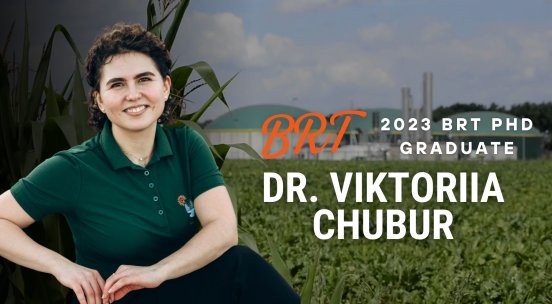
Introducing our 2023 PhD graduate, Dr. Viktoriia Chubur
Dr. Viktoriia Chubur earned her Ph.D. in Environmental Protection Technology under the supervision of Assoc. Prof. Dr. Yelizaveta Chernysh (Sumy State University (Ukraine)) and Assoc. Prof. Dr. Hynek Roubik (Czech University of Life Sciences Prague). Her research focused on waste utilization technologies, biogas technologies, anaerobic fermentation, and mitigating environmental impact. Her research topic was ‘Environmentally safe utilisation of waste for energy purposes in environmental protection technologies’.
Dr Chubur has coauthored 10 scientific publications, participated actively at international conferences, and participated in 4 internships during the 3 years of her doctoral studies. She has been a member of the BRT at the Czech University of Life Sciences Prague and the Head of the TeSET Faculty Scientific Association at Sumy State University (Ukraine) since the first year of her studies.
To get more insights into Dr. Chubur‘s academic journey, our BRT Communications team conducted an interview to capture her thoughts and share her story.
ENJOY THE INTERVIEW!
Question 1: How does it feel to have successfully defended your doctoral dissertation?
Dr. Chubur: It brings a sense of freedom and confidence in the next steps in my research career. The defence is a milestone that summarises the set of skills I’ve acquired as a young scientist.
Question 2: Can you share pivotal moments from your academic journey that you believe were crucial in successfully defending your doctoral dissertation?
Dr. Chubur: The internships I completed were a valuable experience that allowed me to work and train in laboratories across Germany, Austria, the Czech Republic, and Ukraine. Building skills and gaining diverse experience bolstered my abilities as a successful researcher. Maintaining good connection and cooperation with my supervisors was also crucial for guidance and in supporting my research throughout my PhD studies.
Question 3: Reflecting on the process, what were the significant challenges you encountered while writing your dissertation and defence phases, and how did you navigate through them?
Dr. Chubur: My personal challenge was time management during the final manuscript writing and defence preparation stages. Time is always scarce, but it also forces efficiency in writing and structuring work. Planning and support from colleagues in organizing the initial stages helped me meet all the deadlines.
Question 4: Balancing academic commitments, personal life, and other responsibilities can be demanding. How have you managed to strike that balance while working on your dissertation?
Dr. Chubur: I struggled with this during my PhD, as I usually put off personal matters until a later time due to being extremely focused with the tasks relating to my studies. However, it was important for me to realize that there is no limit to perfection and to start rationally evaluating my tasks. With the start of the full-scale Russian invasion of my home country, Ukraine, in February 2022, I was presented with the reality of focusing all my attention on the safety of my loved ones. Everything changed at this point, and I was forced into needing to distinguish between work and my primary priorities.
Question 5: What valuable advice would you offer for fellow doctoral candidates preparing for their dissertation defence?
Dr. Chubur: Focus on presenting achievements that have already been critically evaluated and hold value (because they were presented and reviewed a few times before). Pay attention to the personal experience gained throughout your Ph.D., as it is invaluable, and do not put yourself down in comparison to others.
Question 6: Do you have any recommendations for current and future BRT students?
Dr. Chubur: I recommend pursuing internship opportunities as much as possible. Since your research is still in progress, you can get insights and evaluations from specialists in your field. It can shape the direction of your research or provide interesting ideas to expand your scope.
Question 7: Now that you have reached this momentous achievement - What are your plans for the future?
Dr. Chubur: My focus for the future is on applying my expertise in more practical ways through projects with tangible outcomes. Additionally, I'm committed to further developing my skills with the aim of sharing my experiences with others through mentorship or teaching. I currently work at BRT as a postdoctoral researcher, where I see myself working for the foreseeable future.
We thank Dr. Chubur for sharing insights into her academic journey and wish her success, new discoveries, and a continued sense of fulfilment in his future endeavours!
Viktoriia is now the BRT lab coordinator and a post-doctoral researcher! With her extensive knowledge, dedication, and passion for advancing scientific innovation, she has already proven to be an invaluable asset to our team. We are confident that her leadership and expertise will drive our lab’s research forward in exciting new directions. A huge thank you to Viktoriia for her unwavering hard work!
For more details on BRT activities, subscribe to our newsletter or follow us on social media for regular updates and highlights.
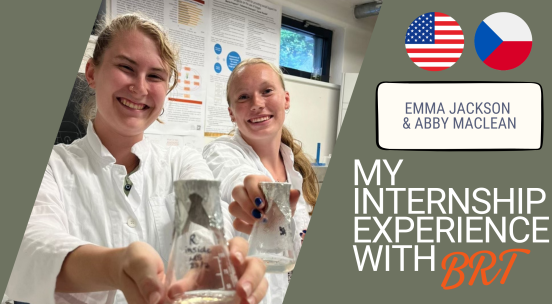
Visiting Internship Insights: Scientific Growth and Cultural Discovery with BRT
To broaden and develop our teams’ collaborative skills while offering visiting students the chance to expand their scientific networks and gain cultural experiences, BRT encourages students to join our team for internship opportunities. These internships aim to facilitate idea exchange, foster professional growth, and create opportunities for collaboration.
Recently, we hosted two interns, Abby MacLean and Emma Jackson, students from the United States, currently pursuing bachelor’s degrees in mathematics/economics and evolutionary biology. Read their introductory blogs here : Abby & Emma.
Enjoy reading about their experience with BRT!
During our time at BRT, we were able to take part in many aspects of the work that BRT accomplishes. For example, we spent many hours in the lab completing different experiments. Within our first few weeks, we got to learn how to take measurements for two different biogas experiments in addition to setting one up from the beginning with Viktoriia. We also were able to help Viktoriia and Stacy begin a growing experiment to test the fertilizing properties of phosphogypsum. We are so grateful for the opportunities to learn and participate in actual experiments. We were also lucky enough to be able to attend the antelope handling at the university’s farm and partake in the sample preparation in the lab from the collected samples.
Another major aspect of our work was with Stacy, Viktoriia, and Masha for BRT communications. We took part in creating videos and social media campaigns. For example, we created educational videos for the agri-policy and bioeconomy labs to promote this part of BRT’s work. We also created a social media campaign the 5th International Multidisciplinary Conference for Young Researchers (MCYR) that included information about sessions, abstract submissions, and workshop submissions to draw the public to apply and participate in this conference.
We also had the opportunity to collaborate with BRT PhD students on their research. This included research about food security and the economic consequences and implications of biogas plants in the Global South. It was such an enriching opportunity to get to work with BRT members on topics related to their research as we gained a better understanding of the research process in academia. Additionally, the topics were very intriguing, and we are so grateful to have had the opportunity to learn more about these disciplines.
Overall, we gained exposure to the academic research process in general. This was very useful for us as we both are considering pursuing PhDs in our respective fields. It was invaluable to learn more about what the day-to-day looks like for researchers and PhD students. Also, we learned about the process and what it takes to get published. We gained exposure to EU-funded projects. It was very new to us to witness the collaboration from universities from many different countries work together on a common project and goal. This experience gave us much appreciation for collaboration on research and provided us with a first-hand understanding of what it entails.
From Emma:
The experience I have gained at this internship is incredibly invaluable. It has been incredible to get to work directly in a lab with a few different kinds of experiments and gain practice with science dissemination. This work will help both in my applications towards a PhD, but also in the career in research, I hope to continue to a post-doc.
From Abby:
My internship experience at BRT will be very beneficial to my future career. My goal is to pursue a PhD in Economics with a focus on the mathematical nature of economics. The experience with data management that I gained while here has solidified my interest in the field. My time at BRT has made me more confident that I want to pursue a PhD as I enjoyed being exposed to research executed by the team. I was also able to improve my scientific background and understanding which has increased my interest in interdisciplinary research.
We are so grateful to everyone at BRT for welcoming us this summer! We will never forget our experience here, which will be invaluable towards our future careers. We also feel so lucky to have spent the past two months in Prague, it is an amazing city with so much to offer!
For more details on BRT activities, subscribe to our newsletter or follow us on social media for regular updates and highlights.
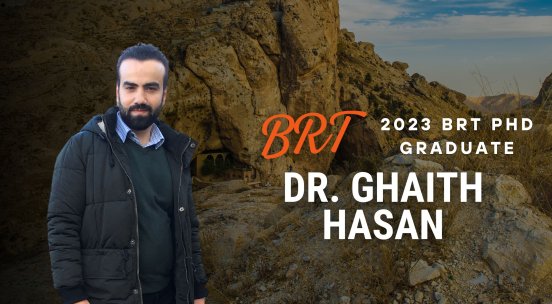
Introducing our 2023 PhD graduate, Dr. Ghaith Hasan
Dr. Ghaith Hasan earned his Ph.D. in Sustainable Rural Development at the Czech University of Life Sciences Prague, under the BioResources & Technology Division (BRT). His research aimed to provide a comprehensive assessment of the prospects and challenges of biogas technology in Syria. His research topic was ‘Social and economic assessment of small-scale biogas plants in the developing world: A case of Syria’. He has co-authored/published 2 scientific publications and participated actively at international conferences and in 2 internships during his doctoral studies.
To get more insights into Dr. Hasan's academic journey, our BRT Communications team conducted an interview to capture his thoughts and share his story.
ENJOY THE INTERVIEW!
Question 1: How does it feel to have successfully defended your doctoral dissertation?
Dr. Hasan: Successfully defending a doctoral dissertation is a significant academic milestone. After a long, intense period of work and study, I feel proud as I have contributed to meaningful research in my field. Generally, finishing a Ph.D. degree is an achievement that opens new opportunities in academia or industry. It's also a time for reflection on personal and professional growth, coupled with gratitude for the support of my supervisor, BRT director Hynek Roubik, and loved ones.
Question 2: Can you share pivotal moments from your academic journey that you believe were crucial in successfully defending your doctoral dissertation??
Dr. Hasan: A pivotal moment of my academic journey was going to Syria several times to conduct research. It was not easy to go to remote areas and collect data under complex circumstances. While this was the cornerstone of my research, and led to some difficulties, Assoc. Prof. Dr. Roubik and Dr. Mazancova were my essential supporters leading to my final defence being a beautiful memory that I will carry with me throughout my life.
Question 3: How has this achievement influenced your overall experience and professional growth??
Dr. Hasan: In general, earning a Ph.D. fosters expertise, research and analytical skills, and networking opportunities. The degree cultivates independence, problem-solving, and adaptability, overall enhancing one's professional credibility. With teaching experience, a strong publication record, and diverse career options, a Ph.D. journey also fuels personal growth, resulting in a resilient and confident individual.
Question 4: Reflecting on the process, what were the significant challenges you encountered during your dissertation's writing and defence phases, and how did you navigate through them??
Dr. Hasan: The main challenges I faced came from conducting research in a country subject to civil war. Due to an unsteady security situation, it was not easy to obtain security approvals to conduct the research. This was difficult as the road to the villages and towns for data collection were not the safest. In addition, there were power outages for twenty hours of the day and it was tough to charge electronics and analyze data Lastly, the financial cost was large due to multiple trips to conduct research.
Question 5: Balancing academic commitments, personal life, and other responsibilities can be demanding. How have you managed to strike that balance while working on your dissertation??
Dr. Hasan: Obtaining a doctorate degree was my ultimate goal, something I dreamed of throughout my life. I thank God for blessing me with an understanding and supportive wife and my family for their trust and support along the way. It was not easy considering the obligations, but nothing comes without sacrifice and a price.
Question 6: What valuable advice would you offer for fellow doctoral candidates preparing for their dissertation defence??
Dr. Hasan: For my dear colleagues at the BioResources & Technology Division, we are very fortunate to have an experienced team leader who charts the way for a successful final defense for us. Follow your supervisors' advice and address the committee's comments in detail. Focusing on the presentation is essential, so practice in front of your friends and colleagues before going into the final round.
Question 7: Do you have any recommendations for current and future BRT students?
Dr. Hasan: Choose a subject for your thesis that aligns with your interests after discussing deeply with your supervisor and considering research opportunities and resources. Establish strong relationships with senior BRT colleagues and other FTZ advisors for crucial guidance. Define a clear research focus early on for effective time management and meaningful contributions. Actively engage in networks, prioritize self-care, and plan for the future by aligning internships with career goals.
Question 8: Now that you have reached this momentous achievement - What are your plans for the future?
Dr. Hasan: I aspire to work in university teaching. Perhaps now I am far from that for several reasons, but academic work has always been something I enjoyed. I have many future plans to apply the results of my research in my country, but the circumstances and time are not appropriate for that now. I would also like to spread awareness about adopting biogas in rural communities in the Middle East.
We thank Dr. Hasan for sharing insights into his academic journey and wish him success, new discoveries, and a continued sense of fulfilment in his future endeavours!
For more details on BRT activities, subscribe to our newsletter or follow us on social media for regular updates and highlights.
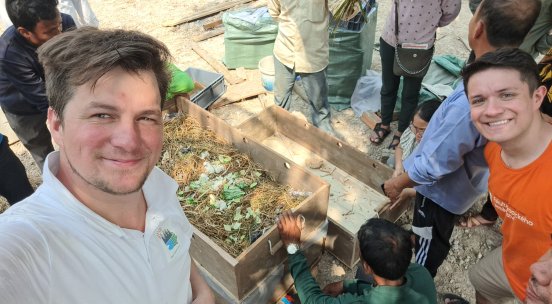
From Waste to Gold: ADRA and BRT Experts Boost Vermicomposting in Cambodia
In March 2023, Ing. Jan Staš and Dr. Eduardo Duque Dussán from the Czech University of Life Sciences Prague (CZU), Faculty of Tropical AgriSciences, BioResources & Technology Division (BRT), travelled to Pursat Province, Cambodia, to lend their expertise to The Adventist and Development Relief Agencies (ADRA) V-SOIL project. This initiative aims to introduce and promote vermicomposting techniques to improve organic waste management, soil fertility, agricultural productivity and farmers' dependence on chemical fertilizers. Their visit was a significant step forward in the pursuit to improve farming practices in Cambodia.
Upon arriving, experts jumped right into action, offering both theoretical and practical training sessions to ADRA staff and project farmers. The first task was to analyse the existing vermicomposting systems and evaluate the availability and quality of inputs. The team identified local materials that could be repurposed for vermicompost construction, such as used plastic buckets, boxes or leftover wood. They also assessed market demand for vermicompost products and explored potential sales and marketing strategies.
The feedback from these sessions was overwhelmingly positive. "The training was enlightening," said one farmer. "I had no idea that something as simple as earthworms could provide us with fertiliser, which makes such a difference to our soil and crops."
One of the key activities was forming a sustainable training team comprising of around ten highly motivated individuals. This core group included private sector farmers from ADRA’s agro-business and food security programs, which reached over 2,000 farmers. With the support of the Provincial Department of Agriculture, this team is now equipped to establish and support vermiculture businesses throughout the region.
Jan and Eduardo also conducted intensive hands-on training for twelve potential vermiculture business leaders. These sessions covered everything from the benefits of vermicompost to the intricacies of waste collection, product options, and financial strategies. By the end of their visit, the BRT experts had ensured that these future leaders were well-prepared to take the reins and drive the vermicomposting initiative forward.
At least ten of the trained business leaders are now developing their own vermiculture production sites and sales businesses. The project is providing minimal start-up inputs, such as production hardware and supplies, to support these entrepreneurs. Additionally, efforts are underway to create strong marketing strategies, including the use of social media to raise awareness and build brand recognition.
Raising awareness about the benefits of vermicompost was another crucial aspect of the visit. Local agro-business networks and associations were mobilised to spread the word to farmer households. The outreach efforts included demonstrations of basic vermicompost production techniques suitable for small households and engaging local youth through production contests and school programs.
The visit by BRT experts has laid a solid foundation for the V-SOIL project. Moving forward, it is essential to maintain the momentum by:
- Continued Support and Training: Ongoing training and coaching for the core team and business leaders.
- Market Development: Strengthening marketing relationships and expanding the reach of vermicompost products.
- Community Engagement: Enhancing awareness programs to include more households and schools.
- Monitoring and Evaluation: Regular assessment of progress and impact to refine strategies and ensure sustainability.
The successful collaboration between CZU (BRT) and ADRA underscores the potential of vermicomposting as a transformative agricultural practice. By turning waste into wealth, this project is not only boosting soil health and productivity but also opening up new economic opportunities for farmers in Pursat Province and beyond.
Author: Jan Staš
Photo credit: Jan Staš and Eduardo Duque Dussán
For more details on BRT activities, subscribe to our newsletter or follow us on social media for regular updates and highlights.
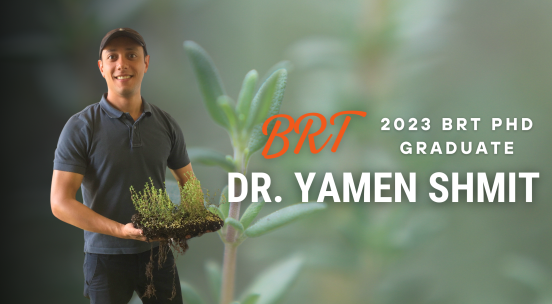
Introducing our 2023 PhD graduate, Dr. Yamen Shmit
Dr. Yamen Shmit earned his Ph.D. in the Tropical Agrobiology and Bioresource Management doctoral programme at the Czech University of Life Sciences Prague. His field of specialization is in vitro Biotechnologies and plant breeding. His research topic was ‘Induced polyploidy in species from the Lamiaceae family: Thymus vulgaris L. and Satureja montana L.’. During his doctoral studies, Dr. Shmit has published scientific papers and participated in international conferences, internships, and research projects. One of the most outstanding achievements of his postgraduate studies is successfully obtaining new Thymus vulgaris genotypes with different morphological and biochemical properties and higher essential oil and thymol content. He also obtained promising
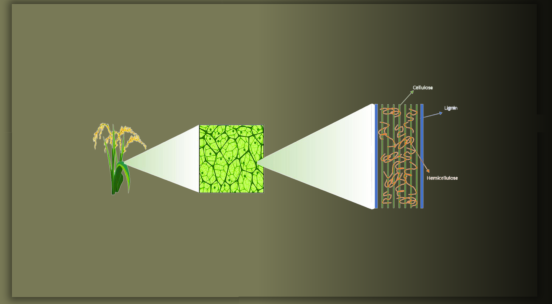
Enhancing Biomethane Production from Agro-Waste through Pretreatment of Lignocellulosic Biomass
The young researchers of the BRT are diligently working to increase the visibility of the success and potential of bioenergy sources across the globe. From Indonesia to Vietnam to Ethiopia and beyond, their efforts to highlight the impact and importance of incorporating renewable energy technologies are creating change worldwide.
With this popularization series, we aim to showcase the impact of our research on renewable energy in strategic countries around the globe.
Enjoy reading the full research article below by our Ph.D. student, Hidayatul Fitri!
Agricultural activities generate significant waste, including straw, husks, and stalks, which are often burned, contributing to environmental pollution. However, this waste can be a valuable resource for energy generation through biogas production. A key challenge is the recalcitrant nature of lignocellulosic biomass, which is resistant to microbial and enzymatic breakdown due to its complex structure, particularly the lignin content.
To overcome this, pretreatment methods—such as physical, chemical, and biological techniques—are employed to break down the lignin and make cellulose and hemicellulose more accessible for conversion into fermentable sugars. This pretreatment is crucial for improving the efficiency of anaerobic fermentation, a process essential for biogas production.
Looking forward, integrating agro-waste with animal manure can optimize biogas yields and provide a sustainable solution for waste management. By transforming underutilized waste into valuable energy, this research contributes to a greener and more sustainable future.
For a deeper dive into Hidayatul Fitri’s research and its implications, refer to the article below:
Hidayatul, F. (2024). Pretreatment of Lignocellulosic Material from Agro-waste to Increase Biomethane Production. Biogas Research Team. Retrieved from https://biogas.czu.cz/dl/132648?lang=en
For more details on BRT activities, subscribe to our newsletter or follow us on social media for regular updates and highlights.
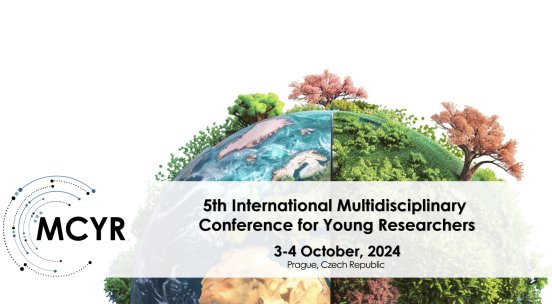
Join us for our main event of the year – MCYR!
Join us for our main event of the year - the 5th International Multidisciplinary Conference for Young Researchers (MCYR) taking place in Prague, Czech Republic, from October 3-4, 2024!
MCYR is focused on fostering interdisciplinary collaboration and supporting the next generation of researchers on key topics under this year's sub-theme: "Resilience in the Face of Global Challenges", offering fresh perspectives and innovative solutions to the pressing issues of our time.
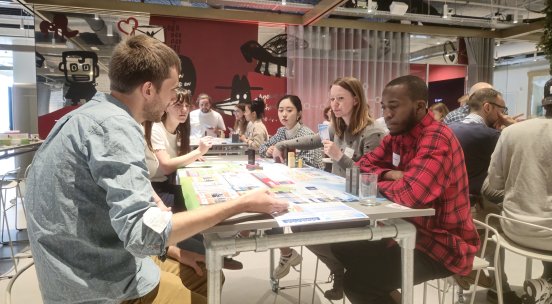
Energizing Communities: Insights from the Public Participation in Energy Transition Summer School
To broaden and develop the professional skills of our team members and widen their scientific network and cultural experiences, the BRT encourages its students to embark on internships and summer school experiences. These experiences are connected to their scientific journey and enable them to have hands-on, practical and in-field experiences, which are critical to their future careers. They help to hone their communication, time management, teamwork, problem-solving, and leadership skills, all of which are highly valued assets in young scientists.
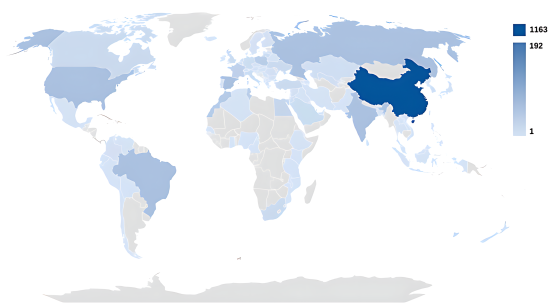
New paper published! Soil Contamination by Heavy Metals and Radionuclides and Related Bioremediation Techniques
Heavy metals and radionuclides are all around us in the environment. We ourselves contribute to these types of pollution through our industry. However, some accidents and disasters result in the release of these toxic substances into the environment at a far greater scale. Because of this, it is increasingly important to know how radionuclides and heavy metals are distributed in nature and under human influence. We need to know what measures can be taken to reduce their distribution in the ecosystem to improve the condition of soils. Our article was devoted to these problems.
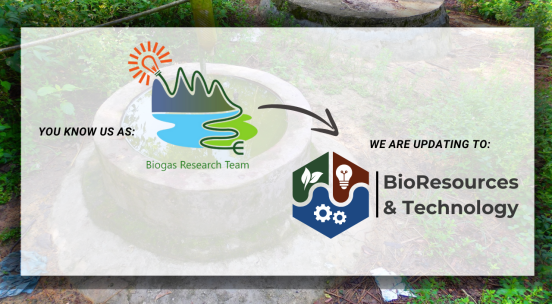
We are rebranding! From BRT to BRT!
The Biogas Research Team is upgrading to BioResources and Technology (From BRT to BRT)
We are pleased to announce our Biogas Research Team (BRT) rebranding to the BioResources and Technology (BRT) Division. Simply from BRT to BRT. This evolution marks a milestone in our journey, reflecting the broadening scope and increasing complexity of our research and development activities. While biogas remains at the heart of our work, our rebranding to BioResources and Technology better covers the diversity of our research, the projects and our commitment to sustainable solutions for a rapidly changing world.
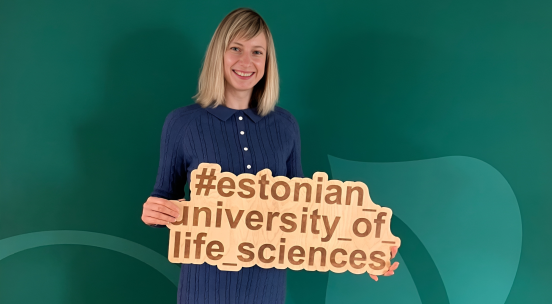
BRT at the 2024 BSE and FoodBalt conferences in Estonia!
BRT at the 2024 Biosystems Engineering (BSE) and FoodBalt conferences in Tartu, Estonia. On 8–10 May 2024, Assoc Prof. Dr. Yelizaveta Chernysh, senior researcher of the BRT, participated in the Conference Biosystems Engineering (BSE) and FoodBalt 2024. She represented the research co-authored by Dr. Chernysh, Assoc Prof. Dr. Hynek Roubik and Dr. Viktoriia Chubur.
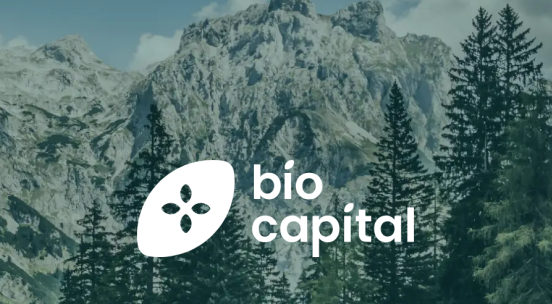
EU-funded Research and Innovation Action kicks-off: Utilising private capital and space technology to protect biodiversity
The recently launched BIO-CAPITAL project contributes to the development of financial tools that protect biodiversity by linking private capital investments and Earth observation data from space.
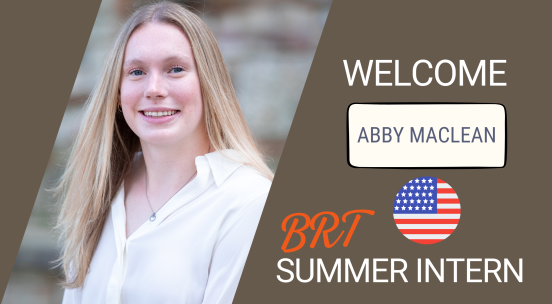
Meet our summer intern – Abby MacLean!
To broaden and develop our teams’ collaborative skills while offering visiting students the chance to expand their scientific networks and gain cultural experiences, BRT encourages students to join our team for internship opportunities. These internships aim to facilitate idea exchange, foster professional growth, and create opportunities for collaboration.
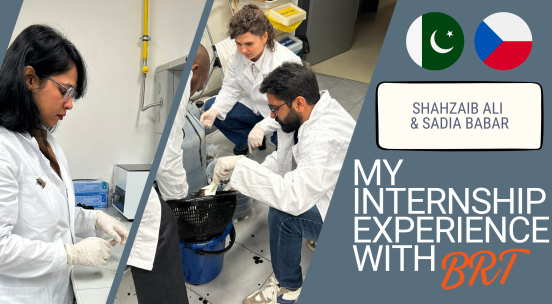
Visiting Internship Insights: Exploring Biogas Research at CZU
To broaden and develop our teams’ collaborative skills while offering visiting students the chance to expand their scientific networks and gain cultural experiences, BRT encourages students to join our team for internship opportunities. These internships aim to facilitate idea exchange, foster professional growth, and create opportunities for collaboration.
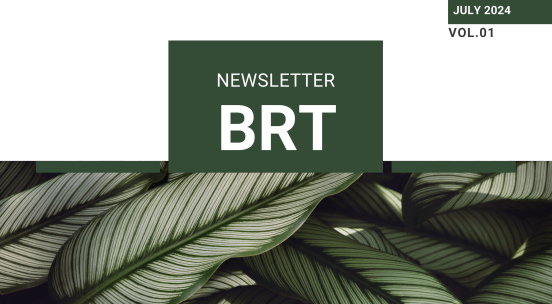
Now out! BRT Newsletter vol.01
We are delighted to share the first issue of our BRT newsletter with you! This issue provides a snippet of what we have been up to in the first half of 2024 and highlights our most recent achievements.
We hope you enjoy it - happy reading!
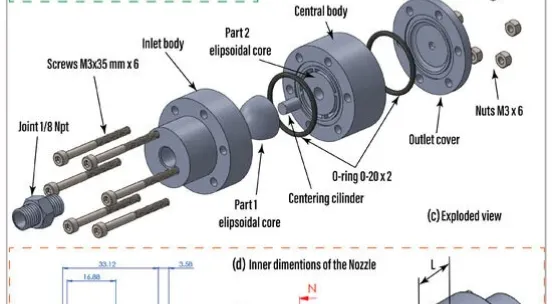
New paper published! Optimizing Harvesting Efficiency: Development and Assessment of a Pneumatic Air Jet Excitation Nozzle for Delicate Biostructures in Food Processing
New paper published by Eduardo Duque Dussán and Jan Banout from BRT. This study introduces a novel pneumatic air jet excitation nozzle, meticulously designed for food processing applications. The device employs compressed air equipment and a precision solenoid valve to regulate air discharge through a parametric air jet nozzle. Extensive testing showed that the device could achieve shooting frequencies in the 40–45 Hz range, operating at pressures between 5 and 7 bar. A sophisticated sensor system was utilized to measure the force generated by the device across various frequencies and pressures.
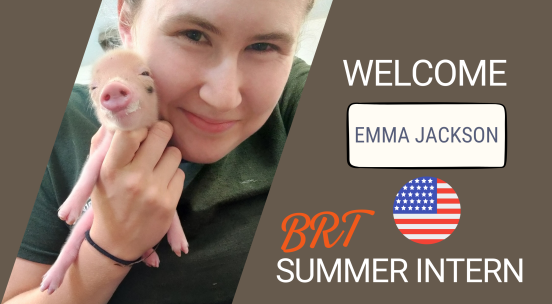
Meet our summer intern – Emma Jackson!
To broaden and develop our teams’ collaborative skills while offering visiting students the chance to expand their scientific networks and gain cultural experiences, BRT encourages students to join our team for internship opportunities. These internships aim to facilitate idea exchange, foster professional growth, and create opportunities for collaboration. Meet our summer intern joining our team from the United States, Emma Jackson!
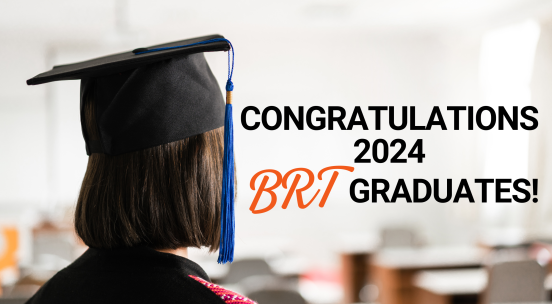
Congratulations to the BRT students who have successfully defended their thesis!
This year, four master students and three bachelor students from the Biogas Research Team successfully defended their thesis. Enjoy reading more about their research activities!
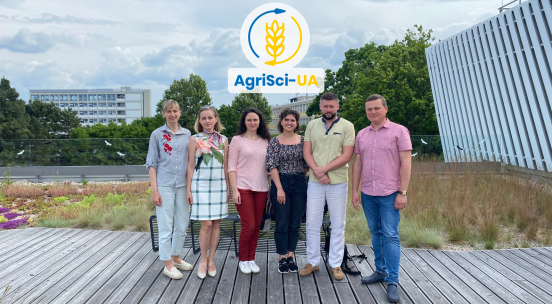
Empowering Academics in Ukraine: The AgriSci-UA Project 2023
Cooperation within projects aimed at capacity building and collaboration between CZU and selected partner universities in Ukraine has a long-standing tradition, which has managed to persist even in the current unfavourable situation caused by the war. Not only was the AgriSci-UA project successfully implemented in 2023, but the platform also expanded to include one more partner. The State Biotechnological University is also now a member, joining the Ukrainian partner universities of Sumy National Agrarian University, Sumy State University, Bila Tserkva National Agrarian University, and Dnipro State Agrarian-Economic University.
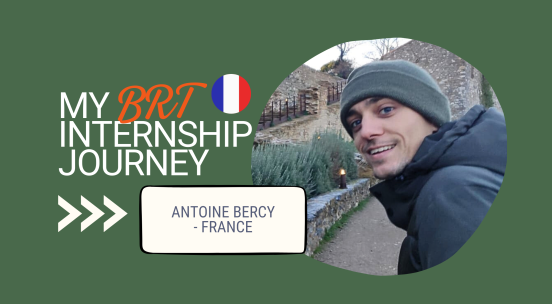
Seizing Opportunities for Professional Development: My Internship with SUEZ in France
To broaden and develop the professional skills of our team members and widen their scientific network and cultural experiences, the BRT encourages its students to embark on internships. These internships are connected to their scientific journey and enable them to have hands-on, practical and in-field experiences, which are critical to their future careers. The internships help to hone their communication, time management, teamwork, problem-solving, and leadership skills, all of which are highly valued assets in young scientists.
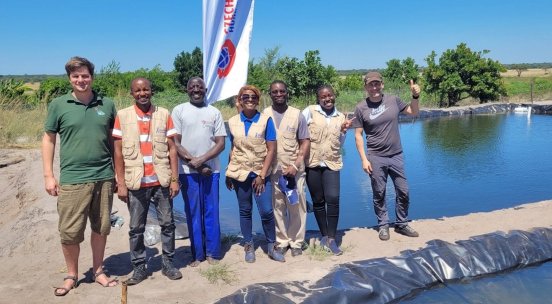
Linking aquaculture and small-scale biogas technology in Zambia
The Project 'Through Biogas Technology to Increase the Resilience of Communities in the Western Province of Zambia' unlocks unlimited potential. In Zambia, the population is faced with the unavailability and scarcity of energy resources, and most people depend on unsustainable energy practices. The responsibility for collecting traditional resources (charcoal, firewood) is, in most cases, borne by women and girls who often cannot devote themselves to education and/or other self-realisation activities.
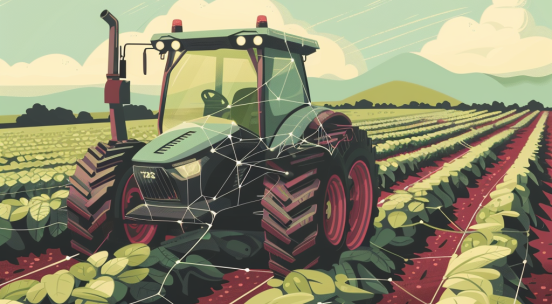
Policy Paper Advocating for Legislative Reform in Autonomous Agricultural Technologies
The Agri Policy lab has released a new innovation-focused Policy Paper 2024/07, titled "Automation in agriculture as a direction for Czechia?" The paper underscores the transformative impact of field robots on efficiency, productivity, and sustainability within the agricultural sector and signals a need for modernizing Czech agriculture by advocating for legislative reforms that unlock the true potential of autonomous technologies.
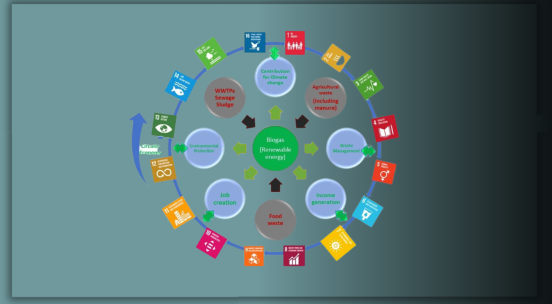
BRT Popularization Series - Sustainable Development in Ethiopia: Biogas Solutions for Energy Challenges
The young researchers of the Biogas Research Team (BRT) are diligently working to increase the visibility of the success and potential of bioenergy sources across the globe. From Indonesia to Vietnam to Ethiopia and beyond, their efforts to highlight the impact and importance of incorporating renewable energy technologies are creating change worldwide.
With this popularization series, we aim to showcase the impact of our research on renewable energy in strategic countries around the globe.
Enjoy reading the research article below by our Ph.D. student, Tewodros Tarekegn Lapiso!
The adoption of small-scale biogas technology in Ethiopia holds significant promise for advancing Sustainable Development Goals (SDGs) while addressing the country's pressing energy and environmental challenges. Ethiopia faces a critical need for sustainable development inputs across various sectors. Despite its abundance of natural resources, including fertile land and favorable climatic conditions, much of these resources remain untapped and underutilized.
Recognizing the need for sustainable energy solutions, Ethiopia has initiated efforts to transition towards green and modern energy sources. Biogas technology presents a viable solution, however, the widespread adoption of biogas technology in Ethiopia remains limited. To address this gap, BRT PhD student Tewodros Tarekegn Lapiso, is assessing the constraints and challenges hindering the dissemination of small-scale biogas plants in Ethiopia. By aligning with the countries SDGs and the circular economy framework, his research seeks to provide recommendations for overcoming barriers to adoption and maximizing the technology's contributions to sustainable development.
For a deeper dive into Tewodros Tarekegn Lapiso’s research and its implications, refer to the article below!
Lapiso, T.W. (2024). Small-scale biogas technology and Sustainable Development Goals in today´s Ethiopia. Biogas Research Team. Retrieved from:

PG2CRM Project Meeting in Lisbon – Paving the Road Ahead
The PG2CRM (Phosphogypsum Processing to Critical Raw Materials) project meeting, hosted by the NOVA School of Science and Technology (NOVA University Lisbon) in Lisbon, Portugal from March 19-20, 2024 marked a collaborative effort aimed at exploring the potential of comprehensive use of phosphogypsum while addressing environmental concerns.
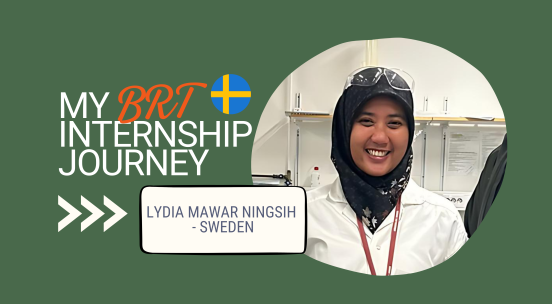
A Journey of Scientific Growth and Scandinavian Exploration: My Internship at Boras University, Sweden
To broaden and develop the professional skills of our team members and widen their scientific network and cultural experiences, the BRT encourages its students to embark on internships. These internships are connected to their scientific journey and enable them to have hands-on, practical and in-field experiences, which are critical to their future careers. The internships help to hone their communication, time management, teamwork, problem-solving, and leadership skills, all of which are highly valued assets in young scientists.

Policy Briefs vs. White/Green Papers: Understanding the Difference
Our experts from the Agri Policy Lab (Assoc. Prof. Dr. Hynek Roubík and Assoc. Prof. Dr. Stella Tsani) prepared a summary that can help you understand the difference between Policy Briefs, White Papers, and Green Papers. While all three documents aim to inform readers about specific topics or issues, they differ in their scope, format, and intended audience. Understanding the nuances between Policy Briefs, White papers, and Green papers is crucial for effectively communicating research findings and advocating for actionable solutions.
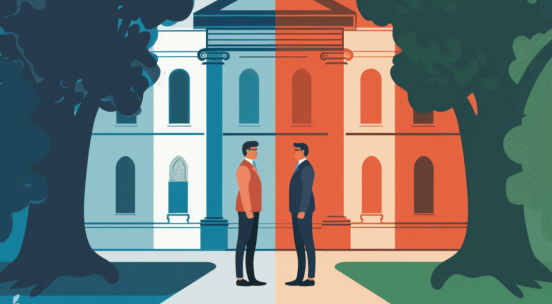
Policy Guidelines vs. Policies: Understanding the Difference
Our experts from the Agri Policy Lab (Assoc. Prof. Dr. Hynek Roubík and Assoc. Prof. Dr. Stella Tsani) prepared a summary that can help you understand the difference between Policy Guidelines and Policies. The distinction between guidelines and policies is critical within governmental and organizational structures, particularly when establishing best practices and operational protocols. While these terms are often used interchangeably, they hold distinct meanings and implications alongside other organizational directives, such as procedures and standards.
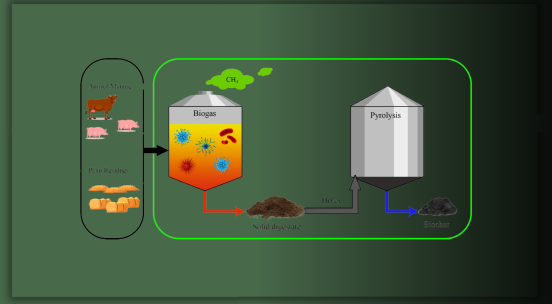
BRT Popularization Series - Biogas technology in Vietnam: Prospect within our hand
The young researchers of the Biogas Research Team (BRT) are diligently working to increase the visibility of the success and potential of bioenergy sources across the globe. From Indonesia to Vietnam to Ethiopia and beyond, their efforts to highlight the impact and importance of incorporating renewable energy technologies are creating change worldwide.
With this popularization series, we aim to showcase the impact of our research on renewable energy in strategic countries around the globe.
Enjoy reading the research by our Ph.D. student, Van Hau Duong!
Our PhD student, Van Hau Duong, is looking at how biogas plants in Vietnam are not only addressing the pressing issue of animal manure waste but also meeting the energy demands of local communities. Vietnam boasts a rich history in biogas technology dating back to the 1960s, culminating in the construction of the first biogas plant in 1964 in Bac Thai, Ha Noi, and Ha Nam Ninh. Over the years, various initiatives and collaborations have increased the spread of biogas technology. For example, a collaboration between Vietnam and the Netherlands in 2003 spurred the establishment of large-scale biogas projects, resulting in 500,000 biogas digester plants installed to date. Despite these advancements, challenges persist. Technical capacity, social perspectives, financial constraints, and policy frameworks remain barriers to widespread adoption throughout Vietnam. Luckily, intensive efforts are underway to address these challenges and drive further development within the country.
Looking ahead, Vietnam's biogas sector holds immense promise. With an abundance of potential feedstock from livestock, forestry, agriculture waste, and household organic waste, the country is well-positioned to harness renewable energy sources. Government incentives and investment opportunities are poised to attract both domestic and international investors, driving the transition towards a greener, more sustainable future. For a deeper dive into Van Hau Duong's research and its implications, refer to the article below!
Interested in more details? Check out:
Duong, V. H. (2024). Biogas technology in Vietnam: prospect within our hand. Biogas Research Team. Retrieved from
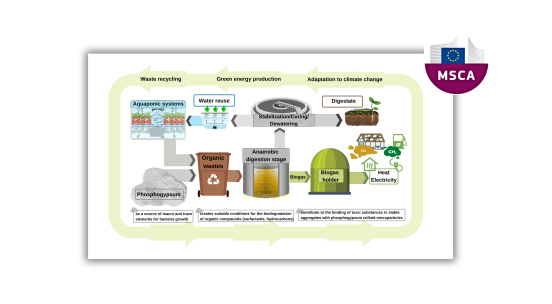
Project alert! PG-BIOPRO - Phosphogypsum as a mineral resource for bioprocesses
The BRT is pleased to introduce the PG-BIOPRO (Phosphogypsum as a mineral resource for bioprocesses) [SH1] project. Led by Assoc. Prof. Dr. Yelizaveta Chernysh under the Marie Skłodowska-Curie Postdoctoral Fellowship (MSCA-PF) with funding from the European Union under the MSCA4Ukraine framework. It will run from 2023 to 2025. The concept of this project is to develop integrated biotechnological solutions to produce biofuels and organomineral fertilizers. It is based on using organic waste as carbon substrates and phosphogypsum as a source of nutrients and trace elements for the microorganisms' growth during anaerobic digestion.
The World as we know it is quickly changing. Humankind is facing numerous crises far beyond the imagination of previous generations. The global energy and biodiversity crises stimulate our effort to find alternative and environmentally friendly energy sources to fuel growing populations worldwide. Renewable energy has been recognized as a viable strategy that meets the UN Sustainable Development Goals (SDGs). We urgently need new means to acquire sufficient nutrients and trace elements for the desired microbial activities that satisfy our need for biofuels, starting compounds for the chemical industry, etc.
Our PG-BIOPRO project will explore the use of phosphogypsum (PG), a chemical waste after fertilizer production from phosphate rock, by the wet acid method. Environmental concerns and increased costs of PG stockpiling call for better use.
In short, our project aims to:
- Research on PG as a nutrient resource for microbial associates during anaerobic digestion of organic waste;
- Develop a taxonomic classification and review of metabolic pathways of PG compound transformation with the use of electronic KEGG, MetaCyc and EzTaxon databases;
- Evaluate the fermentation waste properties as organomineral fertilizer using Life Cycle Assessment (LCA) approaches.
Scientific impact
We will obtain new scientific results based on the planned theoretical and experimental studies. Namely: (i) determining the patterns of using such chemical by-products as phosphogypsum as a new type of mineral supporting carrier (biocarrier) for the growth of microorganisms; (ii) the process of intensification of biofuel production will be scientifically substantiated; (iii) and environmentally friendly fertilizers production to restore the environment.
Our project will result in the following opportunities: LCA of theoretical and experimental research, including numerical simulation and physical modelling of biofuel production processes with waste recycling and producing a number of other bio-products; defining the economic strategy for the biofuel sector at a local level in different regions of Ukraine. Furthermore, the project results will refine the existing and develop new environmentally friendly resource-saving bioenergy technologies, assess their economic efficiency, clarify the technological requirements for operating the equipment, and prepare them for commercialization.
Societal impact
The proposed research will develop the capacity of Ukrainian scientists during the war in Ukraine, with the possibility of conducting research while staying in safe conditions with the involvement of the necessary material base through regular online lectures to Ukraine and the Open Science approach of CZU. Furthermore, the study’s results will significantly contribute to the development of the Sumy region and the labour force in the future post-war period.
Economic impact
The obtained products will be used in developing green energy and agroecology in Ukraine and the Czech Republic. We will promote sustainable bioenergy innovations in electricity and biogas production. Additionally, complex biotechnological methods for waste treatment will allow the restoration of contaminated soils in dump areas and improve their buffer properties.
Biofuel production is one of the most economically and environmentally beneficial solutions for organic waste material and chemical by-products such as PG. The actual level of energy recycling of such waste is far below our possibilities. The proposed solution will contribute to the diversification of available energy sources, the suppression of fossil energy use, and the neutralization of environmentally detrimental toxic wastes. Apart from the biogas and irrigation water, the end-products of fermentation of organic waste (such as sewage sludge, poultry manure, etc.) could be reused as artificial fertilizers.
Demand for global resources exceeded supply and drove up prices as economies recovered from the COVID-19 pandemic. This led to a global cost-of-living crisis characterized by rising energy and food poverty. The war in Ukraine considerably worsens this situation, which among other damaging aspects, causes severe disruptions in the fertilizer supply chain for all macronutrients. Our project is thus more than timely as we only need support to manage the transition from laboratory to semi-industrial scale. Furthermore, the possibility of cooperation with a number of companies interested in introducing PG processing into their production is also in the target area. It would be an ideal opportunity to introduce the recycling of PG into production practice and create urgently needed valorization perspectives.
Stay tuned for more updates on the PG-BIOPRO project!
For more details on BRT activities, follow us on social media for regular updates and highlights.
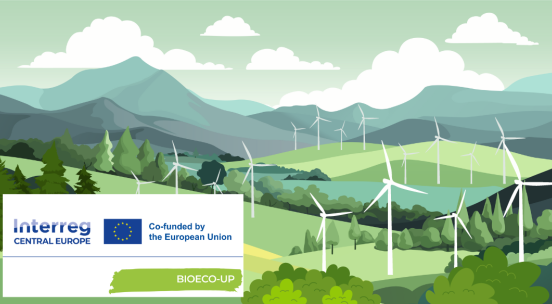
The BIOECONOMY info sheets are ready - Don't miss out; get yours now!
Experts across Europe prepared info sheets about various bioeconomy topics, with the involvement of our BRT Head - Assoc. Prof. Dr. Hynek Roubík. Experts involved in the INTERREG BIOECO-UP project have carefully selected topics to highlight the importance of the bioeconomy and its impact on the environment. If you want to discover more about biomaterials, biogas, or sustainable businesses, check out our info sheets!
More information on the project can also be found here:
www.interreg-central.eu/projects/bioeco-up.
The BIOECO-UP project supports the development and recognition of circular bioeconomy and value changes, empowers citizens to become bioeconomy consumers, and enhances the implementation of transnational policy analysis of bioeconomy measures. In addition, the BIOECO-UP supports several Agriculture Ministries members of the BOOST4BIOEAST Initiative (Associated partners). More details are available at https://bioeast.eu/objectives/.
You can download the info sheets HERE and HERE[SH1] . Enjoy!
About the project:
BIOECO-UP - Circular BioEconomy Market Uptake and Policy Support in Central Europe
The bioeconomy concept seeks to replace fossil resources with renewable raw materials in as many areas and applications as possible. The BIOECO-UP project widely establishes this concept across central Europe. The partners will design new circular value chains for the bioeconomy and change consumer behaviour. They will also support the policy level to push ahead with the transformation.
Stay tuned for more updates on the BIOECO-UP project!
For more details on BRT activities, follow us on social media for regular updates and highlights.

Biogas Research Team – proud member of the Artificial Intelligence Research Network
The BRT is pleased to announce that we are now a member of the Artificial Intelligence Research Network - Through Assoc. Prof. Dr. Hynek Roubík. The Artificial Intelligence Research Network serves as a dynamic platform for connecting AI researchers worldwide. It particularly focuses on chatbots and large language models. By joining this network, the BRT gains access to a wealth of resources and expertise in artificial intelligence.
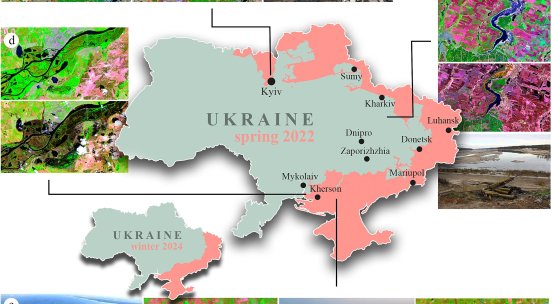
New paper published! Water security consequences of the Russia-Ukraine war and the post-war outlook
Water is a fundamental and irreplaceable resource for life on Earth. In this new paper, we show the consequences of water security. The Biogas Research Team is continuously mapping the situation and outlining roadmaps for the post-war recovery period. The Russia-Ukraine war, which began in February 2022 and persists in 2024, has significantly damaged Ukraine's water resources and infrastructure. This paper examines the ecological and economic consequences of the conflict on water bodies and outlines prospects for post-war recovery in the context of sustainable development.
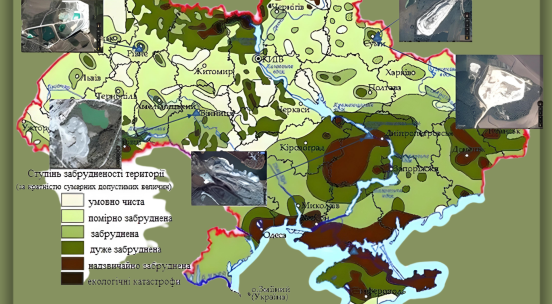
New paper published! Agroecological Transformation in the Salt Composition of Soil under the Phosphogypsum Influence on Irrigated Lands in Ukraine
Global climate change and the associated risks to food security are driving the expansion of irrigated agriculture in the Middle East, Africa, Central Asia and Europe. An increase in the share of irrigated agriculture can increase the productivity of agricultural land by an average of 25-35%. There are still unresolved issues regarding the feasibility and effectiveness of applying gypsum to haplic chernozems with a low degree of salinity. In the context of irrigated agriculture in Ukraine, agromeliorative measures with the use of chemical reclamation, which involves the introduction of substances of natural or man-made origin into the soil, are widespread. The use of phosphogypsum can become one of the important directions for the reclamation and amelioration of soils contaminated due to direct and indirect military actions. It is also possible to highlight the features of phosphogypsum that allow it to be used for the development of ecosystem services:
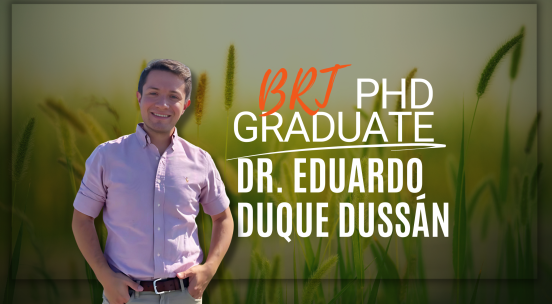
Introducing our 2023 PhD graduate, Dr. Eduardo Duque Dussán
Dr. Eduardo Duque Dussán earned his Ph.D. in Sustainable Technologies from the Czech University of Life Sciences (ČZU), Prague, specializing in the design and evaluation of a Hybrid Solar Tunnel Dryer for Parchment Coffee in Colombia (2020-2023). His academic journey includes an MBA from ESNECA Business School (2020-2021) and an MSc in Chemical and Process Engineering from the Czech Technical University (2017-2019).
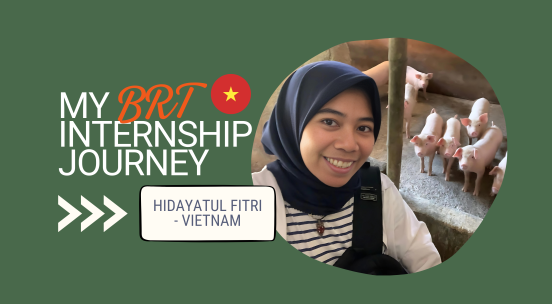
Exploring Women's Empowerment through Biogas technology in Hue City, Vietnam
To broaden and develop the professional skills of our team members and widen their scientific network and cultural experiences, the BRT encourages its students to embark on internships. These internships are connected to their scientific journey and enable them to have in field experiences which is critical to their future careers. The internships help to hone their communication, time management, teamwork, problem-solving, and leadership skills, all of which are highly valued assets in young scientists.
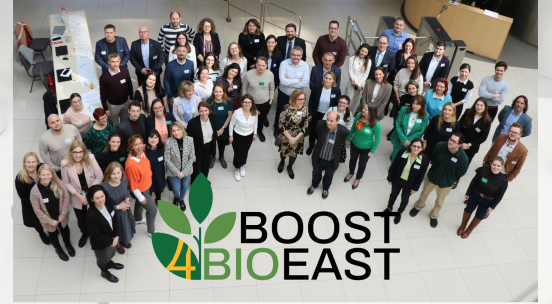
BOOST4BIOEAST project Kick-Off Meeting in Hungary - Setting the Stage for Collaborative Progress in Bioeconomy
The BOOST4BIOEAST project kick-off meeting, held on March 5th and 6th, 2024, at the Research Centre for Natural Sciences in Budapest, Hungary, marked a significant milestone in advancing bioeconomic initiatives across the BIOEAST region. When looking back on the BIOEAST project, BOOST4BIOEAST is an important continuation of bioeconomy efforts.
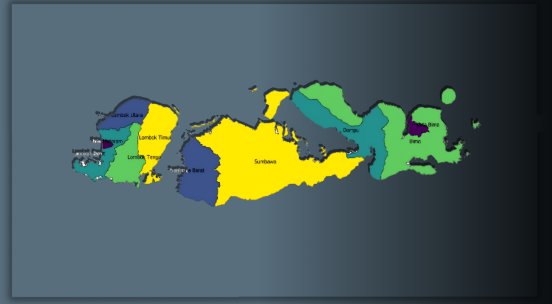
BRT Popularization Series - Harvesting Energy: The Power of Biomass Agricultural Residues in Indonesia
The young researchers of the Biogas Research Team (BRT) are diligently working to increase the visibility of the success and potential of bioenergy sources across the globe. From Indonesia to Vietnam to Ethiopia, their efforts to highlight the impact and importance of incorporating renewable energy technologies are creating change worldwide.
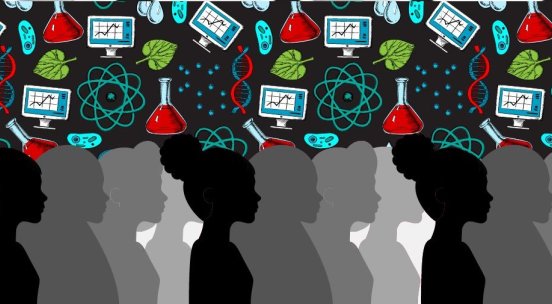
Celebrating women in science – A message from the head of the BRT
As the head of a multidisciplinary, international, and gender-inclusive research team, I feel a deep sense of pride and admiration for the remarkable women who contribute to science. International Women's Day seems like an opportune moment to acknowledge the invaluable contributions of female scientists and researchers, both those in the BRT, those who shape minds and career paths at universities, those in research centers, the private sector and women in history as a whole.
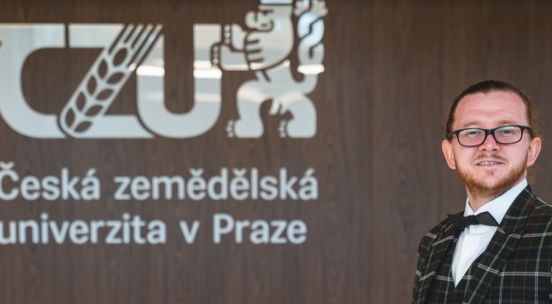
„Mysl, která se nebojí, nezná hranice,“ říká nový proděkan Fakulty tropického zemědělství
Docent Hynek Roubík se řídí přesvědčením, že „odpady jsou problém, výzva a příležitost všude“. Proto se dal na dráhu environmentálního a ekologického inženýrství v oblasti odpadového hospodářství. Výzkumu se věnuje na katedře udržitelných technologií Fakulty tropického zemědělství, kde také své vědomosti předává mladým doktorandům. V polovině ledna letošního roku se stal proděkanem této fakulty pro vědu, výzkum a doktorské studium.
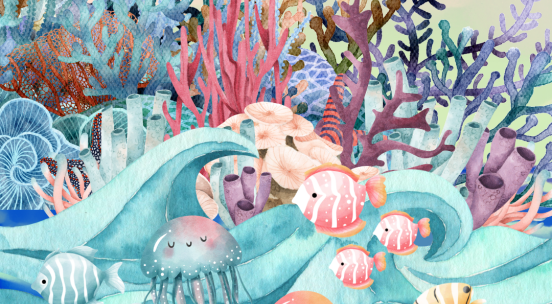
New E-Book published! The Ocean, Volume 4!
A new e-book was published in Frontiers for Young Minds. This E-Book also contains one of our papers called: Poo is Precious.
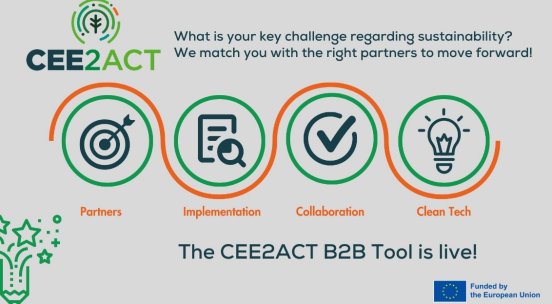
Launch of the CEE2ACT project B2B Tool
The CEE2ACT B2B TOOL, developed by Anteja ECG, is a simple and powerful platform that helps you find the right partners to achieve your goals. Using advanced algorithms and expert insights, it can match you with the right companies and experts to collaborate with. Learn more here.
The business-to-business matchmaking online tool enables stakeholders (SMEs, large companies, R&D institutions, universities, etc.) to build partnerships that will result in concrete projects or cooperation. Using advanced algorithms and expert insights, it can match you with the right companies and experts to collaborate with. This tool is open to everyone for free, and you can access it via this link.
Depending on your challenge, we will match you with:
– Buyers of waste and by-products
– Life-cycle assessment analysts
– Solution providers
– Sustainability consultants
– Partners for new projects
What’s in it for you?
The B2B tool will help you find potential partners for your new sustainability projects through our vast network of stakeholders and discover appropriate technological projects that will lower CO2 emissions and raise profits at the same time.
It is a unique opportunity to get help from the project’s advisory team and move faster towards implementing solutions that will improve your sustainability reporting.
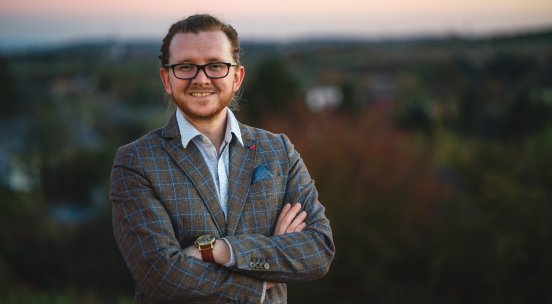
Interview with Assoc. Prof. Dr. Hynek Roubík – Newly Appointed FTA Vice-Dean of Science, Research and Doctoral Studies
The BRT is pleased to announce that Assoc. Prof. Dr. Hynek Roubík, founder and leader of the Biogas Research Team (BRT) at the Czech University of Life Sciences Prague (CZU), has been appointed as the new Vice-Dean of Science, Research and Doctoral Studies at FTZ. To commemorate the occasion and get his insights into this exciting new role, our BRT Communications Manager, Dr. Stacy Hammond, conducted an interview to capture his thoughts on his present and long-term visions for this new role. Enjoy the interview!
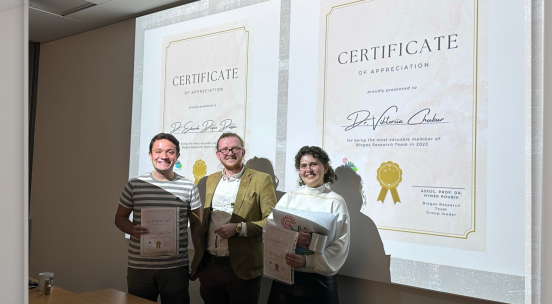
Presenting - The Most Valuable BRT Members 2023!
On December 18th, 2023, the Biogas Research Team indulged in our annual end-of-year general meeting and team party. The event was filled with highlights, from our yearly overview of achievements, team projects, and research activities to food, fun and games. One of the outstanding moments of the day was the annual BRT award ceremony, where the most valuable team members were recognised for their research achievements and willingness to go above and beyond to help others.
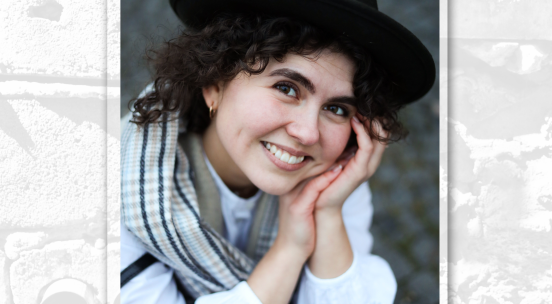
Dr. Viktoriia Chubur - The 2023 BRT AWARD WINNER
Dr. Viktoriia completed her BSc. And MSc studies specializing in "Ecology and Environmental Protection at the Sumy State University (SumDU), Ukraine. She then pursued her Doctoral studies at SSU in collaboration with the Czech University of Life Sciences, Prague (CZU) under the Biogas Research Team (BRT), obtaining her PhD degree in the field of "Environmental Protection Technologies under the research topic "Environmentally Safe Utilization of Waste for Energy Purposes in Environmental Protection Technologies" with a specific focus on anaerobic digestion of waste for biogas production, with the possibility of using chemical industry waste, such as phosphogypsum (PG) as a mineral additive. Throughout her academic journey, she gained experience through internships in biogas laboratories in Ukraine (Regional Office of Water Resources in Sumy region), the Czech Republic (CZU), Germany (TU Bergakademie Freiberg), and Austria (IFA-Tulln - BOKU), and through participation in the realization of Ukraine-Czech projects and other international projects within the BRT. For the past three years, she was the Head of SumDU’s Faculty Scientific Association of Students (Postgraduates, Doctoral Students, and Young Scientists). During her postgraduate studies, under the guidance of her supervisors (Assoc. Prof. Dr. Yelizaveta Chernysh and Assoc. Prof. Dr. Hynek Roubík).
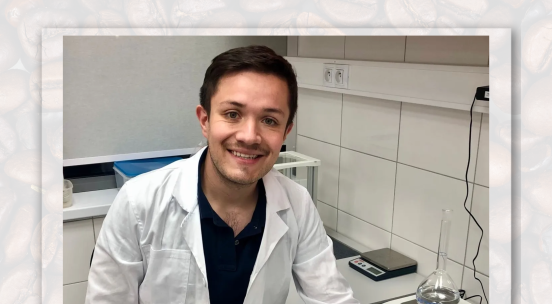
Dr. Eduardo Duque Dussán - The 2023 BRT AWARD WINNER
Dr. Eduardo Duque Dussán - The 2023 BRT AWARD WINNER Dr. Eduardo Duque Dussán earned his Ph.D. in Sustainable Technologies from the Czech University of Life Sciences (CZU), Prague, specializing in the design and evaluation of a Hybrid Solar Tunnel Dryer for Parchment Coffee in Colombia (2020-2023). His academic journey includes an MBA from ESNECA Business School (2020-2021), an MSc in Chemical and Process Engineering from the Czech Technical University (2017-2019) and a Mechanical Engineering undergraduate degree from the Universidad Autónoma de Manizales.

Interview with Assoc. Prof. Dr. Hynek Roubík - Founder of the BRT Agri Policy Lab
The BRT is pleased to announce the development of its new initiative, the Agri Policy Lab. To get more insight into the development of this exciting new initiative, we interviewed Assoc. Prof. Dr. Hynek Roubík who is an expert in organic waste management and sustainable technologies, the leader of the Biogas Research Team (BRT) at the Czech University of Life Sciences Prague (CZU), an agriculture enthusiast with a passion for his work and the second-youngest member of the Czech Academy of Agricultural Sciences and Bioeconomy platform of the Czech Republic. He does research, especially in Waste Management, Environmental and Ecological Engineering and is an editorial board member of several journals. He is also the author of over 100 peer-reviewed (indexed) research papers and was appointed one of Czechia's youngest associate professors.
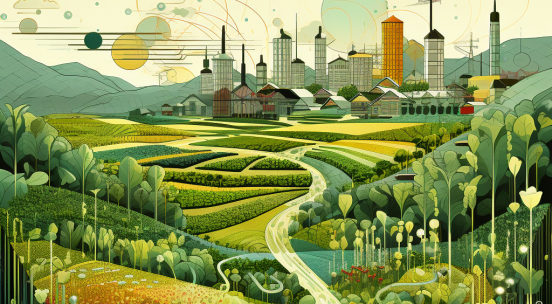
Agri Policy Lab – A new unit established within the Biogas Research Team
In January 2024, the Agri Policy Lab – a new unit established within the Biogas Research Team has been established. In a significant stride towards advancing sustainable agricultural practices, the Biogas Research Team (Czech University of Life Sciences Prague), led by Assoc. Prof. Dr. Hynek Roubík, has announced the establishment of the dynamic and multidisciplinary " Agri Policy Lab." Dedicated to shaping evidence-based agricultural policies, the Agri Policy Lab aims to be a catalyst for sustainable and inclusive development in the agricultural sector.
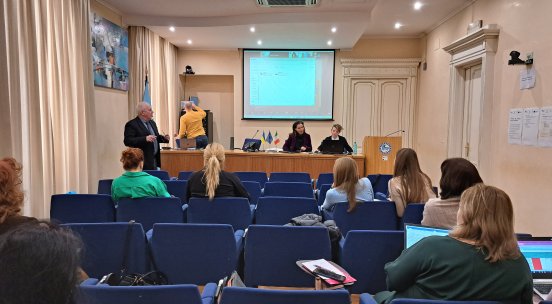
The Highlights of the Conference “University and inclusion”
The international conference “University and Inclusion”, organized by the Fondazione Sicurezza e Liberta in Rome (Italy) on December 14 and 15, 2023, became the summarizing dissemination event of the 1st year of the UNICOM project. And members of our team (Hynek Roubík and Jan Staš) did not miss this opportunity to meet with project partners!
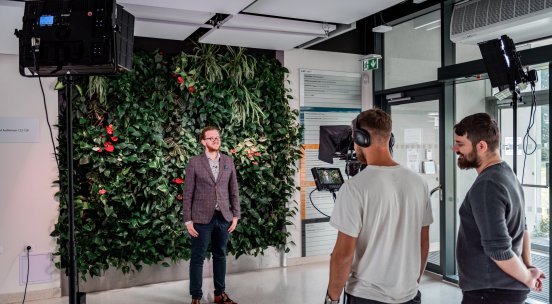
Agrohovor - Podcast s doc. Hynkem Roubíkem
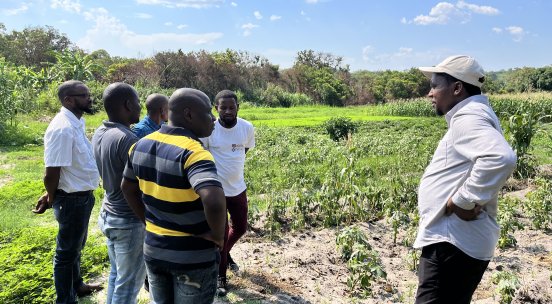
Zelený management: Češi učí Afričany hospodařit, prodávat i zpracovávat odpad
Češi učí zambijské zemědělce nejen jak hospodařit, ale také jak své výpěstky prodávat a jak zpracovávat odpad. Udržitelné farmaření je založeno na ekonomickém i ekologickém know-how.
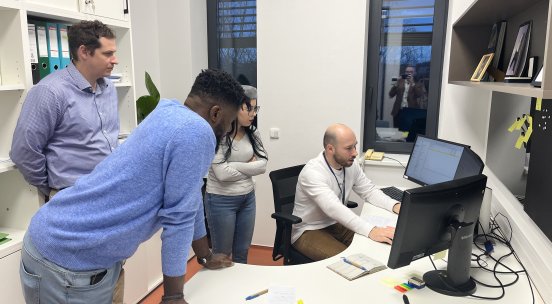
Visit of University of South Bohemia České Budějovice to strengthen cooperation with BRT
Our team visited University of South Bohemia České Budějovice to strengthen the cooperation between our two institutions. On 12.12.2023, Biogas Research Team (led by Assoc. Prof. Dr. Hynek Roubík) visited University of South Bohemia České Budějovice.
One of the crucial goals of the visit of Hynek Roubík and Charles Ogbu was to strengthen cooperation between the BRT and the University of South Bohemia České Budějovice, Department of Agroecosystems and specifically Laboratory of LCA (https://www.fzt.jcu.cz/en/faculty/departments/department-of-agroecosystems/laboratory-of-lca), which is lead by doc. Ing. Jaroslav Bernas, Ph.D.
We are looking forward to this new cooperation!
Part of PG2CRM project
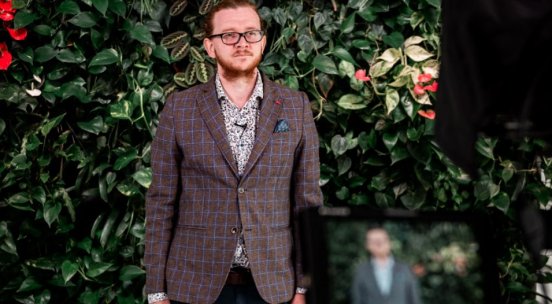
Jak šel čas s bioplynem: od staré Asyrie po současnost
Připomeňme si video o tom, jak šel čas s bioplynem. Video s doc. Hynkem Roubíkem (vedoucím Biogas Research Team) vzniklo v rámci Noci Vědců. A tím, že má již téměř 2 tisíce shlédnutí jsme se rozhodli vám ho ukázat znova.
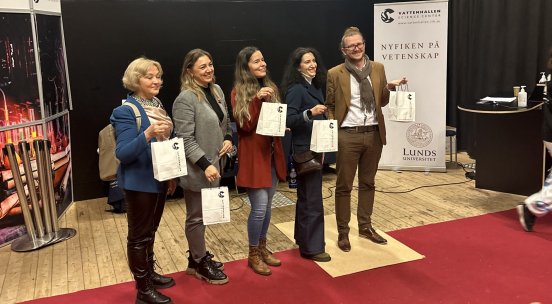
University-Community Cooperation: Insights from the UNICOM meeting in Lund, Sweden
Universities–Communities: strengthening cooperation between universities and communities for sustainable development. From the 6th to the 9th of November, 2023, the Lund University in Sweden hosted the UNICOM project meeting. During the meeting, the Biogas Research Team played a role in sharing the essential experiences in University-Community practices.
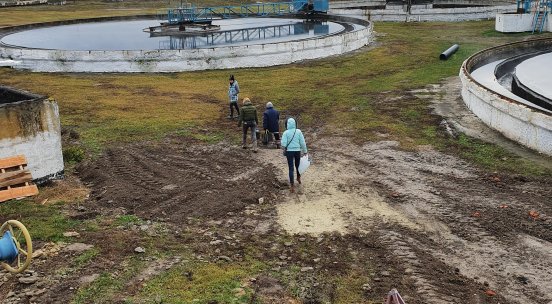
A new paper published! Enhancing Ecological Efficiency in Biological Wastewater Treatment: A Case Study on Quality Control Information System
New paper published by Yelizaveta Chernysh, Viktoria Chubur and Hynek Roubík from BRT. Sustainable and cyclical water management is a critical challenge for the water supply and wastewater sector, given its important role in determining the economic value of water. Therefore, there is an urgent need to further explore business opportunities in this sector to maximise water potential. In this case, an important development sector is the addition of digitalisation operations in water treatment plants and wastewater treatment plants, as well as the replacement of industrial devices with more energy efficient options based on sustainable solutions.
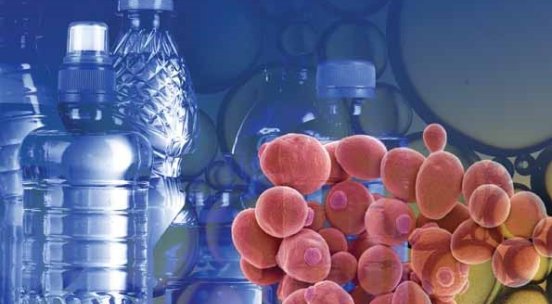
New paper published! Biomass potential from agricultural residues for energy utilization in West Nusa Tenggara (WNT), Indonesia
New paper published in prestigious GCB Bioenergy: Bioproducts for a Sustainable Bioeconomy journal by Hidayatul Fitri from BRT. West Nusa Tenggara (WNT), an Indonesian province celebrated for its contributions to rice, corn, and cacao production, is experiencing a natural consequence of its agricultural success: an increasing volume of agricultural residues. As crop yields surge, so does the residue left behind. This research seeks to address a pivotal question: Can these agricultural byproducts be used to meet the region's energy needs?
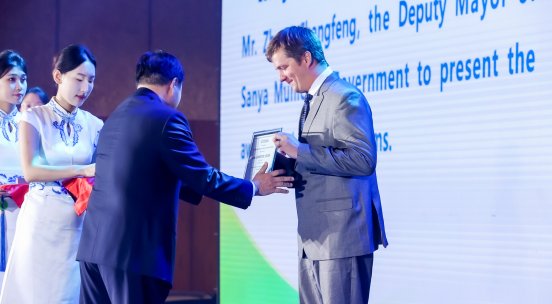
Reducing Food Loss and Waste – Youth Hackathon winners at FTA!
Jan Staš, a member of the Biogas Research Team (BRT), has just returned from Sanya, China, where he represented his team NOSATOR-FLOW in receiving their award for their outstanding success in the food waste solution competition.
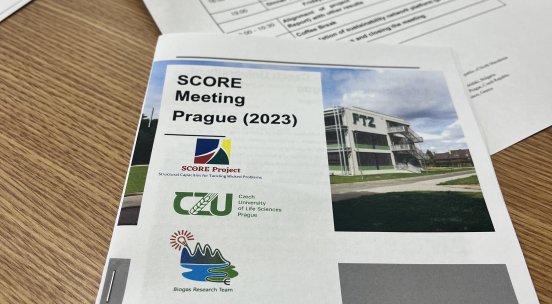
SCORE project – Meeting in Prague
SCORE project was this time hosted by BRT in Prague from 12th to 13th of October 2023. The event began with a warm welcome and registration, setting the stage for a two-day journey into solution of wicked problems.
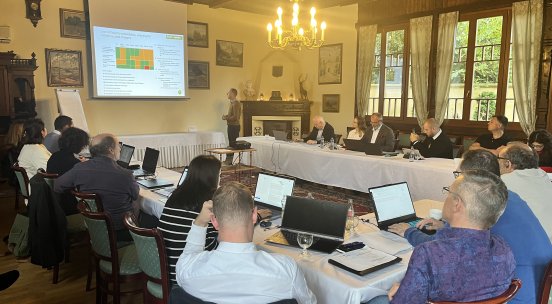
BIOECO-UP project meeting in Nitra, Slovakia
Second in person project meeting of Interreg project BIOECO-UP where BRT Group leader Assoc. Prof. Dr. Hynek Roubík was present.
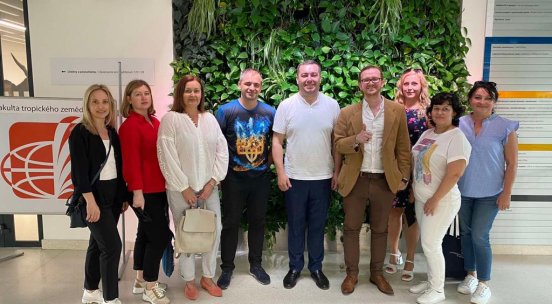
University-Community Cooperation: Insights from the UNICOM meeting in Prague
Universities – Communities: strengthening cooperation, where we strengthen cooperation between universities and communities for sustainable development. From the 2nd to the 6th of October, 2023, the Czech University of Life Sciences Prague hosted the UNICOM project meeting, an event organized by the Biogas Research Team. The gathering in Prague provided a dynamic platform for experts, educators, and innovators to explore the exciting potential of university-community cooperation and provide knowledge sharing to colleagues from Ukraine.
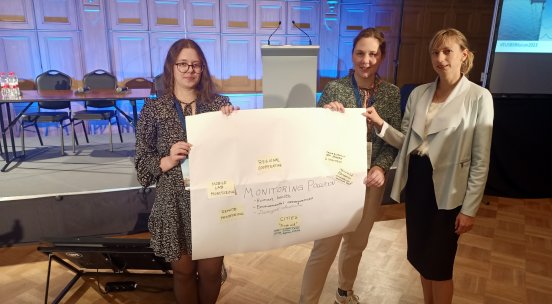
Riga (Latvia) organised the 14th Annual Forum of the EU Strategy for the Baltic Sea Region (EUSBSR)
Dr. Yelizaveta Chernysh, a member of the BRT, participated in the Riga 2023 - EUSBSR Annual Forum. On 4–5 October 2023, Dr. Yelizaveta Chernysh from BRT participated in EUSBSR Annual Forum (European Union Strategy for the Baltic Sea Region). EUSBSR is the first of the four Macro-regional Strategies in Europe.
The focus of the Annual Forum was mainly:
- Key issues and needs regarding contamination/hazardous substances due to war, focussing on environmental consequences.
- Possible solutions / ideas for support from the Baltic Sea Region
The roundtables "Strengthening and developing cooperation with Ukraine to ensure sustainable recovery" at the EUSBSR Annual Forum in Riga were of particular interest. Dr. Yelizaveta Chernysh participated as an expert in the roundtable “Hazards-roundtable: Environmental effects (especially hazardous substances) of the war” and the discussion was very productive. The workshops in Riga tried to present ideas and involve stakeholders for future cooperation. The Forum is also in line with the intentions of the Baltic Sea Neighborhood Program, which seeks to bring together several EU and non-EU countries working on regional issues. We consider the participation in the seminar at the annual EUSBSR Forum in Riga valuable as a contribution to future cooperation opportunities between Ukraine and EU countries included in the EU Strategy for the Baltic Sea Region.
More information: https://www.eusbsr.eu/annual-forum
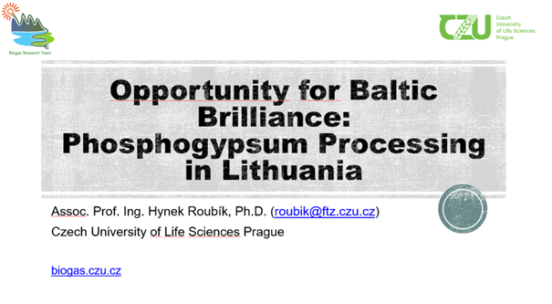
Opportunity for Baltic Brilliance: Phosphogypsum Processing in Lithuania
In September 2023, our Group leader Assoc. Prof. Hynek Roubík was invited by the Innovation Agency of Lithuania to be a keynote speaker during their workshop.

We are hiring! BRT - Junior communications specialist
The Biogas Research Team (BRT), led by Assoc. Prof. Dr. Hynek Roubík, is a part of the Department of Sustainable Technologies and the Faculty of Tropical AgriSciences (FTA). The main objective of the BRT is to determine the real impact of small biogas plants (both in developing and developed countries) on the environment, climate change and society and to contribute crucially to the current global debate on small biogas technology. Our team is covering what we call the whole research life cycle ?<– which, from our point of view, means that we do everything from feasibility studies, system studies, technology development, and laboratory-scale research towards implementation. Furthermore, we continue with socio-economic studies and implications, gender studies, and environmental studies. The team also broadens its portfolio by embarking on different routes that expand its scientific and social horizon. A few examples range from Open Science research through the OSIRIS project, organising multidisciplinary student conferences such as the 4th International Multidisciplinary Conference for Young Researchers (MCYR), developing the AgriSciences platform to developing mobile laboratories that detect infectious diseases through our mobiLAB initiative, and much more.
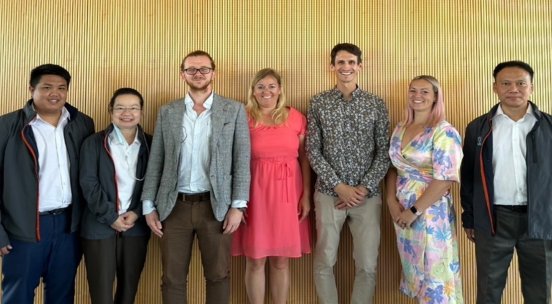
VISIT of CZU by delegation from Thailand
On August 23, 2023, KMITL Business School, led by Asst. Prof. Dr. Opal Suwunnamek and Dr. Suwat Dansomboon, together with Local Personnel Development Institute, Department of Local Administration, Ministry of Interior, and Executives group from Pak Kret City Municipality Office visited Czech University of Life Sciences Prague.
Among the main topics of discussion was also waste management and various options, which could be further utilised by the municipalities in Thailand, which was discussion by Group leader of Biogas Research Team (Assoc. Prof. Dr. Hynek Roubík).
One of the key takeaways from this collaborative effort was the realization that waste management isn't a one-size-fits-all topic. The strategies and solutions adopted must be context-specific, considering local conditions and resources. CZU's wealth of experience in this domain served as a guiding light, offering valuable insights into tailoring waste management practices to suit Thailand's diverse landscapes.
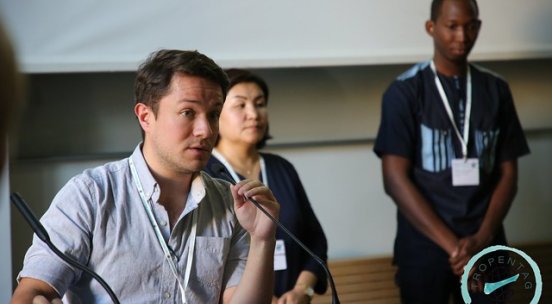
The Biogas Research Team once again made a significant impact at the Tropentag conference!
Our colleagues, Eduardo Duque Dussán, Ricardo Situmeang, and Antoine Bercy, took an active part in the Tropentag 2023 conference, which was held in from September 20 to 22, 2023 in Berlin, Germany. The conference was organized by the Leibniz Centre for Agricultural Landscape Research (ZALF) in collaboration with Humboldt-Universität zu Berlin, Germany.
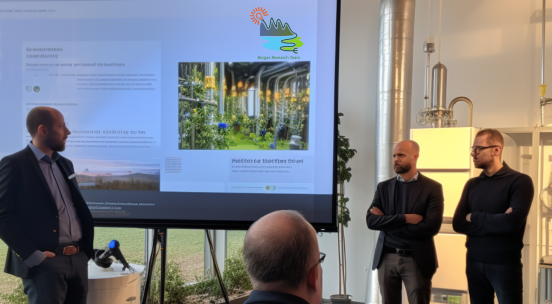
MCYR 2023 is starting on Thursday! Read about the keynote speeches
Unlocking Success: Navigating the Path of an Early Career Researcher by Assoc. Prof. Dr. Hynek Roubík; Publication Bias in Scientific Findings – the case of Prunus persica by Dr. Stacy Hammond; The Rise of Chatbots and Their Impact on Society by Dr. Milan Školník
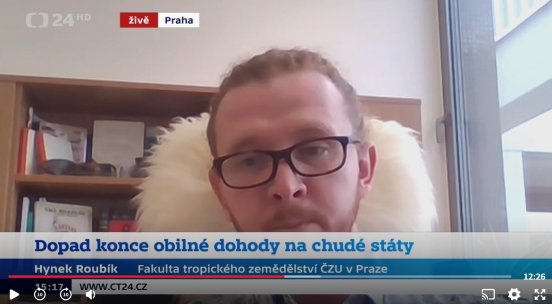
Hynek Roubík hostem ČT24: Konec obilné dohody a chudé státy
Poslechněte si rozhovor s Hynkem Roubíkem, vedoucím Biogas Resarch Teamu, který byl hostem České televize na téma "Konec obilné dohody a chudé státy". (čas 13:07)
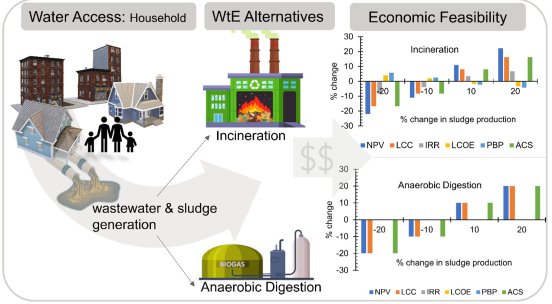
A new paper published! Techno-economic analysis of electricity generation from household sewage sludge in different regions of Nigeria
New paper published in the prestigious Science of the Total Environment journal by Charles Ogbu from BRT. The findings reveal that the North Central region has the highest potential for wastewater generation and collection, with the South East exhibiting the highest sewer collection rate.
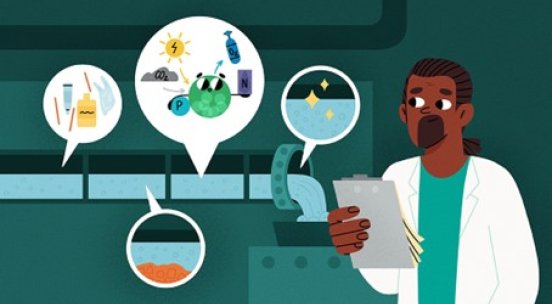
New paper published! Poo is Precious
New article published in Frontiers for Young Minds. This article is specifically written to connect curious minds to the experts and information that will motivate them to ask informed and critical questions about real science throughout their lives.
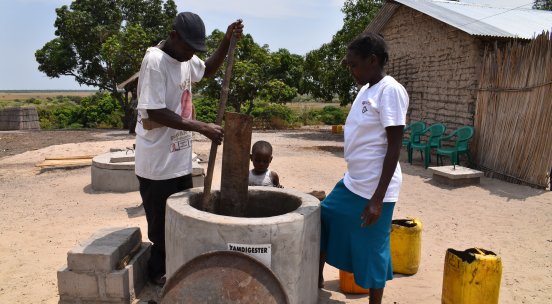
V západní Zambii úspěšně pokračuje projekt ČRA podporující ochranu životního prostředí stavěním bioplynáren
V rámci projektu s názvem Bioplynovou technologií k vyšší odolnosti komunit v Západní provincii Zambie realizovaného společností Člověk v tísni bylo postaveno již 45 bioplynáren. Ty umí z trusu zvířat a zbytků jídla vyrobit plyn, který mohou domácnosti jednoduše využívat k vaření nebo svícení. Plyn tak dokáže nahradit dřevo a dřevěné uhlí, na které je zde odkázána většina obyvatel. Biopalivovovou technologii zambijští venkované využívají nejen jako zdroj udržitelné energie pro domácnost, ale i jako vysoce efektivní organické hnojivo.
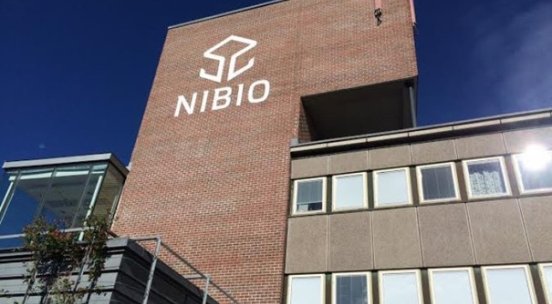
Exploring New Horizons in Biogas Technology and Waste Management in Norway
In the world of academia, collaboration is the key to unlocking new frontiers and advancing scientific knowledge. It is within this spirit of collaboration that Assoc. Prof. Dr. Hynek Roubík did a visit from Czech University of Life Sciences Prague to the esteemed Norwegian Institute of Bioeconomy Research (NIBIO). With a primary focus on biogas technology and waste management, this visit aimed to foster knowledge exchange and create new ways of collaboration between these two institutions.
Building Bridges through Collaborative Research
One of the main objectives of Assoc. Prof. Dr. Hynek Roubík's visit was to foster collaborative research projects between Czech University of Life Sciences Prague and NIBIO. The visit provided a valuable opportunity for experts from both institutions to come together, exchange ideas, and identify potential areas of research collaboration. Through insightful discussions and brainstorming sessions, they explored innovative approaches and research gaps in the field of biogas technology and waste management. By joining forces, these institutions aim to make significant contributions to the advancement of sustainable practices and solutions in these areas.
To enrich their understanding and facilitate fruitful collaborations, Assoc. Prof. Dr. Hynek Roubík had the opportunity of visiting the state-of-the-art laboratories at NIBIO. Beyond the laboratories, Assoc. Prof. Dr. Hynek Roubík had the opportunity to explore the facilities at NIBIO. These facilities play a crucial role in translating research findings into practical applications, allowing for real-world implementation of sustainable practices. From pilot-scale biogas plants to waste management systems, these facilities serve as testbeds for innovative technologies and solutions.
The visit of Assoc. Prof. Dr. Hynek Roubík to NIBIO exemplifies the spirit of collaboration and knowledge exchange that drives scientific progress. Through collaborative research discussions, laboratory visits, and exploration of remarkable facilities, the foundations have been laid for a fruitful partnership between Czech University of Life Sciences Prague and NIBIO.
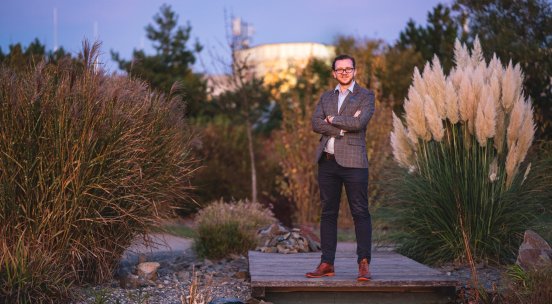
Interview with Assoc. Prof. Dr. Hynek Roubík – Founder of AgriSciences Platform
Let´s have a look how the time went with AgriSci-UA via interview with its founder. The idea for AgriSciences Platform emerged from a collective desire to support and empower young teachers, researchers, and students in the field of AgriSciences in Ukraine.

Hynek Roubík joining the Editorial Board of Biosystems Diversity
Group leader of Biogas Research Team – Assoc. Prof. Dr. Hynek Roubík is newly joining Editorial Board of Biosystems Diversity – journal focusing on all aspects of diversity in biology and ecology from the individual to the ecosystem level.
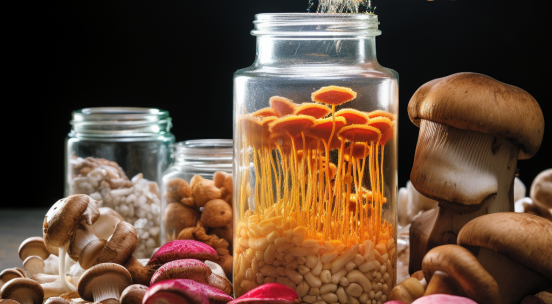
New paper published! Fungal solid-state fermentation of crops and their by-products to obtain protein resources: The next frontier of food industry
Exploring the Future of Food: Harnessing Fungal Solid-State Fermentation for Sustainable Protein Resources. And published in prestigious journal Trends in Food Science & Technology (IF- 16.002)
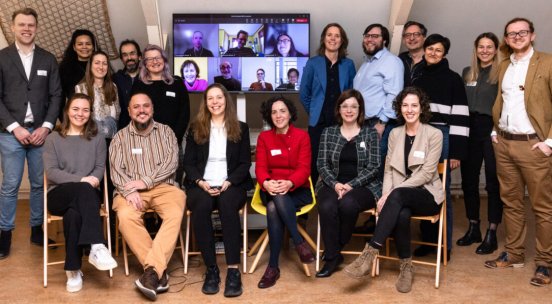
Hynek Roubík: Učiňme vědu otevřenou, transparentní a reprodukovatelnou
Reprodukovatelnost je zásadní pro pokrok a dopad výzkumu, vývoje a inovací, protože potvrzuje nebo opravuje výsledky jednotlivých studií. To vede k vyšší kvalitě výzkumu, spolehlivějším a využitelnějším výsledkům a ke snížení nákladů na výzkum. Začlenění reprodukovatelnosti do strategie a designu výzkumu by proto mělo být považováno za klíčový předpoklad kvality výzkumu.

COVID-19 crisis interlinkage with past pandemics and their effects on food security
An interdisciplinary research group CZU COVID-19 Response Team, which was led by our Group leader – Assoc. Prof. Dr. Hynek Roubík just published their work in Globalization and Health (one of the most prestigious journals, which is pioneering and transdisciplinary journal that situates public health and wellbeing within the dynamic forces of global development).
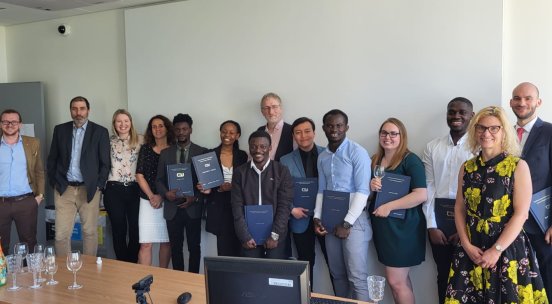
Congratulations to BRT students who successfully defended their thesis!
This year, five master students from Biogas Research Team successfully defended their thesis. Here you can read more bout their research activities.
BRT has a new PhD graduate! Congratulations to Dr. Ghaith Hasan
We are pleased to highlight the remarkable research work of Ing. Ghaith Hasan, who recently obtained his Ph.D. in the field of biogas technology under supervision of Assoc. Prof. Dr. Hynek Roubík (Group leader of Biogas Research Team). His thesis focuses on the social and economic assessment of small-scale biogas plants in Syria, a country that has faced significant challenges due to the ongoing civil war. Ing. Ghaith Hasan's research sheds light on the potential of biogas technology as a solution to the energy crisis and explores the prospects and challenges associated with its adoption in Syria.
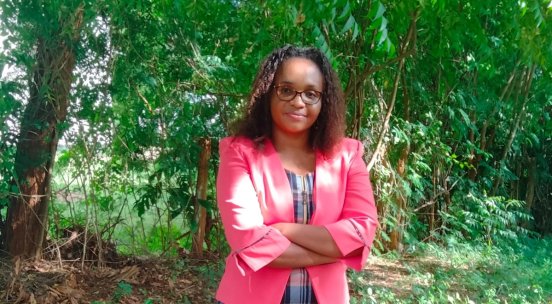
Interview with One Plant Fellowship Laureate - Esther Muindi
Dr. Esther Muindi is soil and water management expert from the school of agricultural Sciences and agribusiness, Pwani University. She is passionate about climate change mitigation and would like to study green house gases (GHGs) associated with biogas technology during her 6 months postdoc period with the Czech University of Life Sciences Prague - Biogas Research Team.
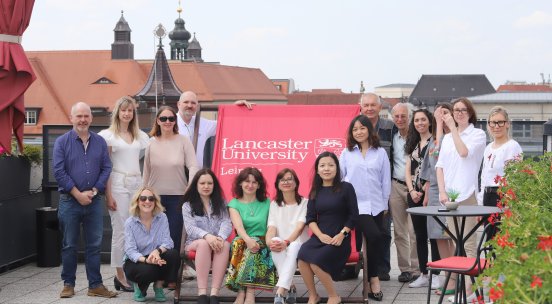
Participation in Plant-Soil Restoration Universities UK International (UUKi) Twinning Network Workshops (Germany)
Dr. Yelizaveta Chernysh (in person) and Dr. Viktoriia Chubur (online) took part in hybrid form in the Plant-Soil Restoration UUKi Twinning Network Workshops, which took place on July 4-5, 2023, at the Lancaster University Campus in Leipzig, Germany.
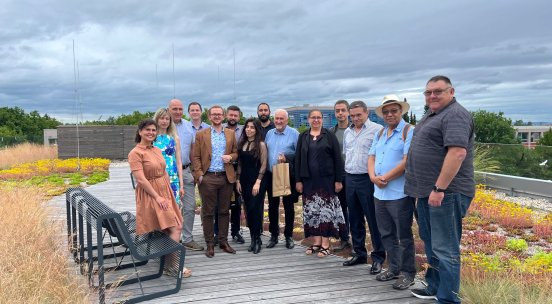
Phosphogypsum Processing to Critical Raw Materials: Third Project Meeting III
Welcome to the exciting world of phosphogypsum processing and its potential in generating critical raw materials. The recent Project Meeting III, held from 22nd to 25th June 2023 at CZU in Prague, Czech Republic, brought together a diverse group of experts and researchers to discuss their progress and explore innovative solutions in this field. Let's delve into the highlights of this engaging event!
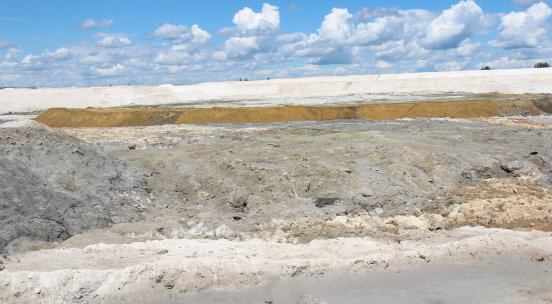
New paper published! Phosphogypsum circular economy considerations: A critical review from more than 65 storage sites worldwide
As part of the PG2CRM project, new research article is available online in Journal of Cleaner Production. Phosphogypsum (PG), a byproduct of phosphate fertilizer production, is a significant global waste stream, with almost 300 million tons generated annually. Unfortunately, only a small portion undergoes further processing, while the majority is stacked or discharged into coastal waters. In this engaging research article, we delve into a critical review that explores the physical-chemical properties of PG from sedimentary and magmatic phosphate ore. The study draws upon extensive research spanning over 25 years, conducted at École des Mines de Saint-Étienne, and examines samples from 67 industrial storage sites worldwide. Join us as we uncover the challenges and potential solutions for utilizing PG in a circular economy framework.
Understanding PG's Properties
To shed light on the characteristics of PG, various analytical tools were employed, providing valuable insights into its physical-chemical properties. The review highlights the low radioactivity found in PG, particularly those derived from sedimentary phosphate rock. While this makes PG a potential raw material for construction, it also poses challenges in terms of regulatory compliance and public perception. Additionally, water-soluble and volatile chemical compounds within PG present environmental management hurdles that need to be addressed.
Global Perspectives and Laboratory Synthesis
By considering PG samples from storage sites worldwide, the review provides a comprehensive global perspective on the composition and challenges associated with PG management. Furthermore, laboratory-synthesized PG samples created under different conditions contribute to a deeper understanding of the material's behavior and potential applications. The authors meticulously analyze the findings, critically assessing the implications for sustainable management strategies.
?
Advancing Towards Circular Economy
Although PG may not pose an immediate threat to the environment, the review advocates for a shift in the approach to PG management. Rather than relying on storage or disposal, the authors emphasize the importance of processing all PG to eliminate potential long-term risks and harness its potential as a relevant secondary resource. By integrating PG into a circular economy framework, its value can be maximized, contributing to sustainable resource utilization and reducing waste generation.
Conclusion
This critical review sheds light on the global landscape of PG production, storage, and potential utilization. By providing a comprehensive analysis of PG's physical-chemical properties, the study highlights the challenges associated with its circular economy integration. With a strong focus on long-term risk mitigation and resource optimization, the authors advocate for processing all PG to unlock its full potential. This research sets the stage for further exploration and collaboration, aiming to transform the perception of PG from waste to a valuable resource within the global phosphogypsum circular economy.
As we embark on a path towards a more sustainable future, incorporating the findings of this review can lead to innovative solutions in PG management, fostering environmental stewardship and supporting the transition to a circular economy paradigm.
Stay tuned for further research and developments in this critical field as we work towards unlocking the hidden potential of phosphogypsum and about our project PG2CRM!
Article is available (Open Access) here: https://doi.org/10.1016/j.jclepro.2023.137561
This work was supported by Technology Agency of the Czech Republic (TA CR) [Grant Number: TH79020003] under the coordination of the ERA-MIN3 action, which has received funding from the European Union under the Horizon 2020 Program [European Commission Grant Agreement No. 101003575]
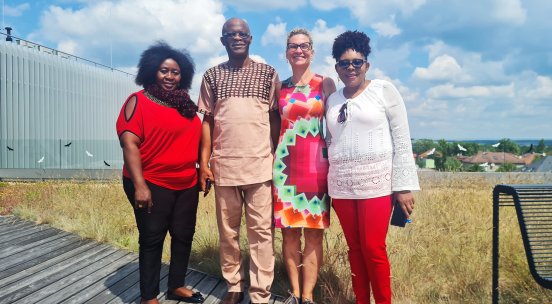
Lecture Invitation: Prof. Julius Kewir Tangka, Dr. Viyoi Catherine Tidze and Dr. Esther Etengeneng Agbor
Are you interested in advances in renewable energy research or sustainable energy sources in sub-Saharan Africa? We would like to invite you to special lectures given by Professor Julius Kewir Tangka and Doctor Viyoi Catherine Tidze. The lectures will take place on Tuesday, June 20 at 13:00 in room 401, Faculty of Tropical AgriSciences.
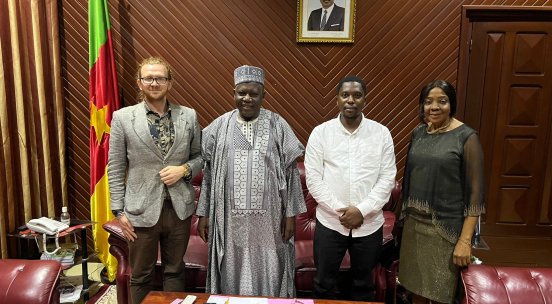
Transforming Waste Management and Biogas in Cameroon: A Journey of Knowledge Exchange and Collaboration
From 1st to 11th of June, Assoc. Prof. Dr. Hynek Roubík (Group leader of BRT) and Chama Theodore Ketuama (PhD candidate from BRT) visited Cameroon as part of Erasmus credit mobility program
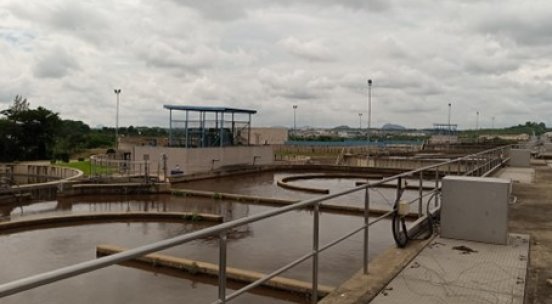
A new paper published! Estimating the Ecological Performance of Water and Wastewater Treatment in Africa: A Meta-Analysis
Access to clean water and effective wastewater treatment systems is vital for sustainable development, economic growth, and human health. However, the effectiveness of these systems can vary widely, and it is essential to understand the environmental impact of different treatment methods.
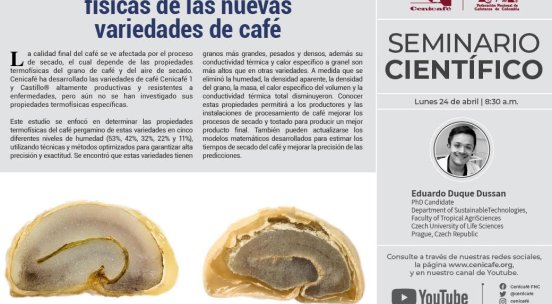
Behind the Beans: Exploring the Secrets of Colombian Coffee
One year ago, I was offered an internship at the National Coffee Research Centre of Colombia (Cenicafé). Cenicafé has bred new coffee varieties resistant to diseases, so it seemed relevant to calculate these thermal and physical properties because the country is rapidly changing and renewing the coffee crops towards disease-resistant types.
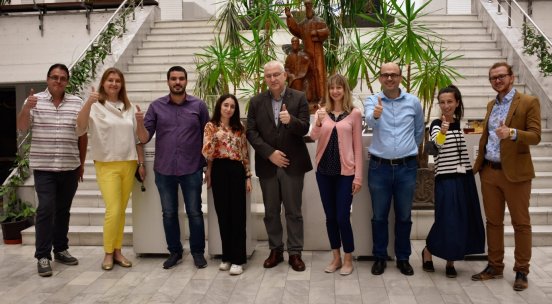
SCORE project bringing new view on the wicked problems
Wicked problems are complex, multi-dimensional challenges that resist simple solutions. Examples include climate change, poverty, inequality, and health epidemics. These problems require a deep understanding of the complex interactions between different systems and stakeholders, as well as innovative and interdisciplinary approaches to solving them.
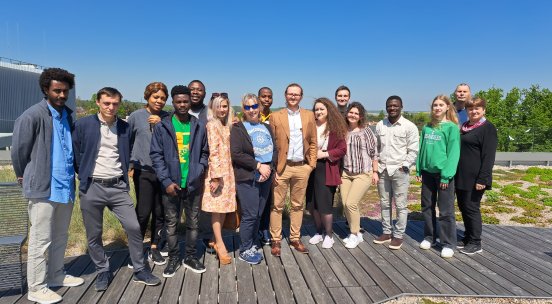
MCYR 2023: Empowering Young Researchers for Multidisciplinary Exploration
The first pre-conference workshop already happened in May and more of MCYR is coming up! Welcome to the Multidisciplinary Conference for Young Researchers (MCYR) blog post!
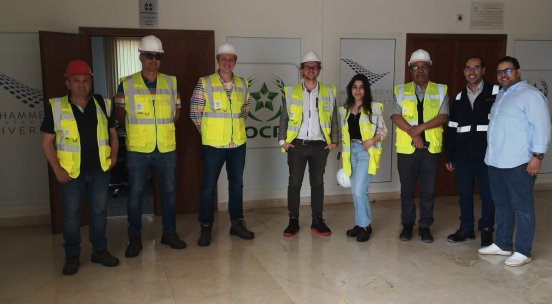
PG2CRM meeting in Morocco
Phosphogypsum is a by-product of the phosphate fertilizer industry and is considered an environmental challenge due to its high radioactivity and large quantities generated. However, our project called PG2CRM aims to turn this waste into a valuable resource by extracting critical raw materials.
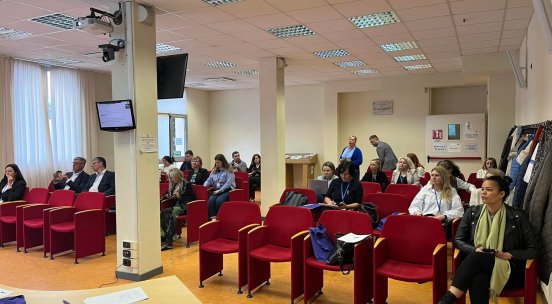
New project just started! UNICOM: Universities-Communities: strengthening cooperation
Are you interested in promoting innovation and social development in Ukraine? That is what our new project UNICOM is aiming on. It aims to enhance university-community cooperation in Ukraine using experiences from various countries.
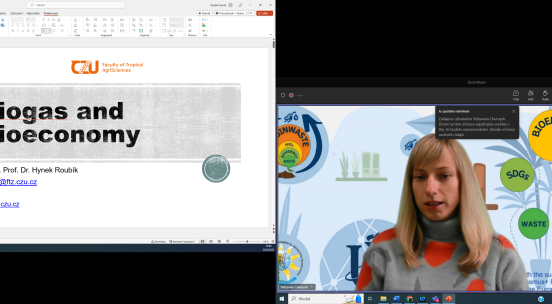
BIOINWASTE project
On 28 April 2023, the second day of the spring school "EU implementation of bioenergy technologies for waste recycling" under the Jean Monnet module "Bioenergy innovations in waste management: European experience in implementing a circular economy" (BIOINWASTE) of the EU Erasmus+ program, dedicated to Bioeconomy as a basic for green growth, the relationship between the circular economy and biotechnology in various industries and the green course of biotechnology growth.
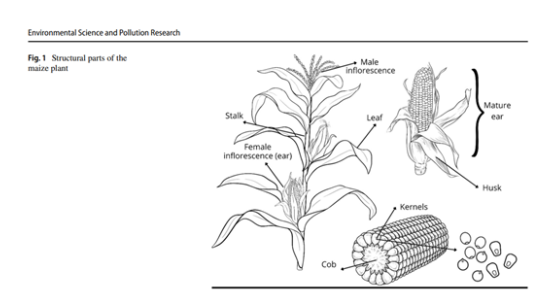
A new paper published! Influence of macronutrients and micronutrients on maize hybrids for biogas production
Maize is one of the most widely cultivated crops globally, and its production has been increasing in recent years. Maize is commonly used for animal feed and human consumption, but it is also a valuable crop for biogas production. Biogas is an environmentally friendly energy source that can be produced from various organic materials, including maize silage.
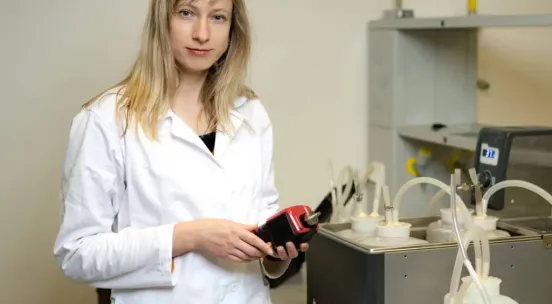
Významný přínos ukrajinské vědkyně k výzkumu výroby bioplynu na České zemědělské univerzitě
Do České republiky přijela Doc. D.Sc. Yelizaveta Chernysh, PhD. ze Sumy State University na Ukrajině vloni v březnu, a hned navázala na dlouhodobou spolupráci s Biogas Research Team vedeným docentem Hynkem Roubíkem z Fakulty tropického zemědělství ČZU. „V České republice se mi moc líbí, obzvlášť Praha a její historická část, ale pro mne je to tady především o pokračování ve výzkumu,“ říká docentka Chernysh.
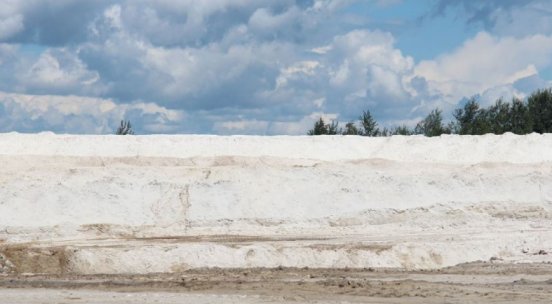
Budoucnost výroby kritických surovin z odpadních látek v rukách odborníků z ČZU v Praze
Tým docenta Hynka Roubíka z Fakulty tropického zemědělství ČZU v Praze se ve spolupráci s dalšími evropskými partnery věnuje tématu fosfosádrovce. Projekt je podpořen výzvou ERAMIN.
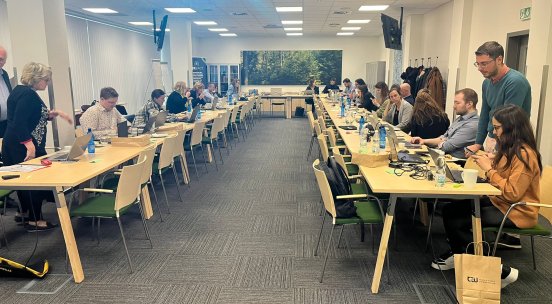
CEE2ACT consortium meeting in Prague
The CEE2ACT Consortium met in person for a project meeting on 21-22 March 2023. The two-day meeting was hosted by the Czech University of Life Sciences in Prague (Czech Republic).
On the first day, the Consortium was able to review the progress of the first 6 months of the project, aiming at empowering Central and Easter European countries to develop national bioeconomy strategies through innovative governance models and knowledge transfer activities.
In particular, the project partners discussed the assets and business models of the 10 CEE2ACT national bioeconomy hubs, and two digital solutions were presented – the online inventory of best practices and the B2B matchmaking tool.
On the second day, the consortium joined an interactive peer learning session dedicated to knowledge transfer and capacity building activities. The 17 partners discussed the different challenges and main elements for the bioeconomy roadmaps in the target and contributing countries.
This two-day meeting was a great opportunity to connect and accelerate our work to support the bioeconomy transition in Europe!
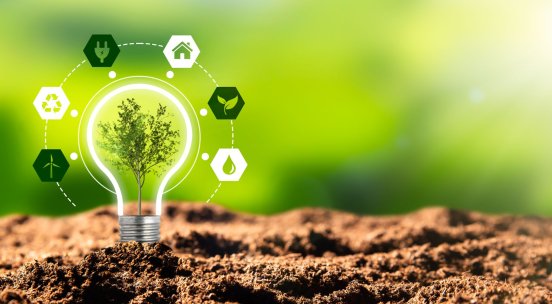
New Interreg project starting! BIOECO-UP kick-off meeting in Hungary
The bioeconomy concept seeks to replace fossil resources with renewable raw materials in as many areas and applications as possible. The BIOECO-UP project widely establishes this concept across central Europe. The BIOECO-UP will design new circular value chains for the bioeconomy and change consumer behaviour. BIOECO-UP will also support the policy level to push ahead with the transformation.
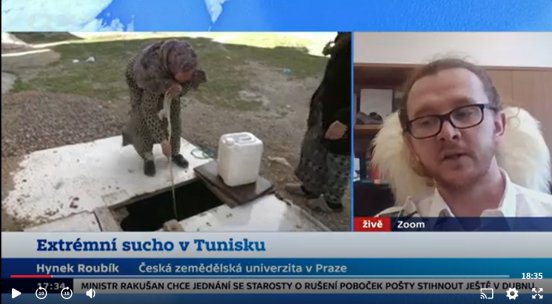
Rozhovor s Hynkem Roubíkem na ČT24 na téma "Extrémní sucho v Tunisku"
Poslechněte si rozhovor s Hynkem Roubíkem na ČT24 na téma "Extrémní sucho v Tunisku", který proběhl 6. dubna 2023.
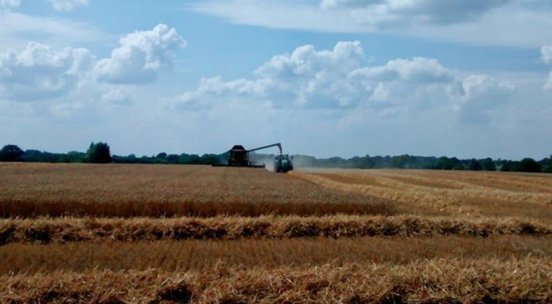
Invited lecture by Prof. Lesia Karpuk: “Crop production: opportunities and challenges in UKRAINE” which took place on Monday 19th
Prof. Lesia Karpuk is a Professor at Bila Tserkva National Agrarian University (Ukraine). Nataliia Dyman is a Master of Ecology, a junior lecturer at the Department of language training for foreign students at Bila Tserkva National Agrarian University
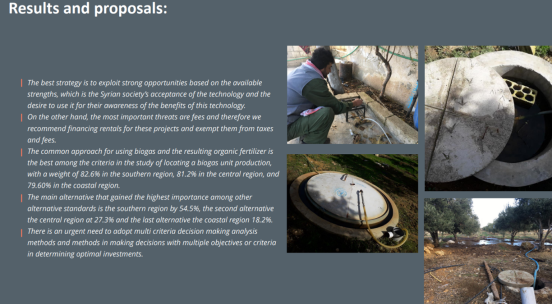
A new paper published! Assessment of the incubating environment for investment in biogas technology in Syria by using AHP and SWOT
Since 2011, the Syrian war has resulted in a massive energy supply shortage, making it difficult for people to access the energy they need for their daily lives. Renewable energy adoption can help to address this issue, and this is where biogas technology comes into play.
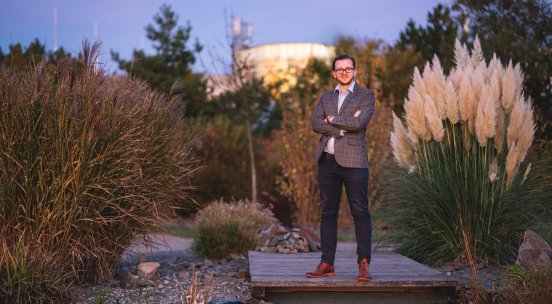
Planeta Země má svátek jednou v roce, její budoucnost je výzvou pro každý den
Den Země si 22. dubna připomíná více než miliarda lidí. Narozdíl od jiných svátků je spíše mementem a varováním před dopadem lidského počínání na zdravotní kondici planety. Kořeny má ve Spojených státech, kde se poprvé slavil v roce 1970. O dvacet let později se k této tradici připojily na dvě stovky zemí včetně České republiky. Doc. Hynek Roubík z katedry udržitelných technologií Fakulty tropického zemědělství vnímá Den Země jako každoroční připomínku, jak důležitá je péče o naši planetu a jaké jsou následky, pokud s ní nezacházíme udržitelným způsobem.
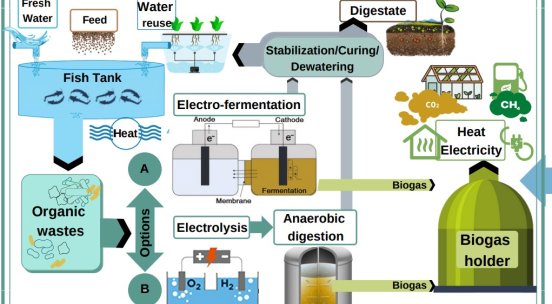
A new paper published! “Intensification of Waste Valorization Techniques for Biogas Production on the Example of Clarias gariepinus Droppings”
In this paper, we describe the results of a study of the effect of electric current on the anaerobic digestion of clariid catfish excreta and comparison with the addition of stimulating substances (humates and zeolites). When the main metabolic pathways for electron acceptor recruitment were identified using bioinformatics databases, a model of methanogenesis was generated by blocks of enzymatic reactions.
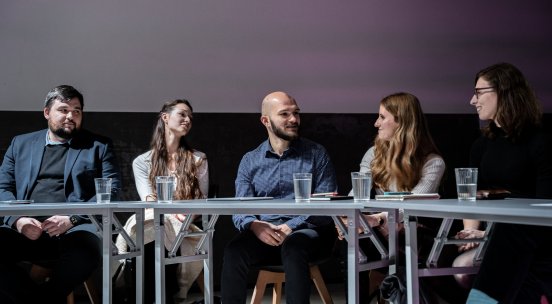
Our group leader as member of the new Advisory board to the Czech Minister of Science
On Wednesday, February 15, 2023, the new informal advisory body of the Minister of Science, Helena Langšádlová, consisting of young talented scientists, innovators, met for the first time. Assoc. Prof. Dr. Hynek Roubík was invited to join this Advisory board as well.
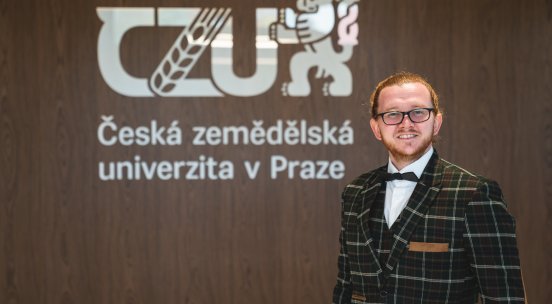
Dean´s award 2022 is going to the Biogas Research Team!
Group leader of BRT Assoc. Prof. Dr. Hynek Roubík has been selected and rewarded by the Dean Prof. Patrick Van Damme and the members of Dean´s College for his contribution, both scientific and in terms of popularization of science.
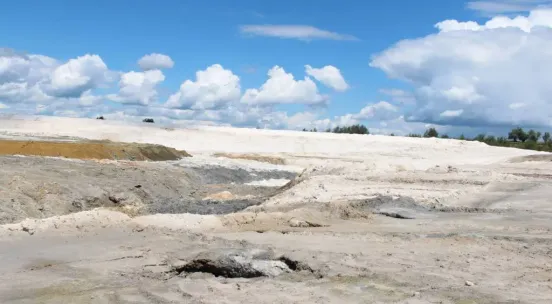
Jak zpracovat fosfosádrovec na kritické suroviny? Recept znají vědci z ČZU
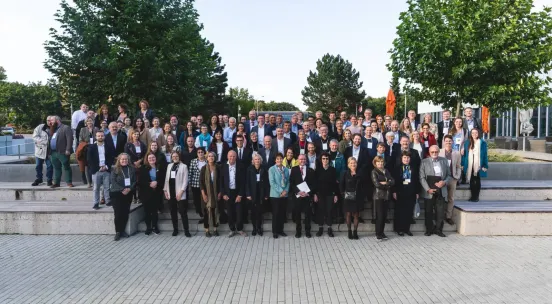
Mladí vědci z Evropy se sešli na mezinárodní konferenci v Praze-Suchdole
Více než tři stovky mladých vědců a zaměstnanců prestižních evropských univerzit přivítala v pátek 23. a v sobotu 24. září 2022 ve svém kampusu Česká zemědělská univerzita v Praze. Konferenci každoročně pořádá Euroleague for Life Sciences (ELLS) a zve na ni studenty a akademiky partnerských univerzit. Hlavním tématem letošní studentské části byla „Propojenost věcí: Cesta k udržitelným řešením“.
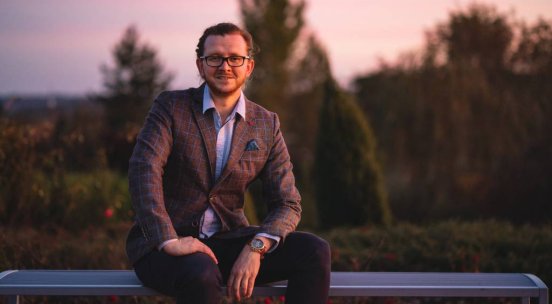
Potravinová bezpečnost v zemích Globálního Jihu v reakci na válku na Ukrajině
Rozhovor z 29.3.2021 s jedním z historicky nejmladších docentů v ČR Hynkem Roubíkem z Fakulty tropického zemědělství ČZU v Praze na téma „Potravinová bezpečnost v zemích Globálního Jihu v reakci na válku na Ukrajině.“
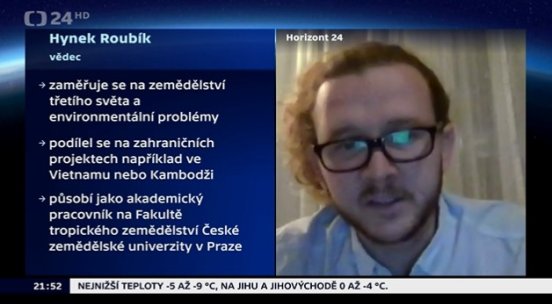
Ekosystém Mekongu je kvůli přehradám v ohrožení, rozhovor s doc. Roubíkem na ČT24
„Můžeme určitě mluvit o hrozbě potravinové krize. Bude se to dít postupně, ale dopady jsou samozřejmě obrovské. Bude to i dalekosáhlá ekologická a socioekonomická krize pro velké množství lidí,“ řekl v Horizontu ČT24 Hynek Roubík z katedry udržitelných technologií Fakulty tropického zemědělství České zemědělské univerzity v Praze.
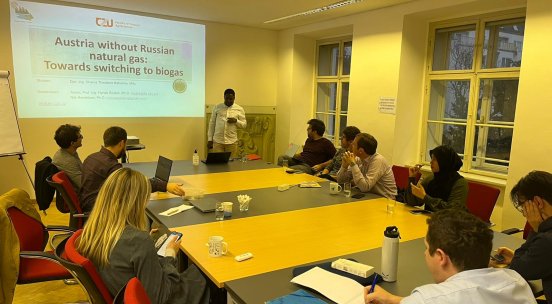
Biogas Research Team visits Complexity Science Hub, Vienna
A joint meeting of the Biogas Research Team, Czech University of Life Sciences Prague and the Complexity Science Hub (CSH) was held in Vienna on 5th December 2022. The aim of the meeting was to establish research cooperation between both institutions and the Danube University Krems. The future work seeks to investigate pathways of substituting natural gas with biogas.
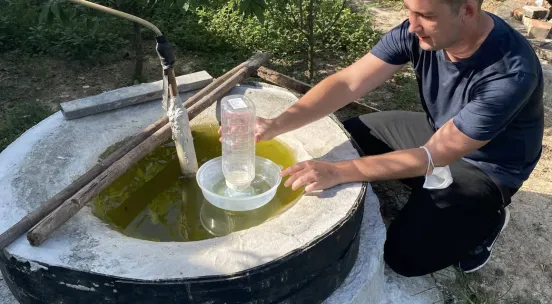
Češi pomáhají rozvíjet bioplynové stanice ve Vietnamu
Vysoké emise skleníkových plynů jsou bohužel stále aktuálním a palčivým tématem, stejně jako energetické zdroje. K řešení situace by měly pozitivně přispívat bioplynové stanice.
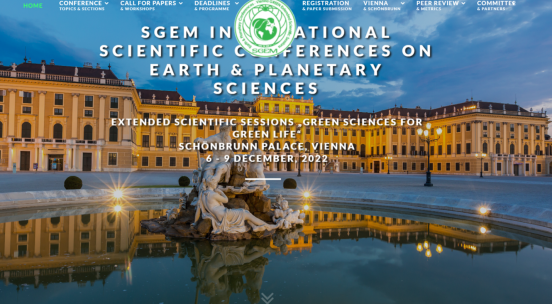
BRT presenting at SGEM Vienna Green Conference 2022
The XXIInd SGEM International Multidisciplinary Scientific GeoConference – “Green Sciences for Green Life”, was held in Schönbrunn Palace, Vienna, from 6 - 9 December 2022. The SGEM (Survey, Geology, Ecology and Management) conferences are focused on global warming, climate change, CO2 reduction, biodiversity, and green technologies for a sustainable future. The main goals of SGEM GeoConference are to raise awareness of both scientists and common people for the pressing ecological issues and to create a revolutionary forum for sharing and collaboration among the scientific society.
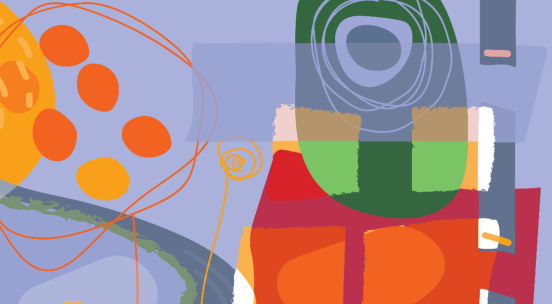
Group leader of Biogas Research Team is joining Editorial Board of one of the Nature Portfolio journals
Assoc. Prof. Dr. Hynek Roubík is joining Nature Portfolio journal: Humanities & Social Sciences Communications as an Editorial Board member
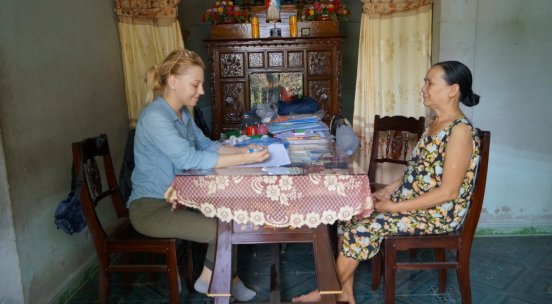
A new paper published! “Dis-adoption of small-scale biogas plants in Vietnam: what is their fate?”
In this paper, we revealed the fate of abandoned small-scale fixed-dome biogas plants in rural areas in central Vietnam.
Highlights:
Despite the large number of small-scale biogas plants being built in Vietnam, there is an increase in the reported cases of their dis-adoption by farmers with no official evidence.
With a typical lifespan of 20 years, small-scale biogas plants were found to be abandoned after 6 years (on average) in operation for anaerobic digestion.
Abandoned small-scale biogas plants were mainly not used for any other purposes within rural households. However, biogas plants initially connected to the household toilet were observed in use for human excreta storing after the dis-adoption.
Predominantly, failures in feedstock supply for biogas production led to the abandonment of biogas plants. Anaerobic digestion technology did not remain beneficial for farmers as practice for organic waste management when difficulties related to keeping pigs occurred. An important lesson of the biogas technology dis-adoption in Vietnam is the danger posed by African swine fever outbreaks in the area.
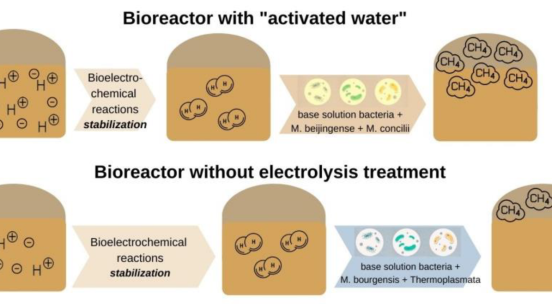
A new paper published! "Methods for Intensifying Biogas Production from Waste: A Scientometric Review of Cavitation and Electrolysis Treatments"
General trends in waste minimization stimulate the transition from linear to circular waste management systems. Therefore, developing environmentally sound biotechnologies for waste recycling and further utilization in the form of various biocomposite products and the production of biofuels is considered promising.
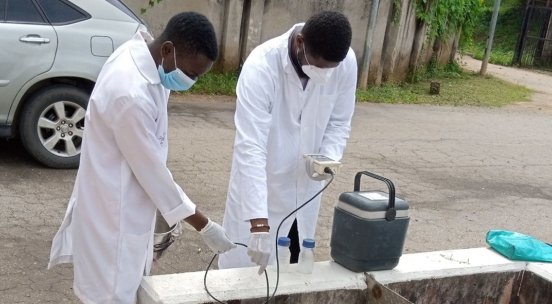
Strengthening cooperation between CZU and University of Ibadan
Internship and data collection in Nigeria of Charles Ogbu. Between August and September 2022, Charles Ogbu, associated member of Biogas Research Team under co-supervision of Assoc. Prof. Dr. Hynek Roubík, visited Nigeria for data collection in relation to his PhD thesis: “Life cycle assessment of wastewater treatment-based resource recovery in Nigeria”. He was hosted by the Department of Agricultural and Environmental Engineering, University of Ibadan (UI), Ibadan.
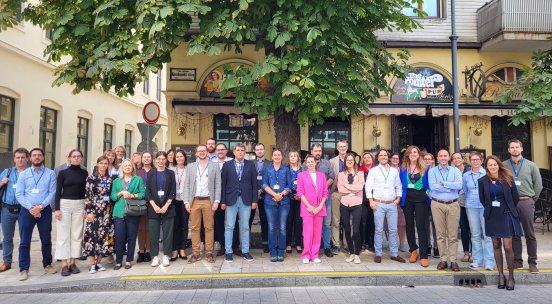
CEE2ACT PROJECT KICK-OFF MEETING AND CONFERENCE SUMMARY
On 13-14 September 2022, representatives of 17 European organisations from 17 countries gathered in Budapest at the kick-off meeting of the CEE2ACT project, funded under the European Union’s Horizon Europe Research and Innovation programme.
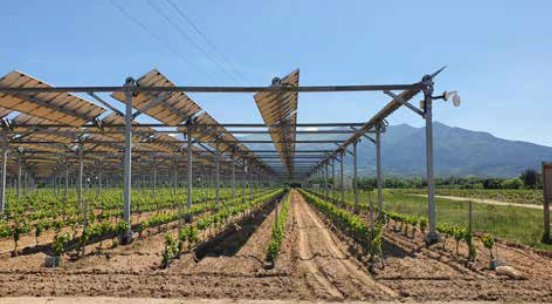
Když si podají ruce zemědělství a solární energetika, vznikne agrivoltaika
Fotovoltaika v tradičním pojetí se mění. Jejím novým vývojovým stupněm se stává agrivoltaika, která dává možnost smysluplně propojovat zemědělskou činnost s výrobou solární energie. V budoucnu tak budeme moci od zemědělců odebírat nejenom potraviny, ale i lokální zelenou elektřinu.
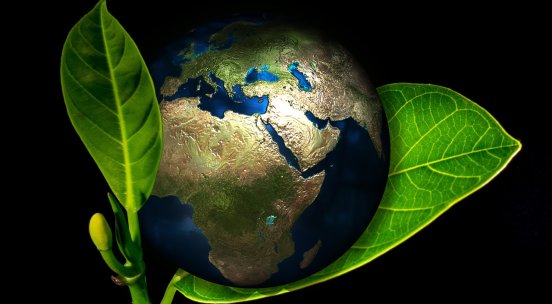
Special Issue "Environmental Implications of COVID-19 Pandemic II"
Assoc. Prof. Dr. Hynek Roubík, Group leader of BRT is coordinating second edition of Special Issue for Environments.
Dear Colleagues,
The COVID-19 pandemic affects everyone; therefore, we intend to identify global environmental challenges resulting from this crisis. The worldwide disruption caused by the pandemic has led to numerous impacts on the environment. These effects have both positive and negative consequences, which need to be systematically and empirically described.
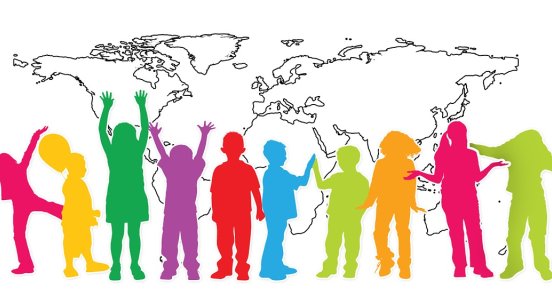
Congratulations to Ing. Yehor Nykyforov, Ing. et Ing. Babatunde Tijani Liasu and Ing. Victor Adedeji Abiodun, who successfully defended their thesis!
Babatunde Tijani Liasu was master student at the Biogas Research Team under the supervision of Associate Professor Hynek Roubík with his research focused on:
“Small-Scale Biogas Technology in Nigeria - Perspective of rural areas”
Objective of this study was to present the state of the art and research challenges of small-scale biogas plants in Nigeria, assess the current perspective and provide the necessary recommendations for future development of this technology in rural areas.
Thanks goes also to prof. Temitayo Abayomi Ewemoje, Ph.D. from University of Ibadan (Nigeria), who was reviewer and opponent of this thesis.
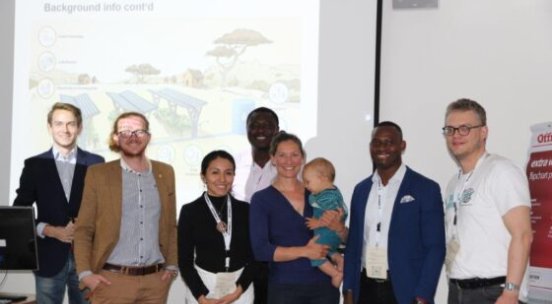
Tropentag Workshop organized at Czech University of Life Sciences in Prague
Agrivoltaic (APV) technique in farming is an emerging multi-billion industry, which is catching the attention of various stakeholders in developed and developing economies of late. As already announced, this practical workshop organized in Prague has indeed generated a lot of information needed to understand the technique of APV and associated business models to maximize APV projects that are implemented in the context of developing countries. Thus, the expectations including the main aim of this organized workshop that was held on 16.09.2022 in Prague have been met.
Read about the workshop HERE.
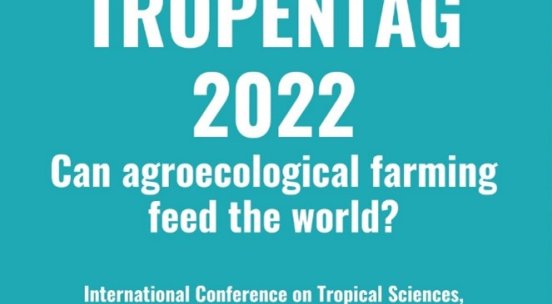
Tropentag 2022
Biogas Research Team had a strong presence again at the Tropentag conference! Our colleagues Lydia Mawar and Chama Theodore Ketuama participated in the Tropentag 2022 conference organized from September 14 to 16, 2022, at the Czech University of Life Sciences Prague (Faculty of Tropical AgriSciences). Tropentag is an annual international conference on research in tropical and subtropical agriculture and rural development.
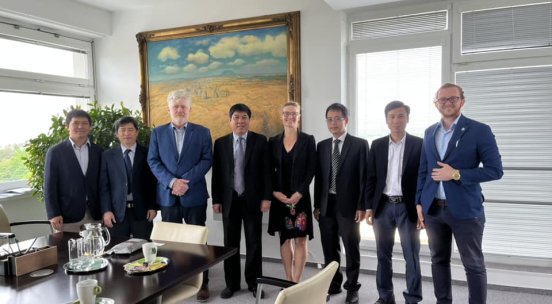
Strengthening ties between CZU and HUAF
The 15-year cooperation between the Faculty of Tropical AgriSciences CZU in Prague and the University of Agriculture and Forestry in Hue, Vietnam was newly expanded by taking on board the staff members of the Faculty of Forestry and Wood Sciences on a recent visit to Vietnam.
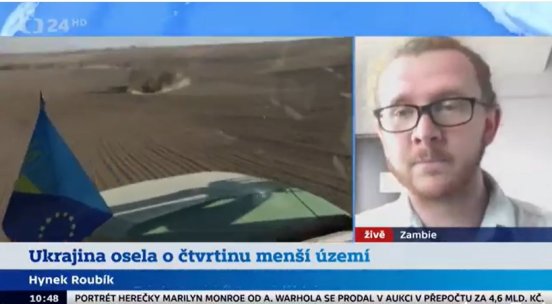
Hynek Roubík hostem ČT24: Ukrajina osela o čtvrtinu menší území
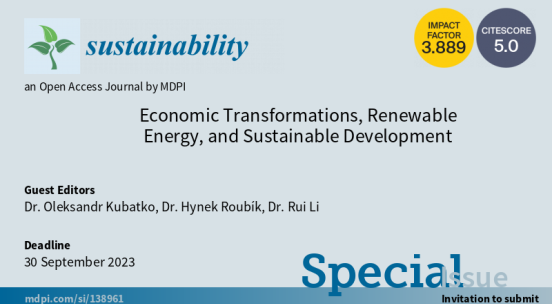
Special Issue "Economic Transformations, Renewable Energy, and Sustainable Development"
Dear Colleagues, humanity is entering a phase of transitioning to new socio-economic formations that are now taking place within Industries 4.0 and 5.0. Recent trends in human capital development, such as intellectualization, increased communication, internationalization, acquisition of skills, customization, and communication with consumers, align with Industries 4.0 and 5.0. The socio-economic transformations caused by disruptive technologies, such as blockchain, big data analytics, the Internet of Things, virtual reality, augmented reality, advanced virtual reality, artificial intelligence, algorithmic techniques, simulations and gamification, space colonization, renewable energy, high-speed travel, medical innovations, and 3D printing, could have positive and negative effects on sustainable development. Positive impacts include the dematerialization of industrial metabolism and less ecological impact on nature. The negative consequences of disruptive technologies are difficult to predict, but may include information vulnerability; increasing information dependence; the risk of creative potential reduction; the increasing cost of waste in the green economy; loss of jobs; a decrease in privacy; hacking, the loss of human control over cyber systems, etc.
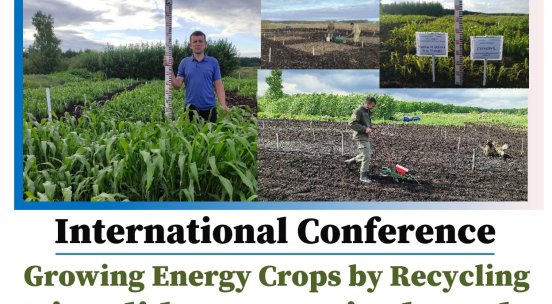
International Conference Growing Energy Crops by Recycling Biosolids on Marginal Lands
We are in conjunction with several universities and institutes in Ukraine and the U.S. organizing a VIRTUAL international conference entitled “Growing bioenergy crops by recycling biosolids on marginal lands” on September 22, 2022. This conference will be based on our U.S.-CRDF Global and Ukrainian Ministry of Education funded project on alternate energy.
The conference is FREE to join but you and your colleagues will need to register electronically. Details are in the attached flyer. More details at http://igim.org.ua/?p=8825
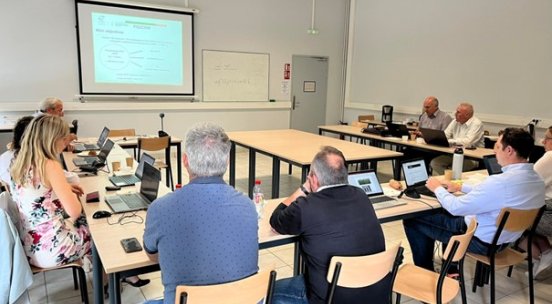
Phosphogypsum Processing to Critical Raw Materials - Kick off Meeting
In September, PG2CRM kick off meeting took place in France. Partners from all the institutions involved in the project met in Saint-Etienne, France.
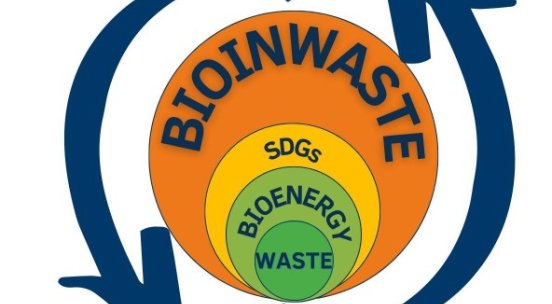
BIOINWASTE
Bioenergy innovations in waste management: European experience in implementing a circular economy
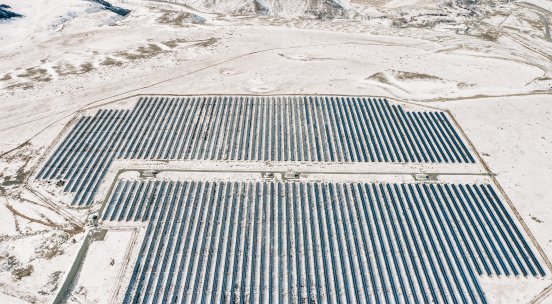
A new paper published! „Renewable energy powered membrane desalination — review of the recent development"
Due to current water stress, there is a problem with hygiene and sanitation in many parts of the world. According to predictions from the United Nations, more than 2.7 billion people will be challenged by water scarcity by the middle of the century.
Brighter future for rural household biogas in Zambia
The Biogas Research Team, in collaboration with People in Need (PIN) and Keepers Zambia Foundation (KZF), conducted a feasibility study on a project to promote biogas technology in the Western Province of Zambia. This Province is still largely dependent on fuelwood and charcoal for household cooking energy supply, especially in poor households. The biogas project will help smallholder farmers have greater food and nutrition security and greater resilience to climate change. As part of the study, two main types of biogas plants, including the ZamDigester (fixed dome type) and ZambiDigester (smaller version based on prefabricated model) have been tested and promoted. In the initial phase, the project targets 130 farmers in Mongu and Kalabo Districts with the purpose of training them on the importance of using biogas to combat the impact of climate change, such as deforestation. In the subsequent phases, the construction of a series of communal biogas plants will start based on the feasibility study.
A news report by Spring24 TV Zambia on the tested biogas plants is available on https://fb.watch/eDWc0XA7Ty/
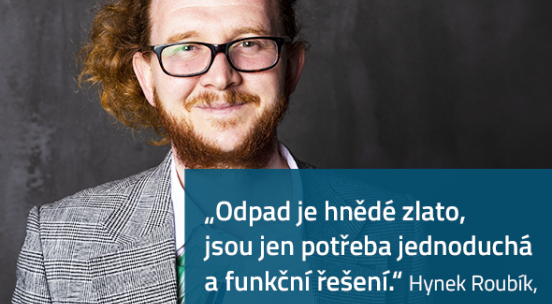
Ve Vietnamu bioplynky vítají, v Česku jsme pomalejší, říká expert
Hynek Roubík je jedním z nejmladších docentů v Česku, působí na Fakultě tropického zemědělství České zemědělské univerzity a povídal si s námi o tom, jaký je potenciál energetického využití odpadu nebo vzájemného soužití energetiky a zemědělství.
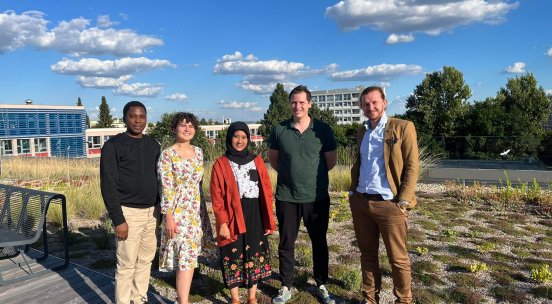
Visit to BRT from Danube University Krems (Austria)
Within the 2-year Czech-Austrian project called: “Opportunities and Challenges for Anaerobic Systems in the Global South”, Dr Nils Haneklaus arrived at the first in-person 9-day visit.
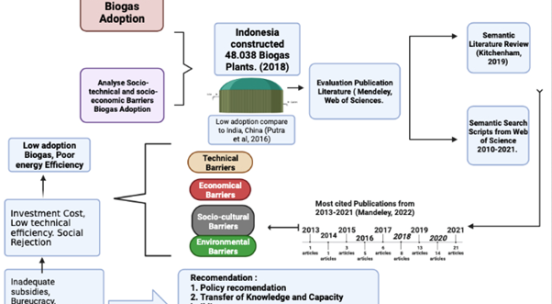
New paper published! Technological, Economic, Social and Environmental Barriers to Adoption of Small-Scale Biogas Plants: Case of Indonesia
In this paper, we are filling the gap by offering a systematic and thorough review. Indonesia must discontinue using fossil fuels and find alternatives to the energy it now uses. Despite its enormous potential, Indonesia only has 48,038 biogas plants, which is still considered a small number when compared to China and India.
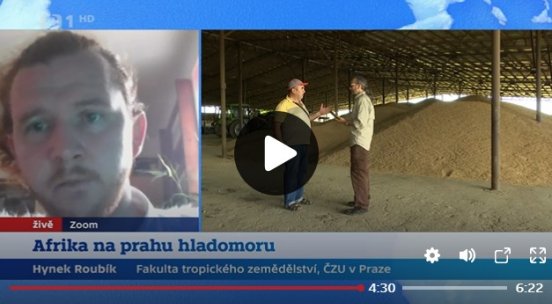
Somálsku hrozí hladomor. Na vině jsou velká sucha i nevýkonné zemědělství
„Šlo již o čtvrté neúspěšné období dešťů. Čeká se, že počet lidí, kteří budou čelit hladu, vzroste až na sedm milionů,“ řekl ČT24 Hynek Roubík z Fakulty tropického zemědělství České zemědělské univerzity.
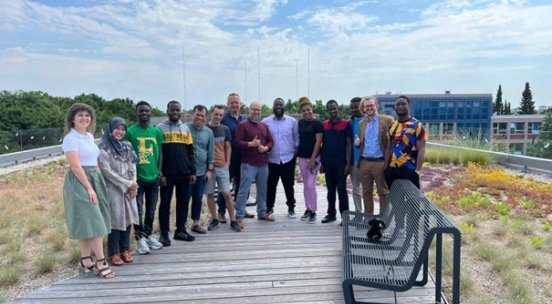
Invited lectures (biogas) from Ecotechnologies Laboratory, Institute of Biosystems Engineering, Poznań University of Life Sciences!
In the week from 13th to 17th of June (2022) we hosted invited lectures from Dr. Jakub Mazurkiewicz and Dr. Damian Janczak from Poznań University of Life Sciences.
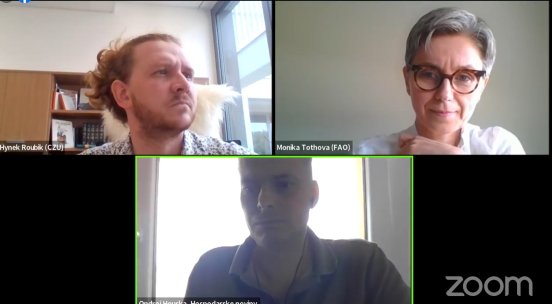
Café Evropa online: Potravinová bezpečnost a válka na Ukrajině
Sledujte záznam debaty, jejímiž hosty byli Hynek Roubík, vědecký pracovník, Česká zemědělská univerzita v Praze a Monika Tóthová, ekonomická expertka, Organizace OSN pro výživu a zemědělství (FAO)
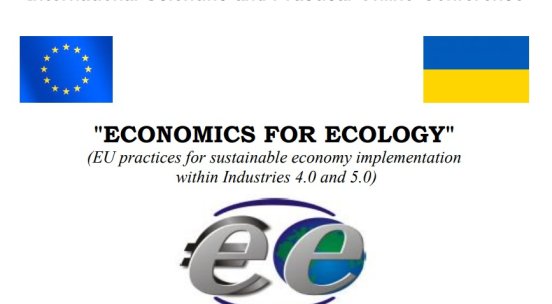
"ECONOMICS FOR ECOLOGY" International Scientific and Practical Online Conference
DEAR COLLEAGUES! We invite scientists, teachers, doctoral students, graduate students, applicants, students, government officials and local governments, and business representatives to participate at the International Scientific and Practical Online-Conference "Economics for ecology" which will be held on May - June 31–01, 2022 in Sumy, Ukraine
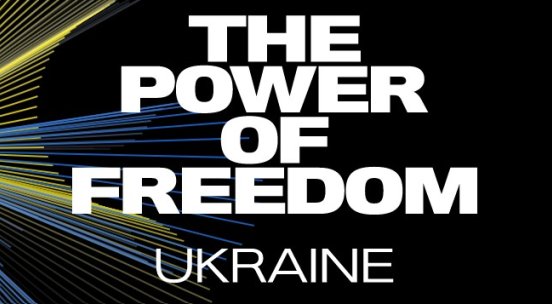
United24: The initiative of the President of Ukraine
UNITED24 was launched by the President of Ukraine Volodymyr Zelenskyy as the main venue for collecting charitable donations in support of Ukraine. Funds will be transferred to the official accounts of the National Bank of Ukraine and allocated by assigned ministries to cover the most pressing needs:
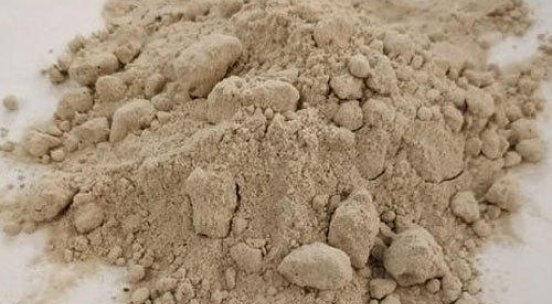
NEW PG2CRM PROJECT ARTICLE PUBLISHED: "CLOSING THE UPCOMING EU GYPSUM GAP WITH PHOSPHOGYPSUM"
EU Co-funded ERA-MIN Joint Transnational Call 2021 funded project PG2CRM team has already published the article "Closing the Upcoming EU Gypsum Gap with Phosphogypsum".
Phosphogypsum Processing to Critical Raw Materials (PG2CRM) is one of the 22 projects funded under
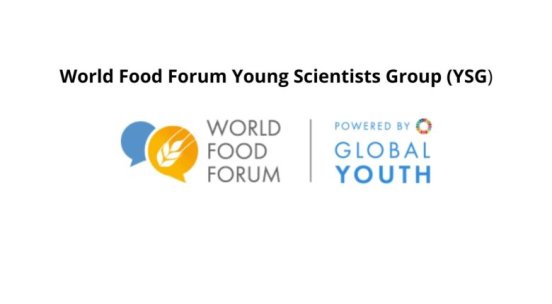
Assoc. Prof. Dr. Hynek Roubík and members of BRT among the Young Scientists Group Expert Reviewers and Selection Committee
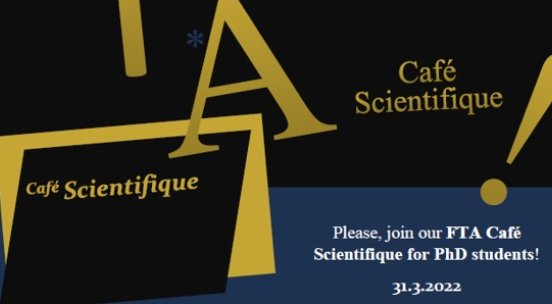
The 1st Café Scientifique at FTA for PhD students
On 31st of March (2022) the 1st Café Scientifique at FTA for PhD students was organized by Associate professor Hynek Roubík (Group leader of Biogas Research Team).
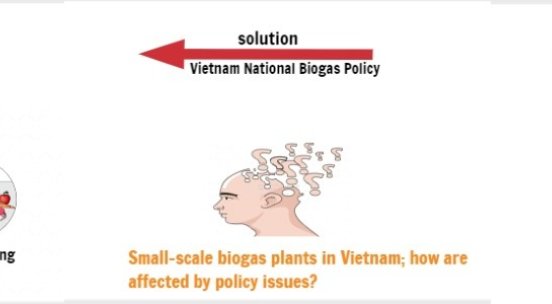
Small-Scale Biogas Plants in Vietnam: How are They Affected by Policy Issues?
Blog post by: Sheriff Noi. This blog post emerged as one of the five winners of the YPARD/AGRINATURA/AgriSciences Platform E-Competition: SHARE YOUR STORY! for the MSc and BSc Category. The competition which was tagged your Research your Story! aimed to help students have a better sense of ownership of their research and to communicate the most important parts of their research in a creative easy to read storytelling way.
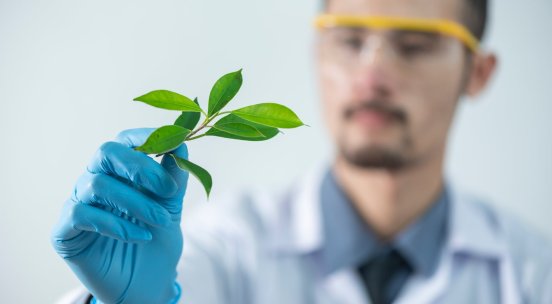
International Student Professional Creative Competition "Agrarian Sciences and Food"
The Competition is held in three areas: agronomy, technology of production and processing of livestock products, agroengineering. The Competition is held in two stages: the first (in home HEIs) - October 2021 - March 2022; the second (on the basis of MNAU) - April 2022 - June 2022.
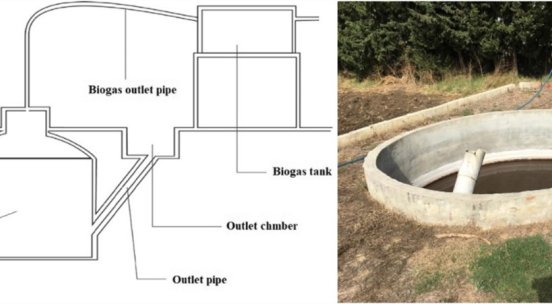
New paper published! Feasibility analysis of small-scale biogas plants usage in the Syrian coast through agricultural crop residues and co-digestion of manure
There are no other relevant studies on the topic of biogas from Syria available in the scientific literature. This is an unique research done in the country, where the Syrian civil war is an ongoing multi-sided civil conflict.
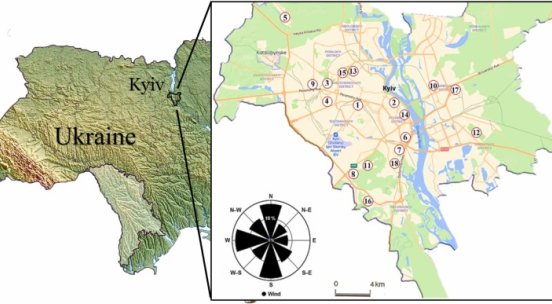
New paper published! Green infrastructure and relationship with urbanization – Importance and necessity of integrated governance
In this paper, an interdisciplinary approach to study the links between urbanization and the state of the green infrastructure of the metropolis was used, which indicates the possibility of providing ecosystem services.
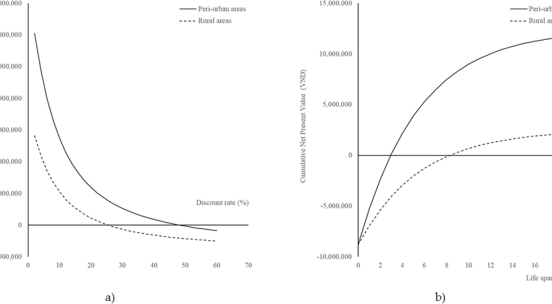
New paper published! Economics and perception of small-scale biogas plant benefits installed among peri-urban and rural areas in central Vietnam
This paper expands the knowledge on essential aspects of biogas implementation such as socio-economic impact, post-adaptation perception, and cultural habits related to traditional fuel use, focusing on differences in household economics and livelihood diversity at the peri-urban – rural continuum.
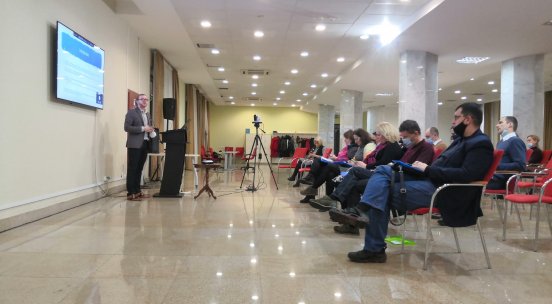
2nd Multidisciplinary Conference for Young Researchers (MCYR)
After a one-year break caused by the COVID-19 pandemic, the second Multidisciplinary Conference for Young Researchers was successfully organised on 29-30th of November 2021. This time in Sumy, Ukraine. And the theme of the conference was up-to-date: Sustainable Development Trends and Challenges under COVID-19.
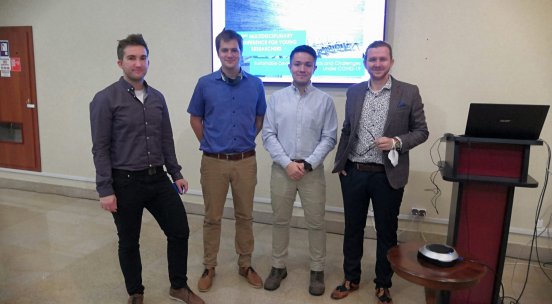
Visit of 4 universities in Ukraine and much more!
Our PhD students Marek Jelínek, Jan Staš and Eduardo Duque Dussán, along with Assoc. Prof. Hynek Roubík, travelled to Ukraine as delegates of the FTA under the scientific cooperation project "Strengthening scientific capacities and cooperation of Ukrainian universities in AgriSciences" supported by the Czech Development Cooperation via Ministry of Foreign Affairs of the Czech Republic.
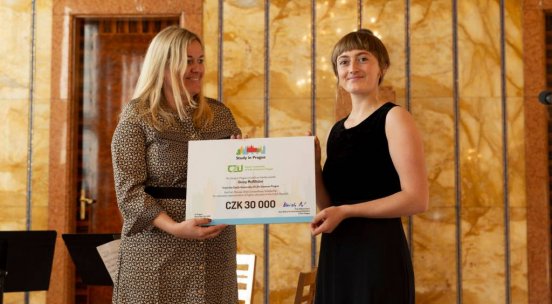
Bachelor student from Biogas Research Team awarded Professors´s Vlček scholarship
Ginny was elected because of her active involvement in research, education, and activities benefiting the foreign students contributing to the motivation of those interested in studying in Prague.
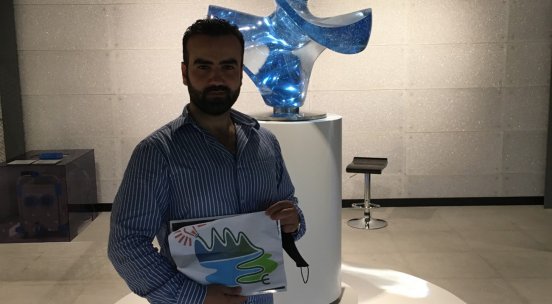
Biogas Research Team could not be missing at the Expo 2020 in Dubai
In October 2021 one of the members of Biogas Research Team – Ing. Ghaith Hasan visited Expo 2020 in Dubai. Here you can read his report.
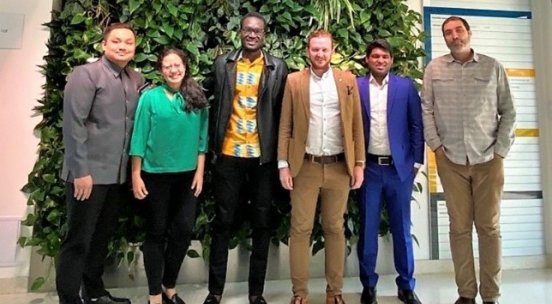
Congratulations to Ing. Jackline Phiona Mukisa, Ing. Sheriff Noi and Ing. Ana del Carmen Sanjur Garavito, who succesfully defended their thesis!
Jackline Phiona Mukisa was master student at the Biogas Research Team under the supervision of Associate Professor Hynek Roubík and co-supervision of Dr. Jana Mazancová with her research focused on “Biogas in Uganda and the SDGs: A comparative cross-sectional fuel analysis of wood and biogas on case of Iganga district”.
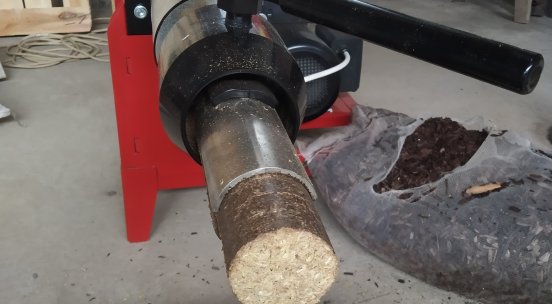
Turning wine waste into profit: possibilities of the Moldovan?wine industry
This project was aiming to assess the possibilities of local winemakers in terms of valorisation of their processing waste. Based on the preliminary data collection and interviews with stakeholders the briquetting technology has been assessed as the most appropriate technology for small-scale and medium-scale producers together with use of small-scale biogas plant.
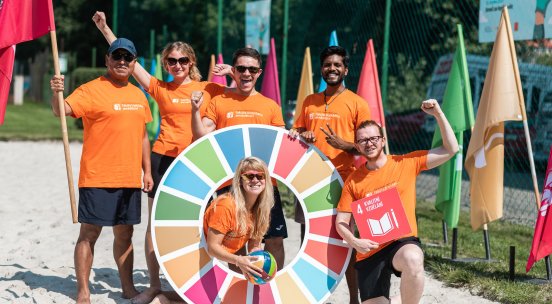
We fought for Sustainable Development Goals again!
Not even the pandemic could stop members of the volleyball team of the Faculty of Tropical Agriculture of the CZU in Prague from participating in a beach volleyball tournament in support of the Sustainable Development Goals.

Biogas Research Team photo competition: “The wonders of waste management”
Globally, more people make their living from waste management than from any other sector, apart from farming. Nevertheless, somehow this massive sector is quite underrated and still not receiving enough attention. So, let´s change it!
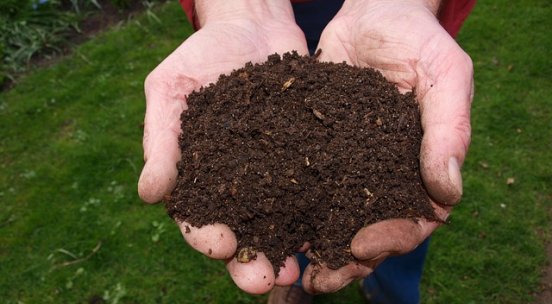
How to vermicompost?
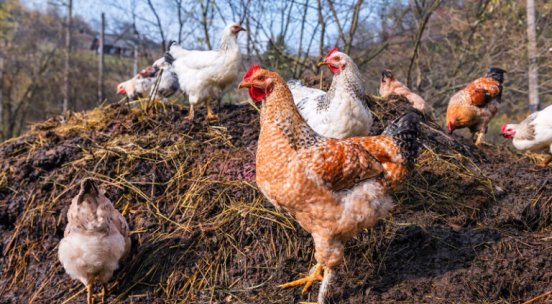
New paper published! Co-digestion of poultry litter with cellulose-containing substrates collected in the urban ecosystem
In this paper, we focused on the influence of fallen leaves from the urban ecosystem as a cellulose-containing additive in the process of anaerobic digestion of poultry litter.
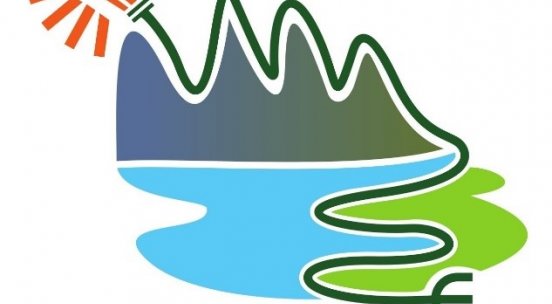
Congratulations to Ing. Haya Suleiman and Bc. Nikola Kadeřábková, who succesfully defended their thesis!
Haya was master student at the Biogas Research Team with her research focused on “Waste management pract\ices in Jordan (Al Ghoor region) and potential for implementation of biogas technology”.
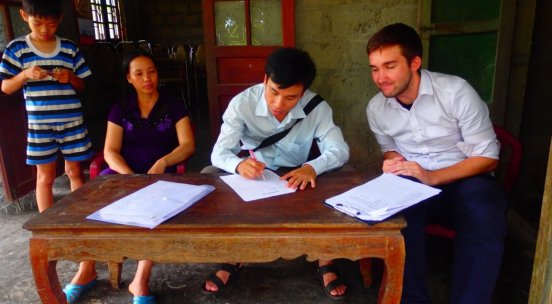
Congratulations to Marek Jelínek, Ricardo Situmeang and Chama Theodore Ketuama, who all passed their State Exam on 11.6.2021!
Phd students from Biogas Research Team Ing. Marek Jelínek, MA Ricardo Situmeang and Dipl.Ing. Chama Theodore Ketuama, MSc. all passed successfully their State Exams.
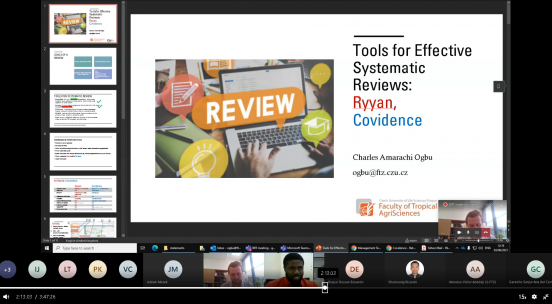
Invited lectures during our regular BRT meeting
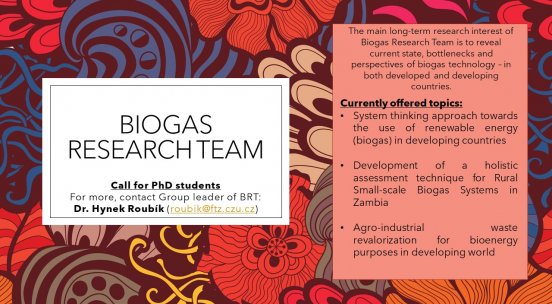
Call for PhD students!
For more information, please contact the Group leader of BRT Dr. Hynek Roubík (roubik@ftz.czu.cz)
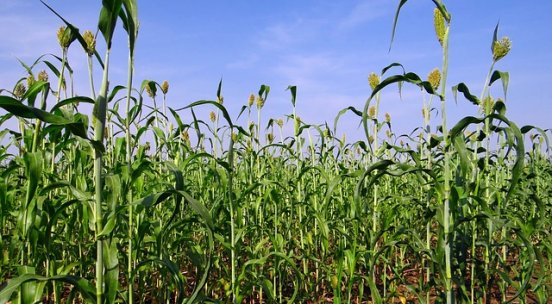
New paper published! Green mass to biogas in Ukraine—bioenergy potential of corn and sweet sorghum
In this paper, we focused on the quantification and evaluation of biogas production from either corn or sweet sorghum, as well as their combination
Biogas Research Team is ready to accept Marie Skłodowska-Curie Postdoctoral Fellowships (MSCA-PF)
Postdoctoral fellowships are open to researchers moving within Europe, as well as those coming in from other parts of the world. You can also restart a research career after a break, such as parental leave.
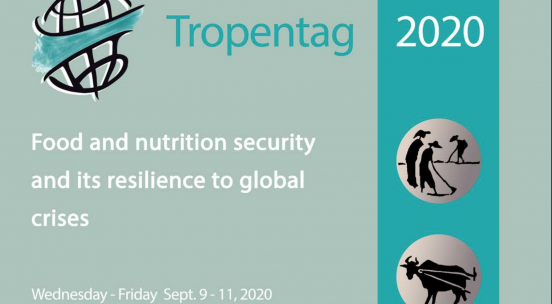
Tropentag Virtual Conference 2020 – 4 Contributions by the Members of Biogas Research Team
Our colleagues Ricardo Situmeang, Chama Ketuama, Ghaith Hassan and Marek Jelínek participated in the Tropentag 2020 conference which was organised during September 9 – 11, 2020. The topic of the year 2020 was Food and nutrition security and its resilience to global crises.
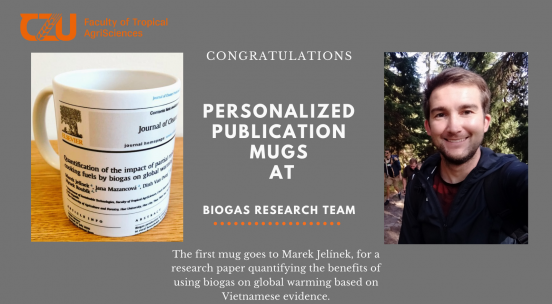
BRT team personalized publication mug
Personalized Publication Mugs for fellow academics: when pandemic does not allow us for getting together, in our #BiogasResearchTeam under the leadership of Dr. Hynek Roubík we came up with a new way of celebrating accomplishments in publication of scientific papers.
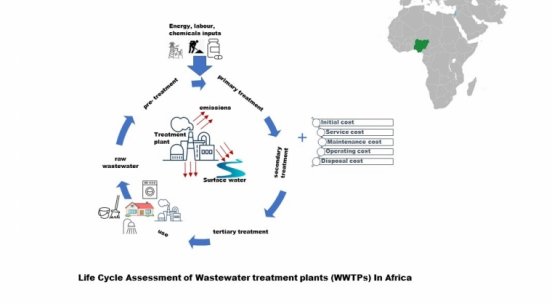
Treatment of Wastewater: A case of Robbing Peter to Pay Paul?
This blog post by Charles Amarachi Ogbu emerged as one of the five winners that participated in the YPARD and AGRINATURA e-competition for the PhD. Category. Read it here.
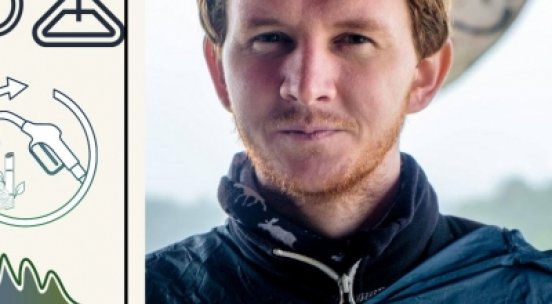
From the Czech Republic to Asia, Africa and beyond my agricultural story so far!
Hynek was born on January 26th, 1991, in the Prague Czech Republic. His passion for agriculture started at a very early age. As a child he would help his family in their home garden where they would grow vegetables, potatoes and other crops, this experience leads him to pursue a career in agriculture.
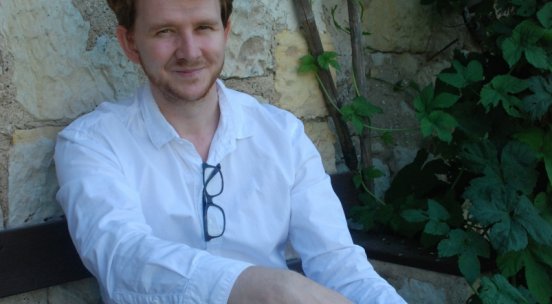
Get to know - Hynek Roubík, young expert and enthusiasts in agriculture
Hynek has been in touch with agriculture since his childhood, where he used to help with the home agricultural production of his family. He was always interested in different agricultural aspects and fields. After graduating from high school, Dr. Roubík started his studies at the Czech University of Life Sciences Prague (CZU). Firstly, he initiated his studies in the Faculty of Engineering, but his interests in sustainability and waste management led him to the Faculty of Tropical AgriSciences, where he finished his doctoral studies. Already during his bachelor research, he took a chance to participate as a team assistant of a developing project in Vietnam. And there he realized that this is the right direction to follow. Vietnam has not only become the country of his further research but has also become his home away from home.

